TS LAWCET 2023 5 Years Question Paper with Answer Key pdf is available for download. The exam was conducted by Osmania University, Hyderabad on behalf of TSCHE on May 25, 2023 in Shift 3. The question paper comprised a total of 120 questions.
TS LAWCET 2023 5 Years Question Paper with Answer Key PDF
| TS LAWCET 2023 5 Years LLB Question Paper with Answer Key | Check Solutions |

TS LAWCET 2023 5 Years LLB Questions with Solutions
Who Invented the 3-D printer?
View Solution
Chuck Hull is credited with inventing the 3D printer in 1983. He developed the technology known as stereolithography, which became the foundation for modern 3D printing.
Quick Tip: When learning about technological inventions, focus on the pioneers who introduced fundamental innovations that shaped the field.
Which Vitamin is responsible for blood clotting?
View Solution
Vitamin K plays a crucial role in blood clotting by facilitating the production of clotting factors. It is essential for proper wound healing and prevents excessive bleeding.
Quick Tip: When studying vitamins, focus on their specific roles in the body, such as Vitamin K's role in blood coagulation.
Who established the 'Brahmo Samaj reformist movement'?
View Solution
Raja Ram Mohan Roy was the founder of the Brahmo Samaj reformist movement, which aimed at reforming Hindu society by promoting monotheism, abolishing caste discrimination, and encouraging women's rights.
Quick Tip: When studying historical movements, focus on their leaders and the reforms they advocated for, such as Raja Ram Mohan Roy's work in the Brahmo Samaj.
India celebrates 'Civil Services Day' to commemorate the address of which leader to the Administrative Service Officers?
View Solution
Civil Services Day in India is celebrated on April 21st each year to commemorate the speech delivered by Sardar Vallabhbhai Patel, the first Home Minister of India, to the Administrative Service Officers in 1947.
Quick Tip: Focus on key dates and figures in India's history, such as the role of Sardar Vallabhbhai Patel in the development of civil services.
In which state, the Indus International School introduced the first Teaching Robot in India?
View Solution
Indus International School in Telangana introduced the first Teaching Robot in India. This initiative marks a significant step in integrating robotics and artificial intelligence in education.
Quick Tip: When learning about technological advancements in education, focus on the geographical regions and institutions leading such innovations.
Which State has the longest coastline in India?
View Solution
Gujarat has the longest coastline in India, extending over 1,600 kilometers. This coastline is significant for trade, tourism, and maritime activities.
Quick Tip: When studying geographical features of states, pay attention to coastlines, as they play a key role in trade and tourism.
Quit India Movement was started in the year ___\.
View Solution
The Quit India Movement, also known as the August Kranti, was launched in 1942 by Mahatma Gandhi to demand an end to British rule in India.
Quick Tip: When studying major Indian movements, focus on their key dates and the leaders associated with them, such as the Quit India Movement in 1942.
Where is Guindy National Park located?
View Solution
Guindy National Park is located in Chennai, Tamil Nadu. It is one of the smallest national parks in India and is located within the city limits of Chennai.
Quick Tip: When learning about protected areas in India, pay attention to their location and size, as they are often unique for biodiversity.
Which of the following rivers has Musi River as one of its tributaries?
View Solution
Musi River is a tributary of the Krishna River. It flows through the Indian states of Telangana and Andhra Pradesh, passing through Hyderabad.
Quick Tip: When studying rivers, focus on their tributaries and the geographical regions they pass through, as they are essential for understanding river systems.
Hirakud Dam is located in ____\ State.
View Solution
Hirakud Dam is located in Odisha, India. It is one of the longest earthen dams in the world and serves multiple purposes, including irrigation and power generation.
Quick Tip: When learning about dams, remember to focus on their geographical locations and their contributions to water management and energy production.
Who discovered bacteria?
View Solution
Antonie van Leeuwenhoek, a Dutch scientist, is credited with the discovery of bacteria using a microscope he designed himself in the 17th century.
Quick Tip: Focus on pioneering scientists in microbiology, such as Antonie van Leeuwenhoek, who made significant contributions to our understanding of microorganisms.
How many goals are there in the Sustainable Development Goals (SDGs) adopted by the UN?
View Solution
There are 17 Sustainable Development Goals (SDGs) adopted by the United Nations, which aim to address global challenges such as poverty, inequality, climate change, and peace.
Quick Tip: When studying the SDGs, focus on their global relevance and how they address environmental, social, and economic challenges.
Gibraltar straits connect which of the following?
View Solution
The Gibraltar Strait connects the Atlantic Ocean with the Mediterranean Sea, and it separates the southern tip of Spain and the northern tip of Morocco.
Quick Tip: When learning about geographical straits, remember their role in connecting major seas or oceans and their strategic importance for maritime trade.
Who was known as Martin Luther of India?
View Solution
Swami Dayanand Saraswati was known as the "Martin Luther of India" for his efforts to reform Hindu society, particularly through his advocacy for the Arya Samaj movement and his opposition to social practices like idol worship.
Quick Tip: When studying social reformers, look at their impact on both religious and social aspects of society, like Swami Dayanand's role in religious reform.
BHIM full form is _____ .
View Solution
BHIM stands for Bharat Interface for Money, a mobile app developed by the National Payments Corporation of India (NPCI) for facilitating fast and secure digital payments using the UPI platform.
Quick Tip: When learning about payment systems, focus on their purpose and how they enable digital transactions, like the role of BHIM in UPI-based payments.
Who among the following renounced his Knighthood following the Jallianwala Bagh massacre?
View Solution
Rabindranath Tagore renounced his knighthood in protest against the Jallianwala Bagh massacre of 1919, where British troops killed hundreds of unarmed Indians.
Quick Tip: When studying Indian independence movements, remember the important protests and acts of defiance, such as Rabindranath Tagore's renouncement of knighthood.
The Actor to win the first-ever film fare award in the category of best actor for the film Daag is
View Solution
Dilip Kumar was the first actor to win the Filmfare Award for Best Actor in 1954 for his performance in the film "Daag."
Quick Tip: When studying Bollywood history, focus on key milestones like the introduction of Filmfare Awards and the first recipients of various categories.
Daily a human being must consume less than _____ grams of salt.
View Solution
It is recommended that a human being must consume less than 5 grams of salt daily to reduce the risk of hypertension and cardiovascular diseases.
Quick Tip: Pay attention to health guidelines, especially related to nutrition, such as daily salt intake recommendations for better cardiovascular health.
What is the theme of 'World Environment Day 2022'?
View Solution
The theme for World Environment Day 2022 was "Only One Earth," emphasizing the need to protect the planet and adopt sustainable living practices.
Quick Tip: When studying environmental topics, pay attention to annual themes for global awareness events like World Environment Day.
Which day is celebrated as World Health Day?
View Solution
World Health Day is celebrated on 7th April every year to mark the anniversary of the founding of the World Health Organization (WHO) and to raise awareness about global health issues.
Quick Tip: When studying global health observances, focus on key dates like World Health Day, which promotes important health issues worldwide.
If the 2nd day of a month is Sunday, then what day will it be on the 31st of the same month?
View Solution
If the 2nd day of the month is Sunday, the 31st day will be a Monday. This is because the 31st day is 29 days after the 2nd, and 29 mod 7 equals 1, which means it will fall on the next Monday.
Quick Tip: When calculating days of the week, remember to use modular arithmetic to account for the number of days in a month.
In a certain code, MONKEY is written as XDJMNL. How is TIGER written in that code?
View Solution
The code shifts each letter of the word by a certain pattern. Using the same pattern applied to MONKEY, TIGER is coded as QDFHS.
Quick Tip: When working with coding puzzles, observe the shifts or patterns used in letter transformations.
If Z = 52 and ACT = 48, then BAT = ?
View Solution
The values are based on the sum of the positions of letters in the alphabet. For example, Z = 26, so 26 + 26 = 52. Similarly, the sum of the letters in ACT gives 48, and the same calculation applies to BAT to get 46.
Quick Tip: For letter-based puzzles, try assigning numerical values to letters and look for patterns in their sums or differences.
Grass : Erosion :: Dam : ?
View Solution
The relationship between Grass and Erosion is that grass prevents erosion. Similarly, a Dam controls water, making "Water" the correct answer.
Quick Tip: In analogy-based questions, identify the relationship between the first pair of words and apply the same relationship to the second pair.
A clock is set right at 05:00 A.M. The clock loses 16 minutes in 24 hours. What will be the true time when the clock indicates 10:00 P.M. on the fourth day?
View Solution
The clock loses 16 minutes every 24 hours, meaning it loses 64 minutes in 4 days (16 minutes x 4). Thus, when the clock shows 10:00 P.M., the true time will be 10:00 P.M. + 64 minutes, which is 02:00 P.M.
Quick Tip: For such problems, calculate the total time lost and then add it to the given time to determine the actual time.
A and B are married couple, A being the male member. D is the only son of C, who is the brother of A. E is the sister of D. B is the daughter-in-law of F, whose husband has died. How is E related to C?
View Solution
E is the sister of D, who is the son of C. Hence, E is C's daughter.
Quick Tip: In family relation problems, draw a family tree to visualize the relationships clearly.
A woman introduces a man as the son of the brother of her mother. How is the man related to the woman?
View Solution
The man is the son of the brother of the woman's mother, which makes him the woman's cousin.
Quick Tip: For family relationship questions, remember to break down the description and understand the connections between relatives.
Find the odd one out: Veranda, Cabin, Room, Chamber
View Solution
The odd one out is "Veranda" as it is an open space, while the others are enclosed spaces.
Quick Tip: In odd one out problems, look for characteristics that are different from the rest, such as enclosed vs. open spaces.
Your mother is 4 years younger than your father. Your father is 6 times older than you. If you are 6 years old, what is your mother's age?
View Solution
Let your age be \( x = 6 \) years. Your father's age is \( 6x = 36 \) years. Your mother is 4 years younger than your father, so her age is \( 36 - 4 = 32 \) years.
Quick Tip: In age-related problems, set up an equation using the given conditions and solve step by step.
Find the next letters in the given series: JAK, KBL, LCM, MDN, ?
View Solution
Each position in the letters follows a pattern. The first letter progresses by one step alphabetically, the second letter progresses by one step as well, and the third letter follows the same pattern. The next letters in the sequence are N, E, and O.
Quick Tip: Look for alphabetical patterns in series problems where letters follow a predictable stepwise progression.
The RBI has recently announced withdrawal of the Rs.2000 denomination banknotes from circulation, and allowed deposit or exchange of the Rs.2000 notes at Banks until
View Solution
The RBI announced the withdrawal of the Rs. 2000 denomination notes from circulation and allowed their deposit or exchange until 30th September, 2023.
Quick Tip: Stay updated with official announcements from RBI and other financial institutions for important updates related to currency notes and policies.
Which institution released the 'Landslide Atlas of India'?
View Solution
The 'Landslide Atlas of India' was released by the DRDO (Defence Research and Development Organisation) to help in understanding and mitigating landslide risks.
Quick Tip: When studying government reports or documents, note the key agencies responsible for specific research areas like DRDO for disaster management.
Sammanara, also known as the 'Hockey Village', is located in which State?
View Solution
Sammanara, known as the 'Hockey Village' for its contribution to the sport, is located in Odisha, which is renowned for producing many prominent hockey players.
Quick Tip: When studying sports-related topics, focus on areas known for producing athletes or contributing significantly to a particular sport.
Recently, due to non-payment of salaries nearly 100 pilots reported sick in which airlines?
View Solution
Alliance Air faced the issue where nearly 100 pilots reported sick due to non-payment of their salaries. This led to severe operational disruptions in the airline.
Quick Tip: When studying current events in the airline industry, pay attention to labor-related issues such as salary disputes or worker strikes.
‘Safe Harbour Principle’ is associated with which Act?
View Solution
The Safe Harbour Principle is associated with the Information Technology Act, 2000, which provides guidelines to internet service providers and websites to avoid liability for third-party content under certain conditions.
Quick Tip: When studying legal principles, focus on their application in modern technology law, such as the Safe Harbour Principle in the IT Act.
T-Hub (Technology Hub) is an innovation intermediary and business incubator based in which State?
View Solution
T-Hub, which stands for Technology Hub, is based in Telangana and is known for promoting innovation and entrepreneurship by providing support to startups and businesses.
Quick Tip: When studying innovation hubs, note their role in fostering startups and entrepreneurship, such as T-Hub in Telangana.
Which institution introduced the 'Global Greenhouse Gas Monitoring Infrastructure'?
View Solution
The World Meteorological Organization (WMO) introduced the 'Global Greenhouse Gas Monitoring Infrastructure' to track and analyze global emissions and contribute to climate change mitigation.
Quick Tip: For climate-related studies, focus on the role of global organizations like WMO that work towards monitoring and addressing environmental challenges.
Who became the first Tennis player to win 80 matches in all 4 Grand Slams?
View Solution
Novak Djokovic became the first tennis player to win 80 matches in all 4 Grand Slams, marking a historic milestone in his career.
Quick Tip: When learning about records in sports, focus on milestone achievements that highlight players' dominance across various tournaments.
Shri C R Rao, a well-known Indian and American mathematician and statistician, was awarded the International Prize in Statistics which is equal to Nobel Prize. He is at present _____ years old?
View Solution
Shri C R Rao, a distinguished mathematician, is currently 99 years old, and he received the International Prize in Statistics, which is regarded as equivalent to the Nobel Prize.
Quick Tip: When studying historical figures in science, focus on their key achievements and contributions, as well as their current age if relevant.
Which institution launched its Right to Information (RTI) online portal?
View Solution
The Election Commission of India launched its RTI online portal to promote transparency and allow citizens to easily access information related to elections and related processes.
Quick Tip: RTI portals are important for increasing transparency in government organizations. Always check the official portal for accurate and up-to-date information.
Which organization released the 'Women, Business and the Law Index'?
View Solution
The 'Women, Business and the Law Index' was released by the World Bank to track the legal and regulatory barriers that hinder women's economic participation around the world.
Quick Tip: When learning about global indices, pay attention to organizations like the World Bank, which provide valuable insights into gender equality and economic participation.
Which city corporation launched the World Bank’s Flagship Gender Toolkit?
View Solution
The Chennai city corporation launched the World Bank’s Flagship Gender Toolkit aimed at empowering women through better infrastructure and policies focused on gender inclusivity.
Quick Tip: Focus on cities that lead in gender-inclusive initiatives and partnerships with global organizations like the World Bank.
Which Union Ministry is set to host the 'World Food India 2023' event?
View Solution
The Ministry of Food Processing Industries will host the 'World Food India 2023' event, aiming to promote food processing and attract investments in the food processing sector.
Quick Tip: When studying major international events, focus on the organizing institutions and their roles in promoting industries or sectors.
Who laid the foundation stone for the National Forensic Sciences University?
View Solution
Shri Amit Shah, the Home Minister of India, laid the foundation stone for the National Forensic Sciences University, which aims to provide specialized education and research in forensic sciences.
Quick Tip: When studying developments in the education sector, note the involvement of key leaders and the areas of study being promoted, such as forensic sciences in this case.
Which company has initiated 'Project ELLORA' to promote local languages in India's Digital world?
View Solution
Microsoft initiated 'Project ELLORA' to promote local languages in India's digital ecosystem, ensuring more accessibility to digital content in regional languages.
Quick Tip: When studying technological projects, focus on their goals of inclusivity and digital accessibility, like Project ELLORA in promoting local languages.
In which city did Prime Minister Shri Narendra Modi inaugurate the Arabic Academy?
View Solution
Prime Minister Shri Narendra Modi inaugurated the Arabic Academy in Mumbai, aiming to promote the Arabic language and culture in India.
Quick Tip: When studying major government events, pay attention to the location and its significance in promoting culture and language.
Which country’s first underground Air Force Base is Eagle 44 (Oghlab 44)?
View Solution
Iran's Eagle 44 (Oghlab 44) is the first underground Air Force Base, designed to protect its military assets from attacks.
Quick Tip: When studying military innovations, note the significance of underground bases for protection against airstrikes and modern warfare tactics.
Which country has launched pilot project called 'Welcome Corps' for refugees?
View Solution
The United States of America launched the 'Welcome Corps' pilot project to provide support and integration services to refugees.
Quick Tip: When studying refugee-related initiatives, focus on countries that actively implement projects to help with resettlement and integration.
Which of the following became the first Indian Union Territories to completely shift to e-governance mode?
View Solution
Jammu & Kashmir became the first Union Territory in India to fully adopt e-governance, providing online government services to its residents.
Quick Tip: When learning about digital governance, focus on regions that lead in the adoption of e-governance to make government services more accessible.
US Food and Drug Administration (FDA) has approved 'Lecanemab' medication to treat which disease?
View Solution
The FDA approved 'Lecanemab', a drug aimed at treating Alzheimer's disease, to help manage symptoms and slow the progression of the disease.
Quick Tip: For health-related approvals, focus on new medications that target chronic diseases like Alzheimer's, which have global implications for aging populations.
Which country launched the domestic card scheme AfriGo to boost its cashless economy?
View Solution
Nigeria launched the AfriGo domestic card scheme to boost its cashless economy, aiming to increase financial inclusion and streamline transactions.
Quick Tip: When studying financial innovations, focus on how countries implement schemes to increase digital payments and reduce cash dependency.
Which State Government has passed the Bill providing 30% horizontal reservation to domiciled women of the State?
View Solution
The Telangana State Government has passed the Bill providing 30% horizontal reservation to domiciled women of the state, ensuring greater representation for women in various public services.
Quick Tip: When studying state-level policies, focus on specific initiatives aimed at empowering women, such as horizontal reservations in various sectors.
National Cadet Corps (NCC) signed MoU with which institution to tackle the issue of plastic pollution?
View Solution
The National Cadet Corps (NCC) signed a Memorandum of Understanding (MoU) with the United Nations Environment Programme (UNEP) to tackle plastic pollution and promote environmental awareness.
Quick Tip: Focus on international collaborations in environmental conservation, as organizations like UNEP often partner with local entities to address global challenges.
As per Central Pollution Control Board (CPCB) data, which city was the most polluted place in India in 2022?
View Solution
According to the CPCB data, Kanpur was identified as the most polluted city in India in 2022, primarily due to industrial activities and vehicular emissions.
Quick Tip: When studying pollution data, focus on industrial and urban factors that contribute to high pollution levels in major cities.
Which of the following teams has won Women’s Premier League (WPL) 2023 final?
View Solution
Mumbai Indians won the Women’s Premier League (WPL) 2023 final, making history in women’s cricket by winning the inaugural edition of the league.
Quick Tip: When studying cricket leagues, note the teams that have made significant achievements in their inaugural seasons.
Which country signed a deal with India to relocate dozens of Cheetahs?
View Solution
South Africa signed a deal with India to relocate dozens of Cheetahs to India, aiming to restore the cheetah population and promote wildlife conservation efforts.
Quick Tip: When studying international wildlife conservation efforts, focus on agreements between countries for species relocation and conservation initiatives.
Which country’s population has dropped by 8,50,000, declining for the first time since the Great Famine of 1961?
View Solution
China's population has dropped by 8,50,000, marking the first decline since the Great Famine of 1961. This decline is attributed to various factors such as demographic shifts and the effects of the one-child policy.
Quick Tip: When studying demographic trends, focus on countries with aging populations or significant shifts due to government policies.
Which institution declares ‘Domestic Systemically Important Banks (D-SIBs)’ in India?
View Solution
The Reserve Bank of India (RBI) declares Domestic Systemically Important Banks (D-SIBs) in India, identifying banks whose failure could potentially harm the stability of the financial system.
Quick Tip: When studying financial systems, focus on the role of central banks like RBI in ensuring the stability of the economy by monitoring systemically important institutions.
The World Economic Forum (WEF) has chosen which city for establishing its Centre for the Fourth Industrial Revolution?
View Solution
Hyderabad has been chosen by the World Economic Forum (WEF) to establish its Centre for the Fourth Industrial Revolution, aiming to drive innovation in various industries.
Quick Tip: When studying international developments in technology, note cities that serve as hubs for industrial revolutions and global innovations.
Which District in India has become the country’s first Constitution literate district?
View Solution
Thrissur became the first Constitution literate district in India, aiming to promote constitutional awareness among its residents.
Quick Tip: When studying district-level initiatives, focus on those that promote constitutional literacy and civic education.
Constitutional Amendment discontinued the nomination of two Anglo-Indian members to Lok Sabha.
View Solution
The 104th Constitutional Amendment Bill was passed, which discontinued the nomination of Anglo-Indian members to the Lok Sabha. This change was made to reflect the evolving social structure.
Quick Tip: When studying Constitutional amendments, focus on the key amendments that have significantly impacted the structure of Indian governance.
Which of the following High Courts exercises jurisdiction over the Union territory of Andaman and Nicobar Islands?
View Solution
The Orissa High Court exercises jurisdiction over the Union Territory of Andaman and Nicobar Islands. This arrangement ensures legal and judicial functions are conducted under the jurisdiction of a designated High Court.
Quick Tip: When studying jurisdiction, note that certain Union Territories fall under specific High Courts for legal matters.
Absolute liability means ____\ .
View Solution
Absolute liability refers to a legal principle where a person or entity can be held responsible for their actions even if there is no fault on their part. This principle is applied in certain types of law, particularly in strict liability cases.
Quick Tip: When studying legal concepts, focus on the distinction between absolute and strict liability, as both have significant implications in legal cases.
NALSA vs. Union of India 2014, case is related to ____\.
View Solution
The NALSA vs. Union of India 2014 case is related to the recognition of transgenders as the third gender in India. The judgment directed the government to grant legal recognition to transgender people and ensure their rights are protected.
Quick Tip: Focus on landmark cases like NALSA vs. Union of India for significant changes in law, particularly for marginalized communities.
Who was the First Woman Judge of the Supreme Court of India?
View Solution
Justice M. Fathima Beevi was the first woman judge of the Supreme Court of India. She was appointed in 1989 and made history as the first woman to hold such a position in India’s judicial system.
Quick Tip: When studying significant judicial appointments, pay attention to the historical firsts and the impact they had on the legal system.
Which Article of the Indian Constitution deals with the Right to Protection against Arrest and Detention in certain cases?
View Solution
Article 22 of the Indian Constitution deals with the protection of rights related to arrest and detention in certain cases. It guarantees protection against arbitrary arrest and detention, while providing exceptions in certain situations.
Quick Tip: Familiarize yourself with the fundamental rights and their corresponding articles to better understand the legal protections provided under the Indian Constitution.
In Cognizable offences _______
View Solution
In cognizable offences, a police officer may arrest without a warrant if the offence is of a serious nature. This allows them to take immediate action to prevent further harm or ensure the accused is available for trial. Arrest without warrant is not applicable for all types of offences, especially non-cognizable ones.
Quick Tip: In cases of cognizable offences, familiarize yourself with the rights of the police regarding arrest without a warrant. This can be critical in urgent legal situations.
‘In camera proceedings’ in a court refers to _______
View Solution
In camera proceedings refer to legal proceedings held in private, usually to protect sensitive information, victims, or to avoid public disturbance. In such cases, the public and press are excluded from the courtroom.
Quick Tip: Always remember that 'in camera' proceedings are typically confidential and may involve sensitive or private matters.
Extradition means _______
View Solution
Extradition refers to the formal process by which one country hands over an accused or convicted person to another country, usually based on a mutual agreement or treaty between the two countries.
Quick Tip: When studying extradition, remember that it involves international agreements to ensure criminals are brought to justice in the appropriate country.
A writ by court, to a person or body of persons to compel it to perform some public duty is _______
View Solution
A writ of Mandamus is a court order directing a public official or a body to perform a public duty which they have failed to do. It is a way to ensure accountability in the public sector.
Quick Tip: Mandamus is often used to compel public officials or bodies to carry out duties that are legally required, ensuring that laws are enforced.
‘In lieu’ means _______
View Solution
The phrase "in lieu" means "in place of," often used when referring to a substitution or replacement. It is commonly used in legal or contractual language.
Quick Tip: Remember that 'in lieu' is commonly used in legal and formal documents, indicating a substitution for something else.
Who can file an election petition in India?
View Solution
Under Indian law, both electors and candidates have the right to file an election petition if they believe malpractice occurred during the election process. The petition can challenge the validity of the election.
Quick Tip: Election petitions can be filed not only by candidates but also by any elector who believes that there was malpractice in the election.
Entry to a person’s land or property without permission is called _______
View Solution
Trespass refers to the unlawful entry onto someone else's property without permission. It is a civil wrong and, in some cases, can lead to criminal charges.
Quick Tip: When studying property law, understand that trespass involves entering someone’s property without consent, even if no damage is caused.
Who is the ex-officio Chairman of the Rajya Sabha? _______
View Solution
The ex-officio Chairman of the Rajya Sabha (Council of States) is the Vice President of India, as per the Constitution of India.
Quick Tip: The Vice President of India also plays a crucial role in the legislative processes of the Rajya Sabha, including maintaining decorum.
Donoghue vs. Stevenson case relates to _______
View Solution
The Donoghue vs. Stevenson case is a landmark decision in the law of torts that established the principle of negligence. It is famous for the "neighbour principle" that a person owes a duty of care to those who are closely and directly affected by their actions.
Quick Tip: The Donoghue vs. Stevenson case is essential for understanding the concept of negligence and its role in tort law.
The Governor General who is known as ‘The Liberator of The Press’ is _______
View Solution
Charles Metcalfe, who served as the Governor General of India, earned the title ‘The Liberator of The Press’ for his role in lifting the restrictive press laws imposed by the British.
Quick Tip: Remember that Charles Metcalfe is often associated with liberalizing policies for the press in colonial India.
Who among the following is the author of the book "Off the Bench"?
View Solution
Justice J. S. Verma, a former Chief Justice of India, is the author of the book "Off the Bench," which shares his experiences and reflections on legal matters.
Quick Tip: When studying books by legal experts, focus on the experiences and perspectives they provide on the judicial system.
Who is the custodian of the Constitution of India?
View Solution
The Supreme Court of India is the custodian of the Constitution. It is responsible for interpreting the Constitution and ensuring its protection through judicial review.
Quick Tip: Understanding the role of the Supreme Court in safeguarding the Constitution is crucial for constitutional law studies.
Which of the following is not a fundamental duty of the citizen of India?
View Solution
Fundamental duties are listed in the Constitution under Article 51A. While duties such as protecting the environment and safeguarding public property are fundamental, paying income tax is a legal obligation, not a fundamental duty.
Quick Tip: Focus on understanding the distinction between legal obligations and fundamental duties in the Constitution.
Who among the following presided over the first meeting of the Constituent Assembly?
View Solution
Dr. Rajendra Prasad, the first President of India, presided over the first meeting of the Constituent Assembly in 1947.
Quick Tip: The role of the President of India in the Constituent Assembly was pivotal in shaping the Constitution.
The oldest High Court in India is _______
View Solution
The Calcutta High Court is the oldest High Court in India, established in 1862. It has played a significant role in the judicial history of India.
Quick Tip: The Calcutta High Court is a landmark institution in India's judicial system and has contributed to shaping the nation's legal landscape.
The ‘Electoral College’ for the election of the President of India consists of _______
View Solution
The Electoral College for the election of the President of India consists of elected members of the Lok Sabha, Rajya Sabha, and the Legislative Assemblies of all the States and Union Territories.
Quick Tip: Remember that the President of India is elected by an indirect election method involving elected representatives from various legislative bodies.
The Estimates Committee of the Indian Parliament comprises of _______ members.
View Solution
The Estimates Committee of the Indian Parliament consists of 20 members. It is primarily responsible for examining and evaluating the expenditure of government departments.
Quick Tip: The Estimates Committee plays a key role in ensuring that government funds are used appropriately and within budget.
The boundary line between India and China is known as _______
View Solution
The boundary line between India and China is known as the Mc Mohan Line. This line was drawn during the Simla Accord of 1914.
Quick Tip: Understanding historical agreements like the Mc Mohan Line is crucial in analyzing border disputes in international relations.
Arun instigates Balu to murder Kumar. Balu refuses to do so. Arun is guilty of _______
View Solution
In this case, Arun is guilty of abetment. He instigated Balu to commit murder, but since Balu did not act, Arun is guilty of abetment, not murder.
Quick Tip: Abetment refers to the act of encouraging or instigating another person to commit a crime, even if the crime is not carried out.
Minimum age required to contest for office of the President is _______
View Solution
As per the Constitution of India, the minimum age required to contest for the office of the President of India is 35 years.
Quick Tip: In addition to age, a candidate must also fulfill other eligibility criteria such as being an Indian citizen and qualified to be elected as a member of the Lok Sabha.
In case of vacancy of office of both the President and Vice President of India, who shall act as the President of India?
View Solution
In case of a vacancy in both the offices of President and Vice President, the Chief Justice of India is appointed to act as the President of India, as per the provisions of the Constitution.
Quick Tip: Remember that the Chief Justice of India steps in temporarily during such situations, until the election of a new President.
Double jeopardy means _______
View Solution
Double jeopardy is a legal concept that protects an individual from being tried or punished twice for the same offence. It is a fundamental principle of law that ensures fairness in criminal proceedings.
Quick Tip: In criminal law, double jeopardy safeguards individuals from being repeatedly prosecuted for the same crime.
Who was the First Chief Information Commissioner of India?
View Solution
Wajahat Habibullah was appointed as the first Chief Information Commissioner (CIC) of India in 2005, following the establishment of the Right to Information Act.
Quick Tip: Remember that the Chief Information Commissioner plays a vital role in ensuring transparency and accountability in government functioning.
De novo means _______
View Solution
"De novo" is a Latin term meaning "new." In legal terms, it refers to a trial or process that is started anew, without considering previous decisions or actions.
Quick Tip: The term "de novo" is frequently used in legal contexts, especially when a case is heard again from the beginning.
Which of the following bodies is not set up under the Constitution of India?
View Solution
The National Human Rights Commission is not set up under the Constitution of India. It was established by an act of Parliament in 1993. The other bodies are specifically mentioned in the Constitution.
Quick Tip: Understanding the constitutional bodies is key to understanding the framework of governance in India.
What is the maximum duration of a Money Bill in the Rajya Sabha?
View Solution
The maximum duration allowed for a Money Bill in the Rajya Sabha is 14 days. If no decision is made within this time, the bill is deemed passed.
Quick Tip: For Money Bills, the Rajya Sabha cannot reject the bill, but it can delay the passage for a maximum of 14 days.
Who for the first time put forward the idea of Constituent Assembly for India in 1934?
View Solution
M N Roy was the first to put forward the idea of a Constituent Assembly for India in 1934, which later played a significant role in framing India's Constitution.
Quick Tip: Remember that M N Roy is known for his contributions to the Indian freedom struggle and his advocacy for a Constituent Assembly.
Which Commission was appointed to investigate the circumstances that warranted the declaration of an Emergency in 1975?
View Solution
The Shah Commission was appointed to investigate the reasons for the Emergency declared in 1975. The Commission's report looked into the events and the abuse of power during the period.
Quick Tip: The Shah Commission's findings are important in understanding the political climate during the Emergency in India.
A person who is not a member of Parliament can be appointed as a Minister by the President for a period of _______
View Solution
A person who is not a member of Parliament can be appointed as a Minister by the President, but they must become a member of Parliament within 6 months.
Quick Tip: If someone is appointed as a Minister and is not a member of Parliament, they must win a seat in the next election within 6 months.
Fundamental Rights have been taken from _______ Constitution.
View Solution
Fundamental Rights in the Indian Constitution have been largely inspired by the American Constitution, particularly the Bill of Rights, which guarantees certain fundamental freedoms.
Quick Tip: The concept of Fundamental Rights in India is modeled after the American system, which has had a significant influence on modern democracies.
The 44th Amendment Act of 1978 to the Constitution of India _______
View Solution
The 44th Amendment Act of 1978 abolished the Fundamental Right to acquire, hold, and dispose of property, which had been previously enshrined in the Constitution.
Quick Tip: The 44th Amendment was a significant reform, altering property rights in India and reshaping the Fundamental Rights.
Who appoints the Attorney General of India?
View Solution
The Attorney General of India is appointed by the President of India, as per the Constitution. The Attorney General is the chief legal advisor to the government of India.
Quick Tip: The Attorney General of India plays a crucial role in representing the Indian government in legal matters.
Which of the following is entrusted with a statutory duty of laying down the standards of professional conduct and etiquette for advocates in India?
View Solution
The Bar Council of India is entrusted with the statutory duty of laying down the standards of professional conduct and etiquette for advocates in India. It regulates the practice and conduct of lawyers in India.
Quick Tip: Understanding the role of the Bar Council is important for those pursuing legal careers in India.
A person dying intestate means _______
View Solution
A person dying intestate means they have passed away without leaving behind a will, which would typically determine the distribution of their property among heirs.
Quick Tip: Intestate succession refers to the distribution of a deceased person's estate when no will is present, governed by legal statutes.
Debenture holders of a company are the company's _______
View Solution
Debenture holders are considered creditors of the company, as they lend money to the company in exchange for interest. They have a claim on the company's assets.
Quick Tip: Debenture holders are distinct from shareholders because they do not own the company but have a fixed interest claim.
“Apostasy” means _______
View Solution
Apostasy refers to the abandonment or renunciation of one's religion or faith. It is often used in legal and religious contexts.
Quick Tip: When studying religious or cultural concepts, understand how terms like apostasy can have different meanings in different contexts.
A prerogative writ used to command a person or a public authority who is detaining another in custody to produce that person before the court is _______
View Solution
Habeas Corpus is a writ that commands the person detaining another to bring the detainee before the court to determine if the detention is lawful. It is a fundamental safeguard against unlawful detention.
Quick Tip: Habeas Corpus is one of the most important legal rights, ensuring the protection of personal liberty.
By which Constitutional Amendment was the voting age reduced from 21 to 18 years?
View Solution
The 61st Amendment Act of 1988 reduced the minimum age for voting from 21 years to 18 years. This significant change aimed to expand the democratic base and encourage youth participation in elections.
Quick Tip: Remember that the 61st Amendment Act was a key reform that made elections more inclusive.
United Nations Conference on Trade and Development (UNCTAD) is headquartered at _______
View Solution
The United Nations Conference on Trade and Development (UNCTAD) is headquartered in Geneva, Switzerland. It focuses on the promotion of international trade and development.
Quick Tip: UNCTAD plays a vital role in fostering development by enhancing global trade and cooperation.
Which High Court exercises jurisdiction over Lakshadweep?
View Solution
The Kerala High Court exercises jurisdiction over the Union Territory of Lakshadweep, which is geographically located in the Arabian Sea.
Quick Tip: Jurisdiction of High Courts in India is defined by geography, with each High Court handling cases from specific states and territories.
CEDAW is the acronym of _______
View Solution
CEDAW stands for the Convention on the Elimination of All Forms of Discrimination against Women. It is an international treaty aimed at eliminating discrimination against women in all areas of life.
Quick Tip: CEDAW is a fundamental treaty that supports women's rights globally and was adopted by the United Nations.
Whoever commits or conspires to commit cyber terrorism shall be punishable with imprisonment which may extend to _______ under the Information Technology Act, 2000.
View Solution
Under the Information Technology Act, 2000, cyber terrorism is a serious crime, and the punishment for it can extend to life imprisonment.
Quick Tip: Cyber terrorism is a critical threat, and the law imposes severe penalties to deter such activities.
The High Courts in India do not possess _______
View Solution
The High Courts in India do not possess revisory jurisdiction, which is the power to review or revise judgments of lower courts. However, they have original, appellate, and advisory jurisdictions.
Quick Tip: Revisory jurisdiction is not conferred on High Courts, but it is a function performed by appellate courts in certain circumstances.
What is the name of the first Chief Justice of India?
View Solution
The first Chief Justice of India was Harilal Jekisundas Kania. He served as the Chief Justice from 1950 to 1951.
Quick Tip: The role of the Chief Justice of India is critical in the judiciary, and it’s important to know the first person to hold this position.
What are the rights enshrined in Article 14 of the Indian Constitution?
View Solution
Article 14 of the Indian Constitution guarantees the right to equality, which ensures that every individual is treated equally before the law and has equal protection under the law.
Quick Tip: Article 14 is a fundamental provision for safeguarding individual rights and promoting justice in India.
Who is entitled to the right to equality under the Indian Constitution?
View Solution
The right to equality under the Indian Constitution is available to all citizens, ensuring that everyone is treated equally by the law. Non-citizens are not entitled to this right.
Quick Tip: The right to equality applies to all citizens and is essential for fostering a just and equal society.
What is the basis of the Indian legal system?
View Solution
The Indian legal system is based on common law principles, which were inherited from the British colonial period and have evolved over time.
Quick Tip: The foundation of India's legal system is rooted in the principles of common law, which prioritize judicial precedents and case law.
What is the function of the Supreme Court of India?
View Solution
The Supreme Court of India has the authority to interpret the Constitution and make binding judgments on legal matters. It is the highest court in the country.
Quick Tip: The Supreme Court plays a crucial role in upholding constitutional principles and ensuring the rule of law in India.
Indian Judiciary is _______
View Solution
The Indian Judiciary is independent and impartial, ensuring that justice is delivered without any external influence, as mandated by the Constitution.
Quick Tip: An independent judiciary is essential to the democratic framework of India, ensuring checks and balances in governance.
As per the above passage, which is the best antonym for skeptical?
View Solution
The passage contrasts the skeptical view against those who trust in the value of helmet laws. Hence, the antonym of skeptical would be trustful or trustworthy.
Quick Tip: When reading critically, identify words that suggest doubt or belief, as these can often be opposites.
The main purpose of the passage is to _______
View Solution
The passage addresses the logical flaws in the arguments against helmet laws, particularly focusing on the fallacies about personal freedom and rider education.
Quick Tip: Identifying the main purpose of a passage helps in understanding the author’s intention and the key points discussed.
The tone of the author can best be described as _______.
View Solution
The tone described in the question refers to the author's attitude or manner of expression. The word "firm" implies a strong, determined tone, which is most appropriate for the context given. The other options such as "fiery," "rigid," and "coercive" imply extremes that are not suitable for the author's tone in this case.
Quick Tip: When analyzing tone, consider the connotations of the words and whether they align with the author's attitude in the text.
According to the opinion of author some accidents are _______.
View Solution
The author seems to imply that some accidents are inevitable or unavoidable, which is why the option "unavoidable" fits best in this context. The other options, such as "avoidable" or "acceptable," do not align with the author's perspective as implied by the context.
Quick Tip: When evaluating the author’s tone or perspective, pay close attention to how they frame issues such as preventability and responsibility.
Which of the following statements can be described as one of the author's unstated assumptions?
View Solution
The author assumes that individuals should be held accountable for the costs associated with their own injuries if they have some responsibility for them. This aligns with option (4). The other options focus more on safety or responsibility in general, which are not directly linked to the concept of medical costs for personal injuries.
Quick Tip: To identify unstated assumptions, think about what the author implicitly expects the reader to agree with based on their argument.



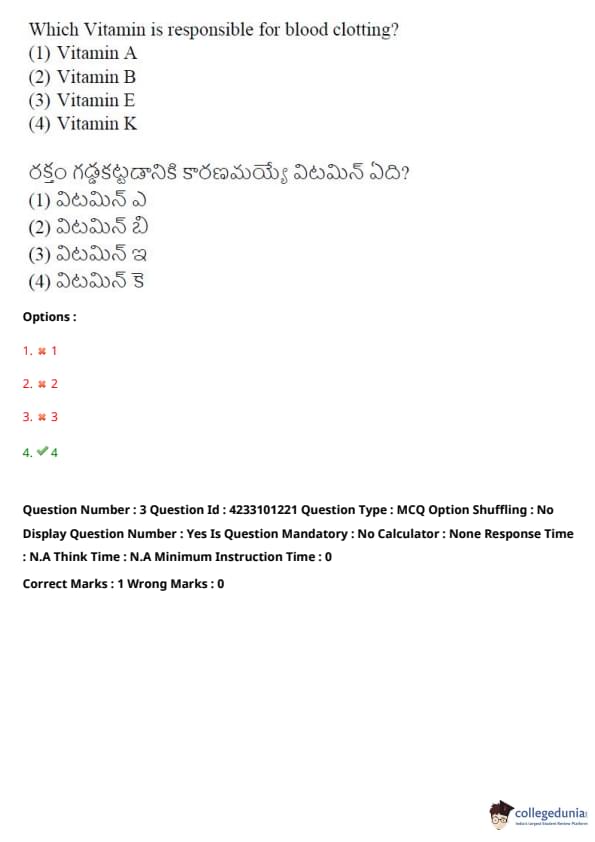

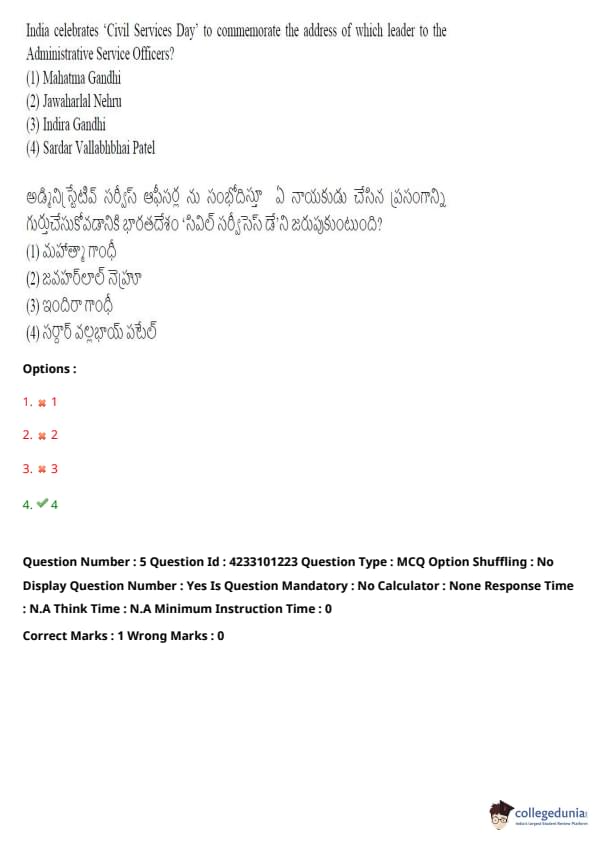
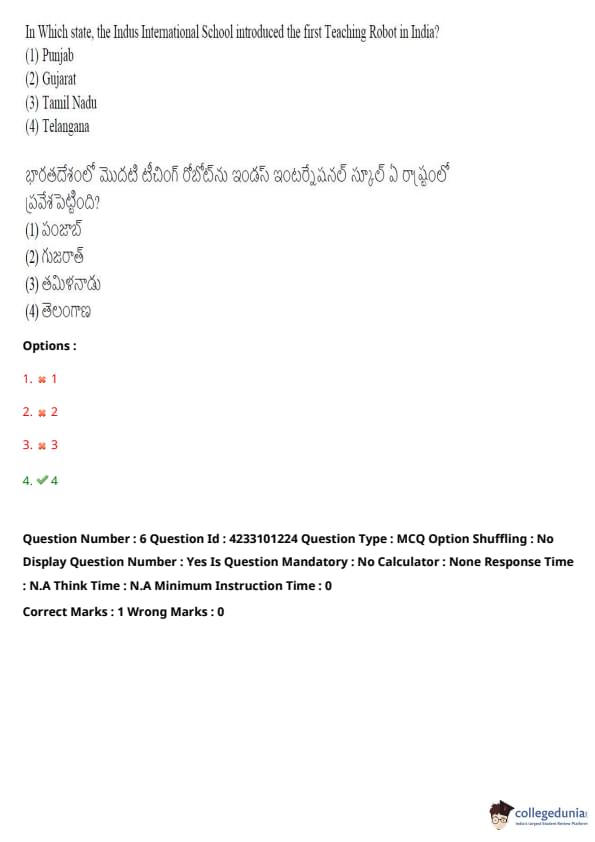
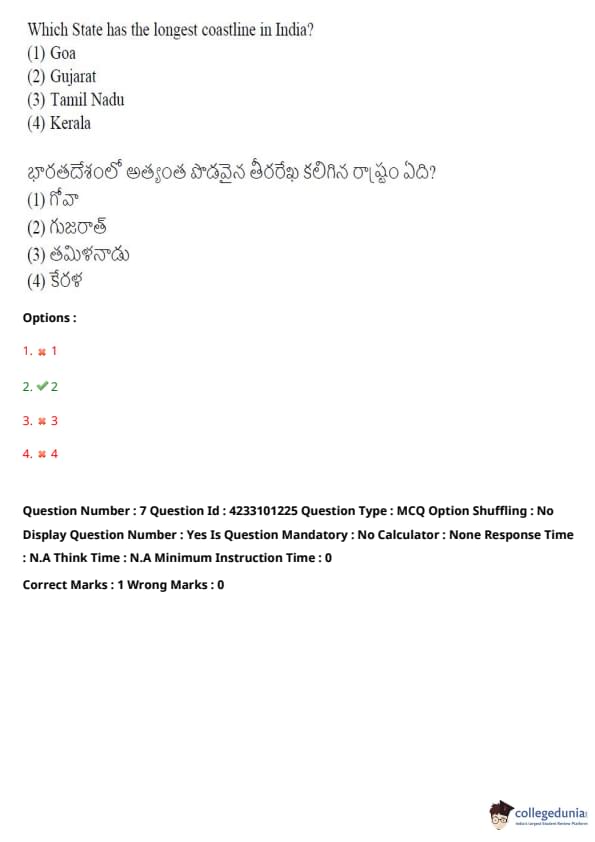
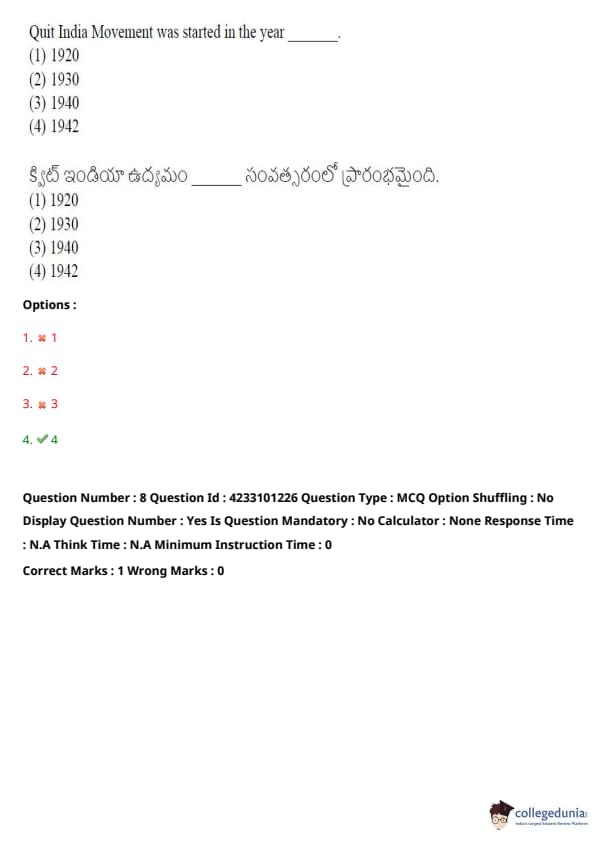
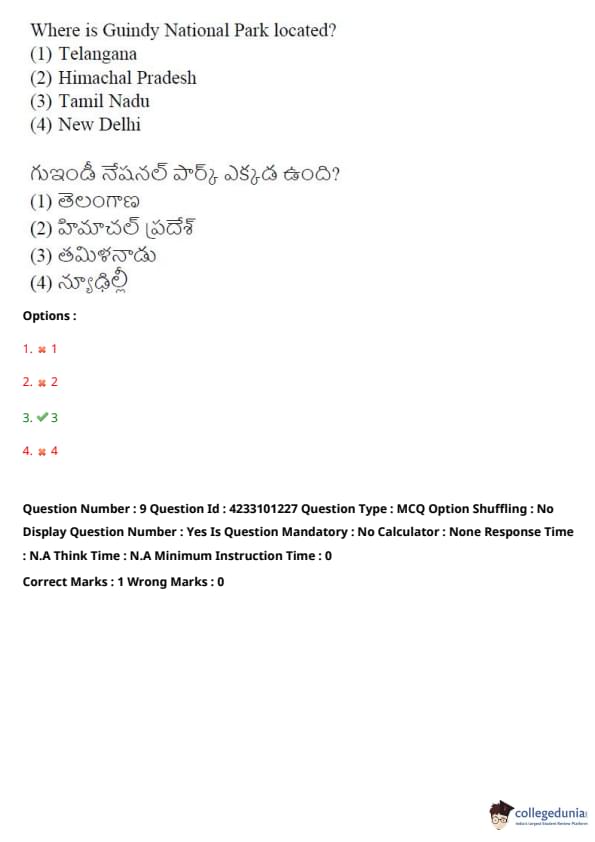
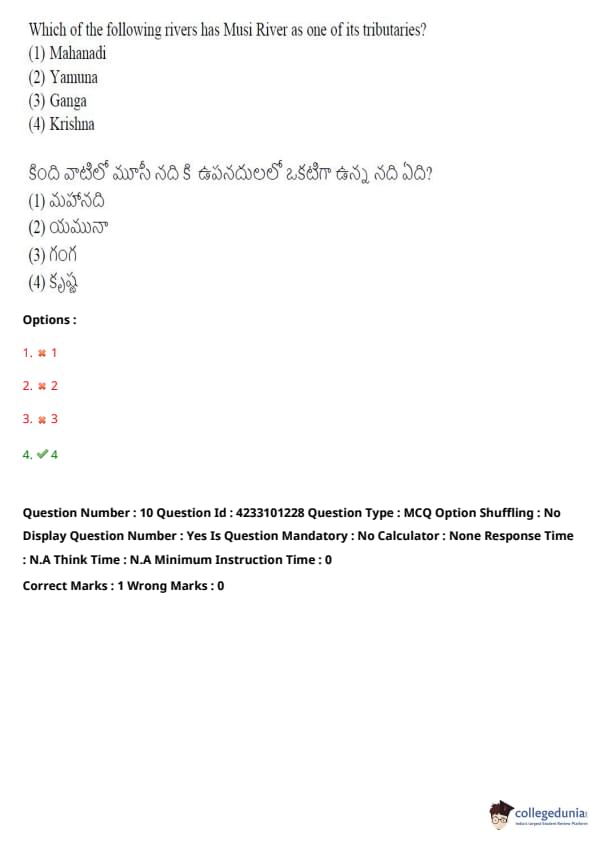
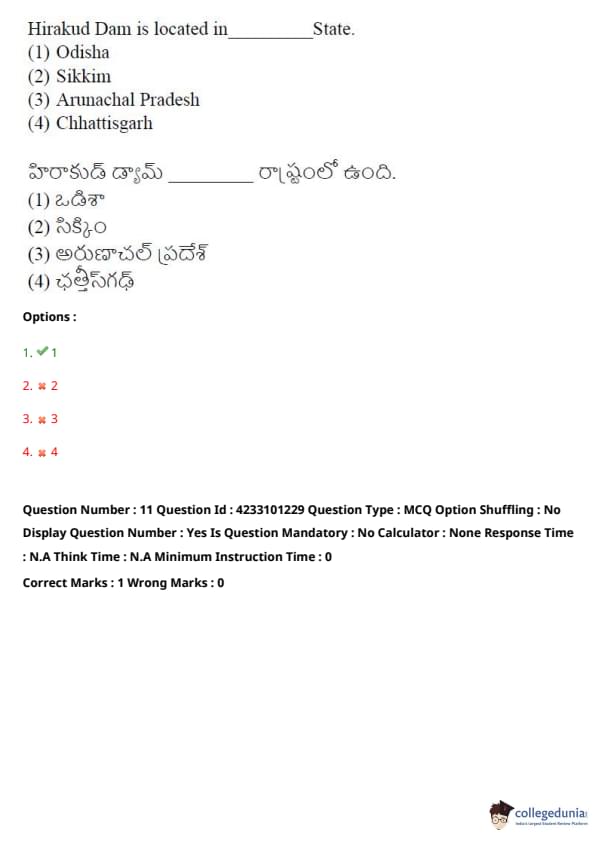
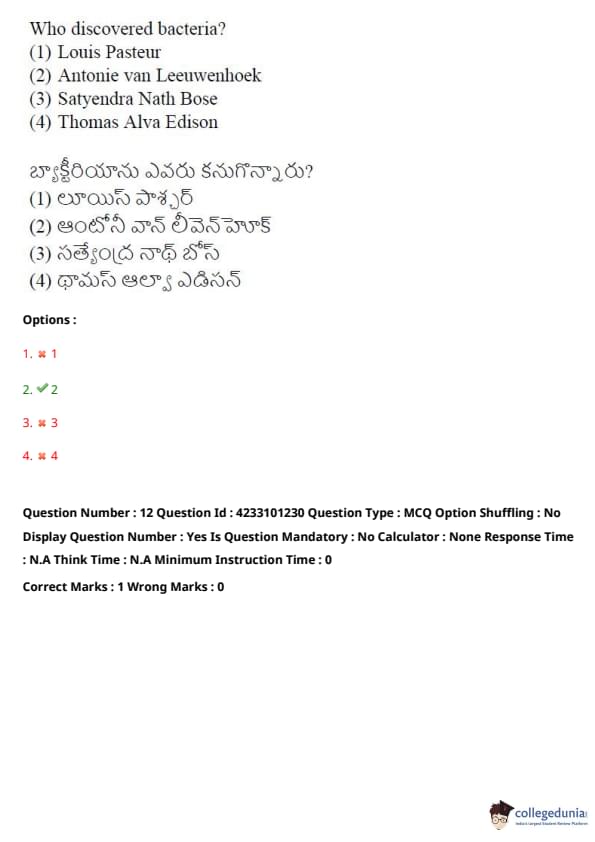
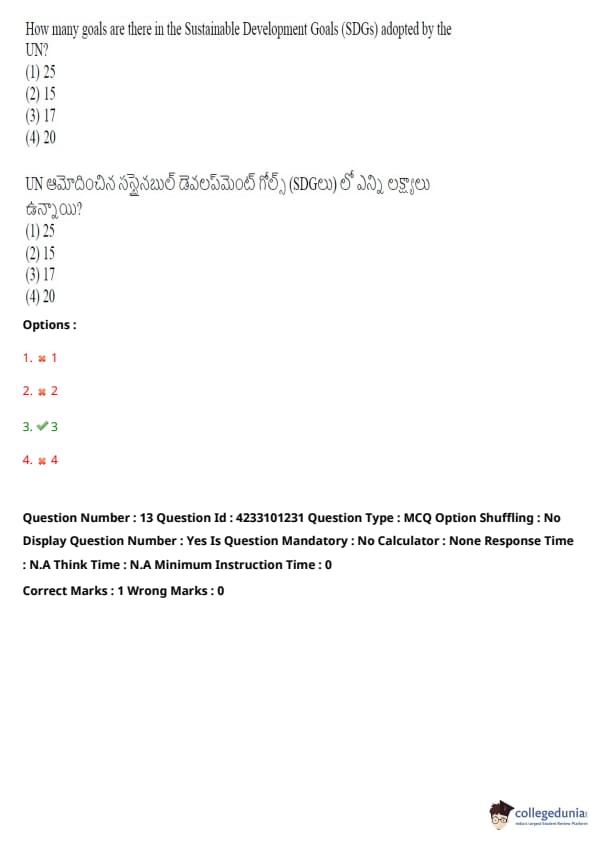
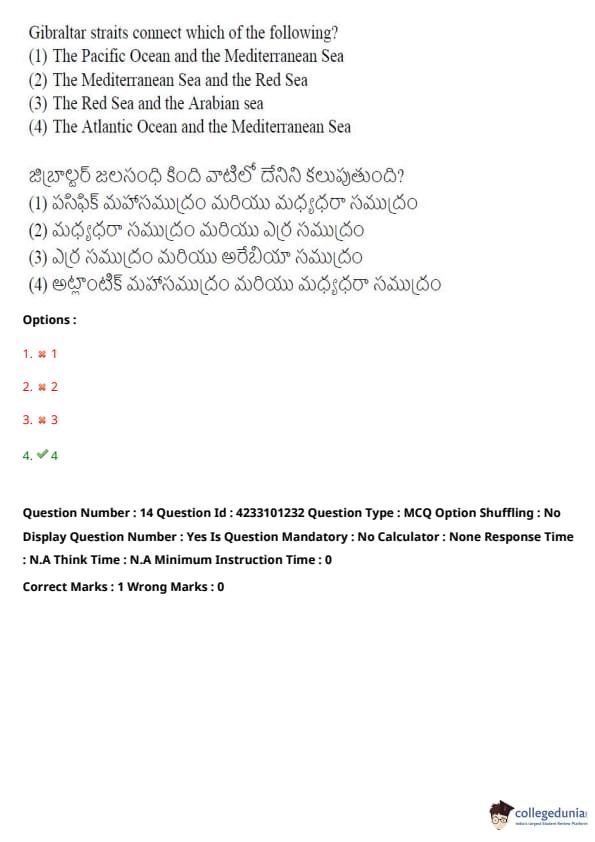
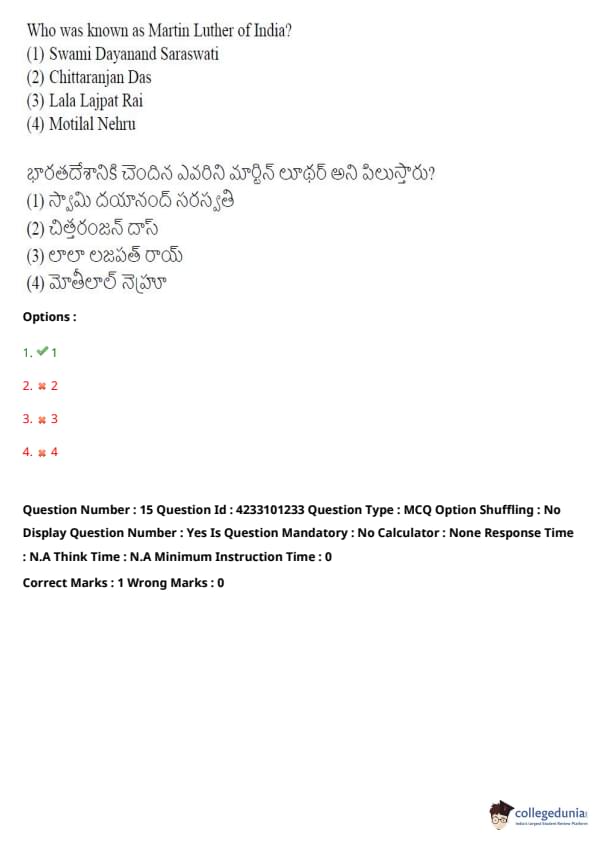
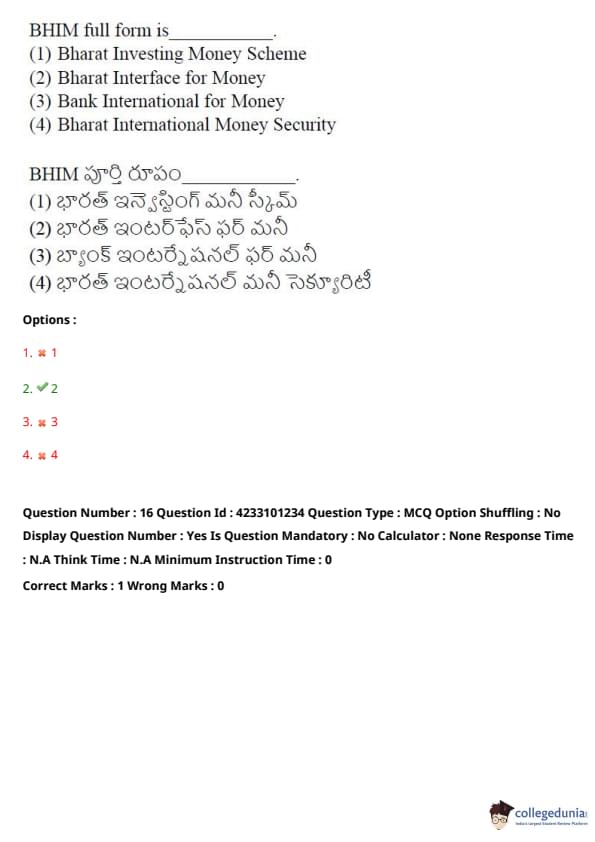
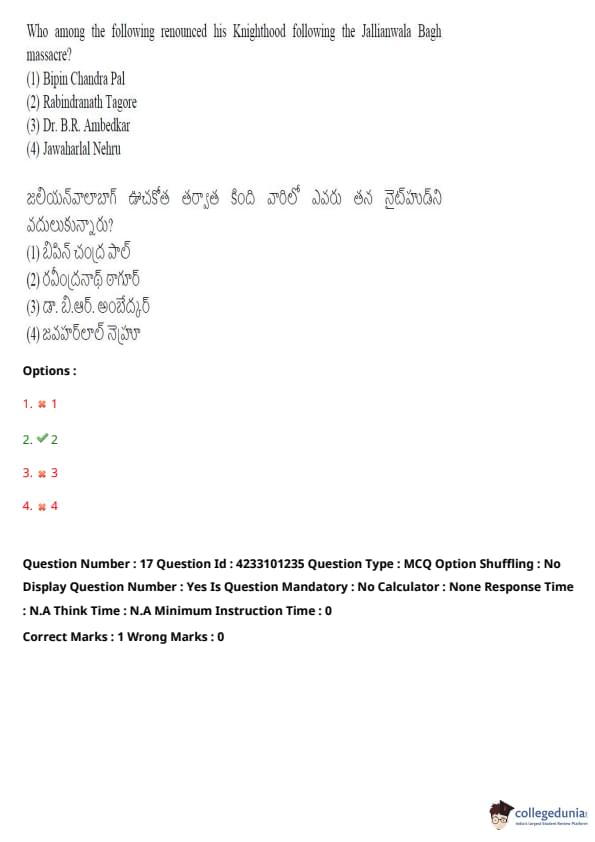
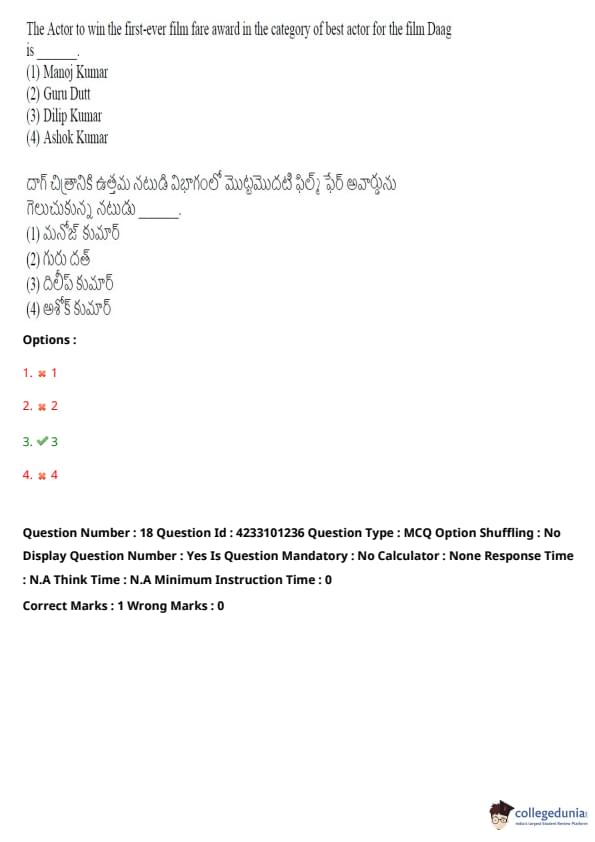
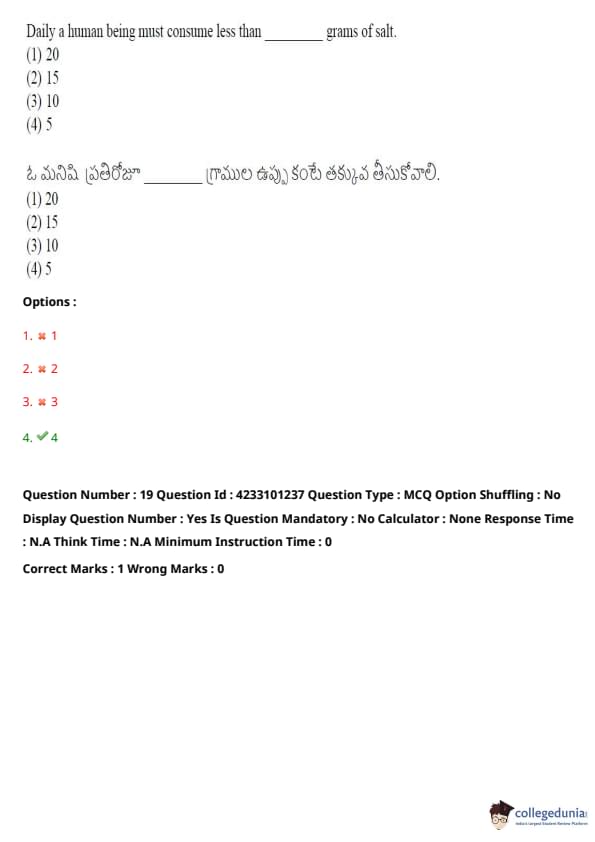
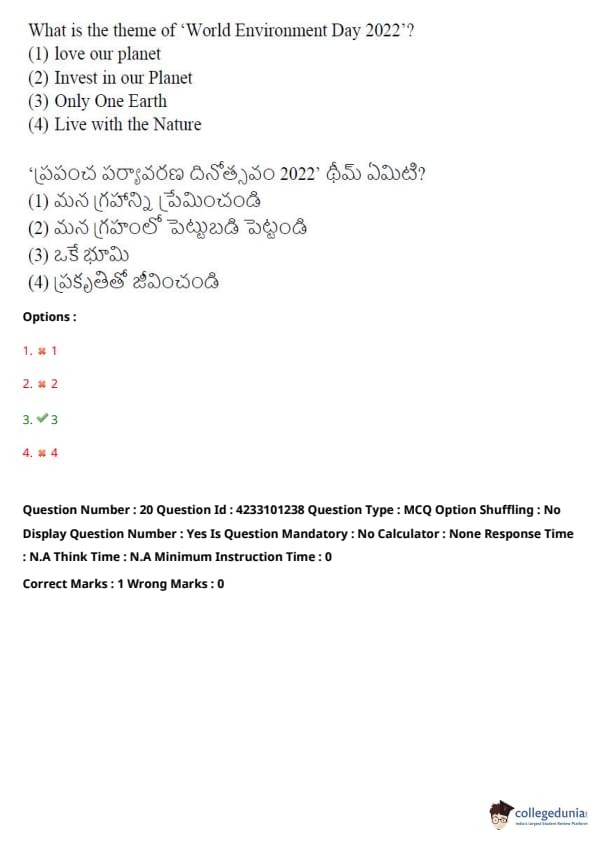
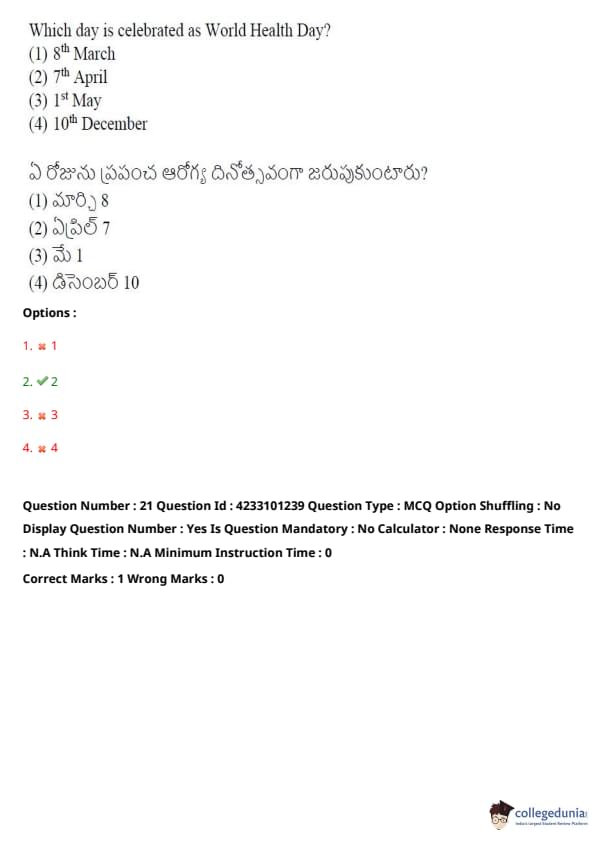
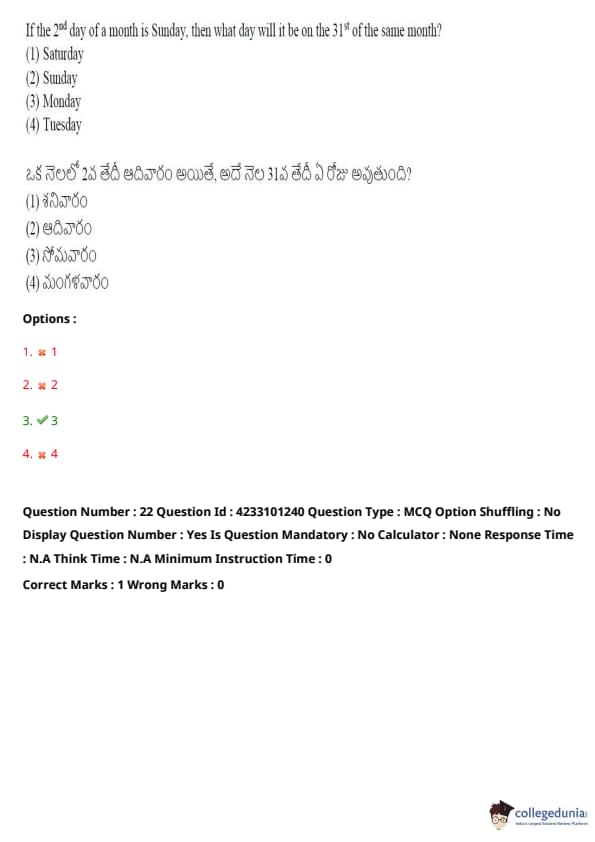
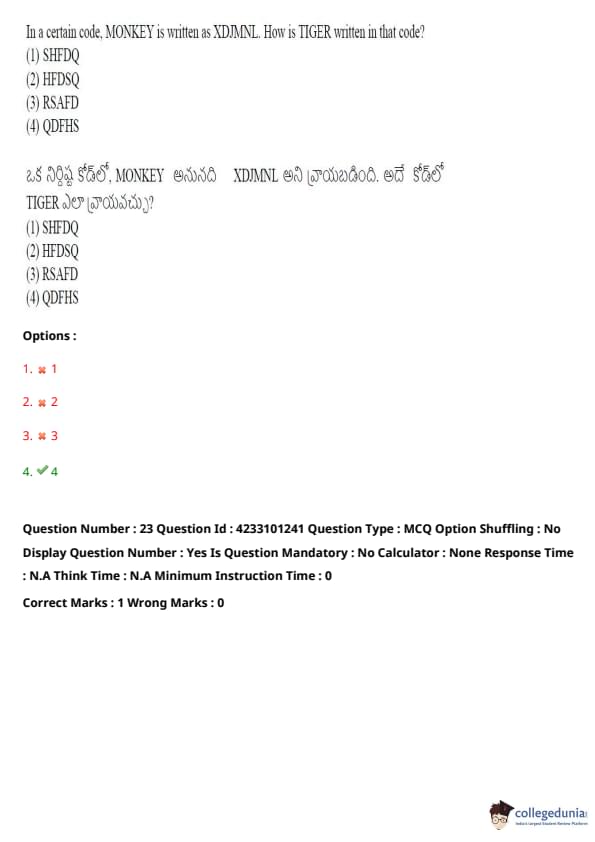
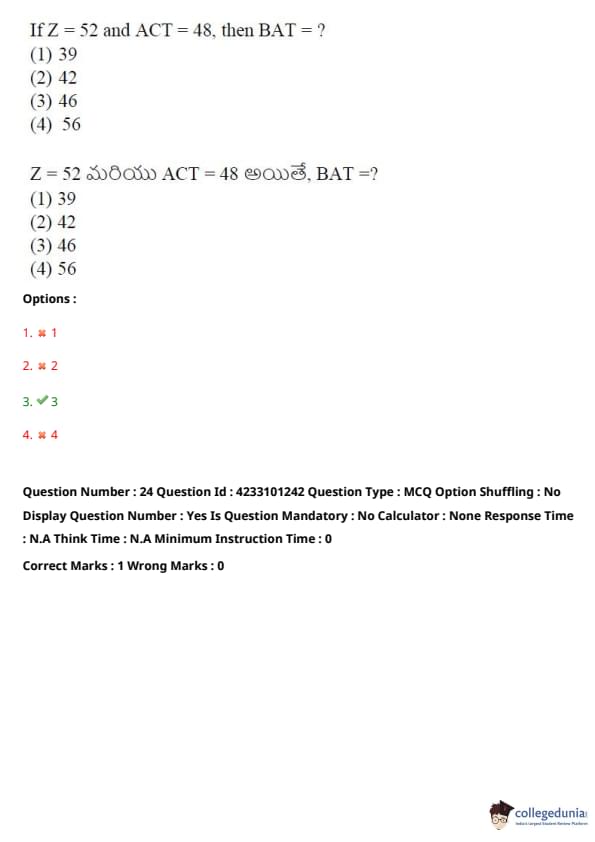
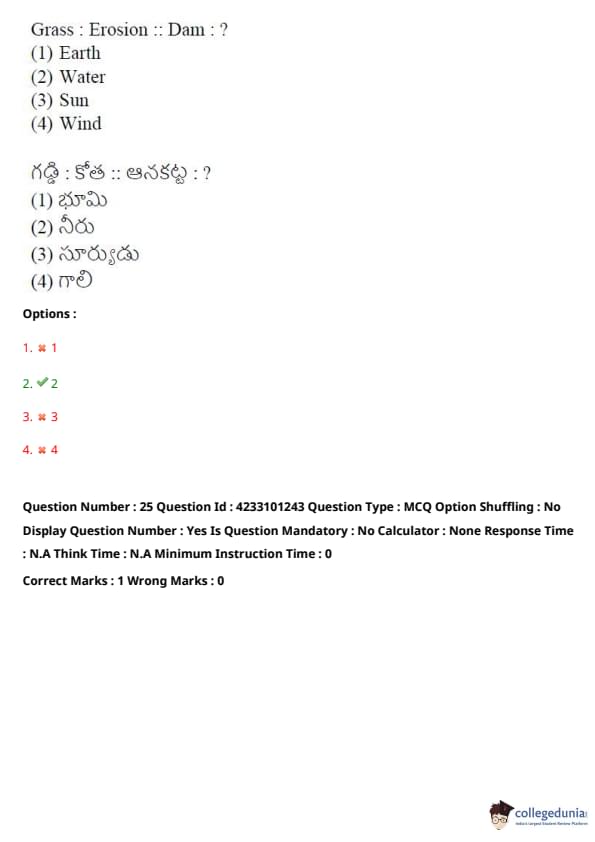
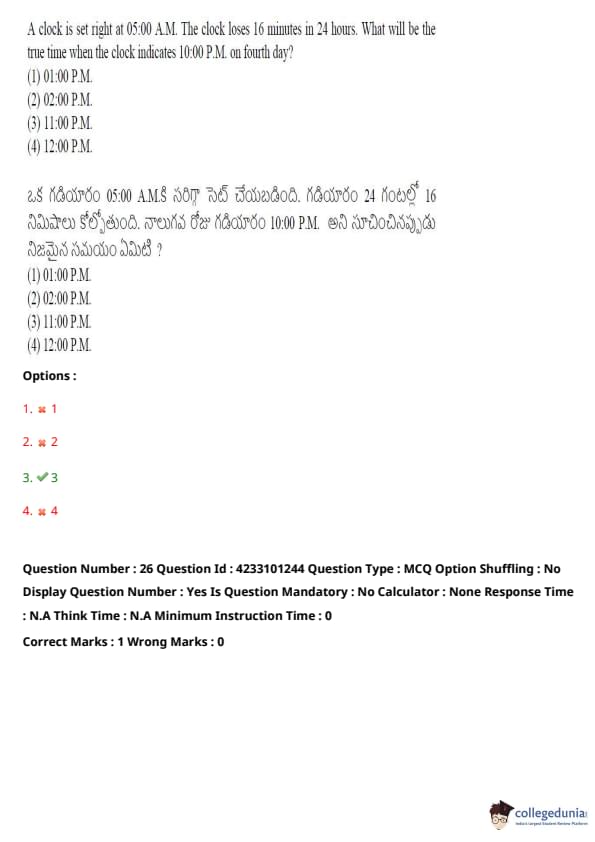
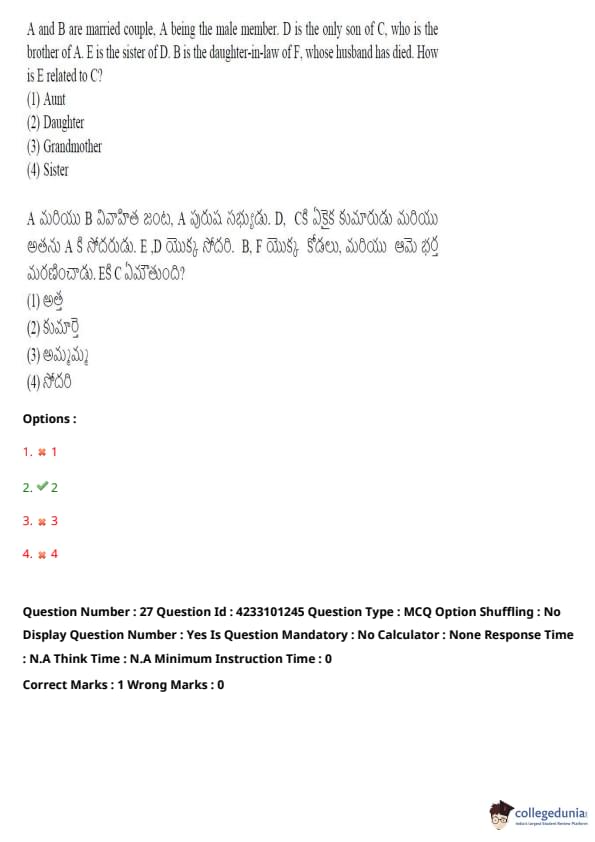
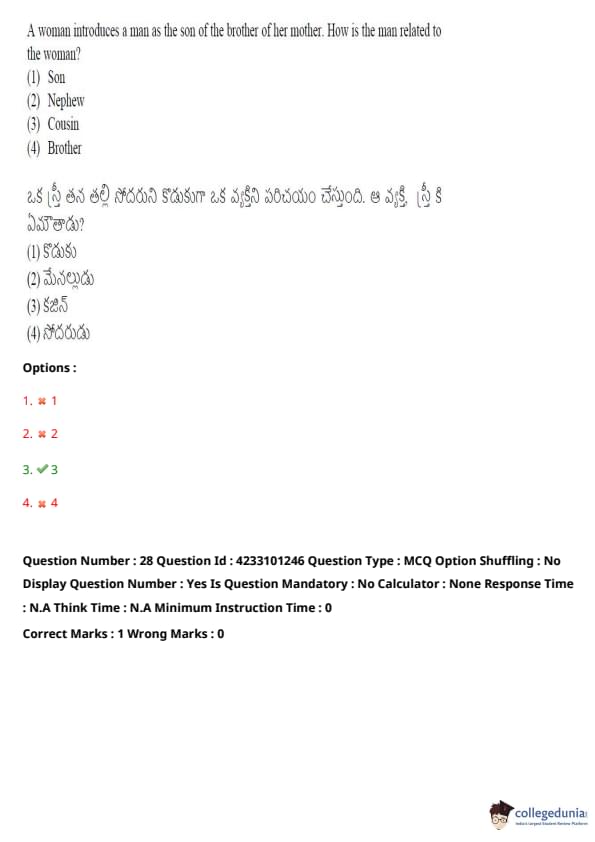
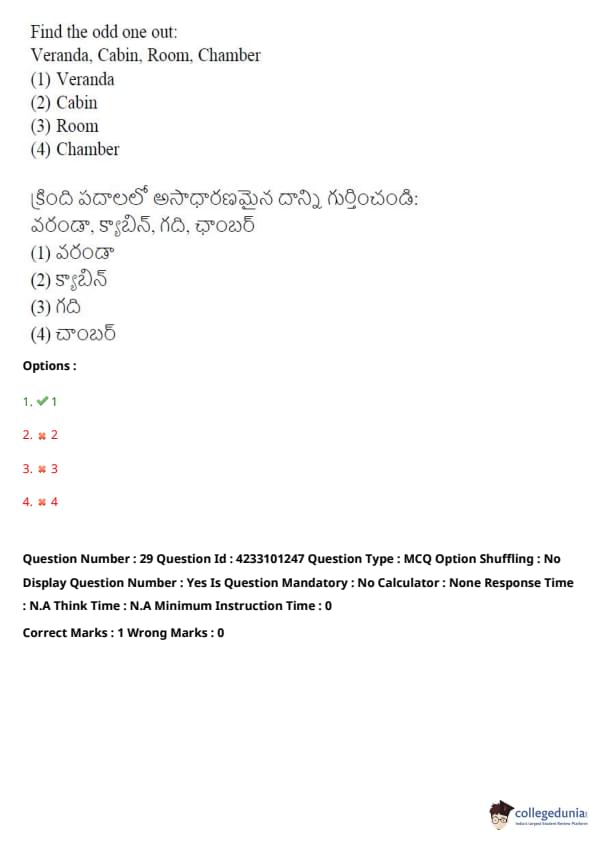
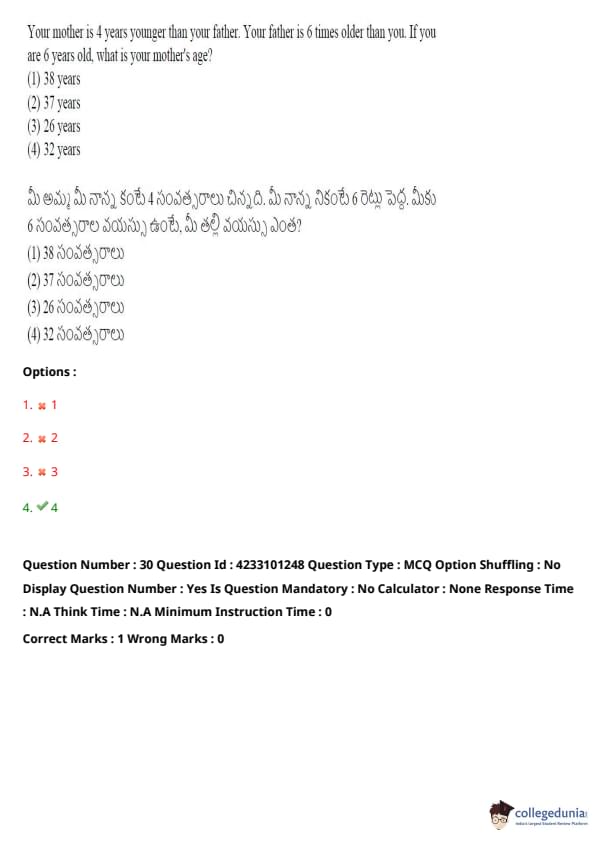
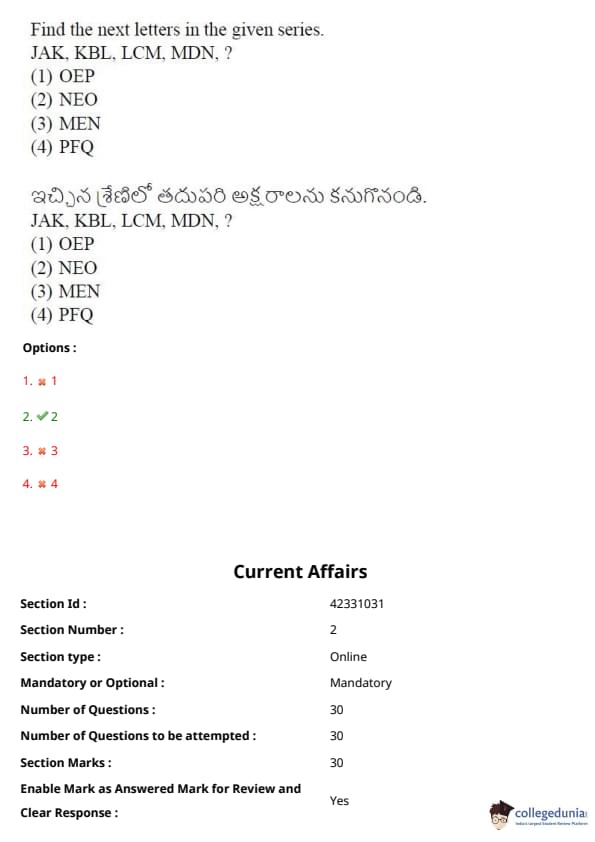
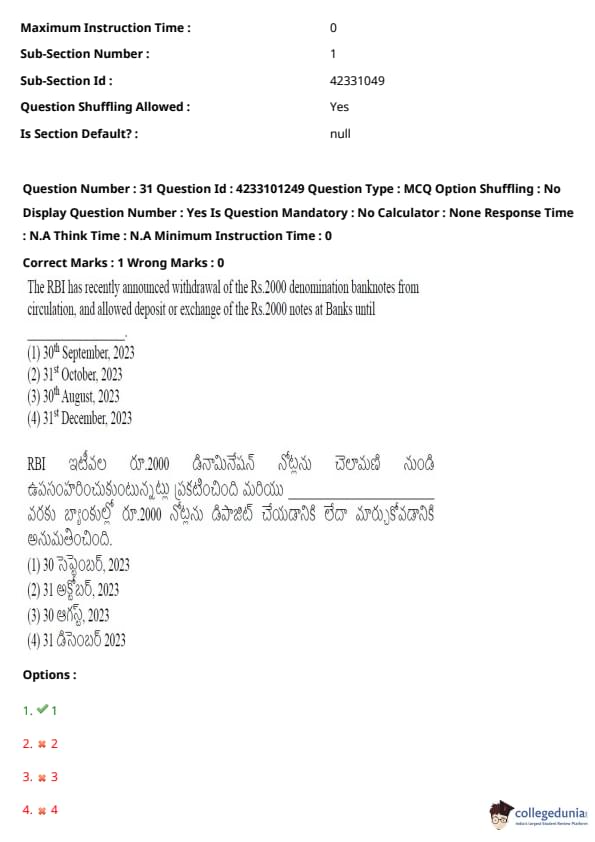
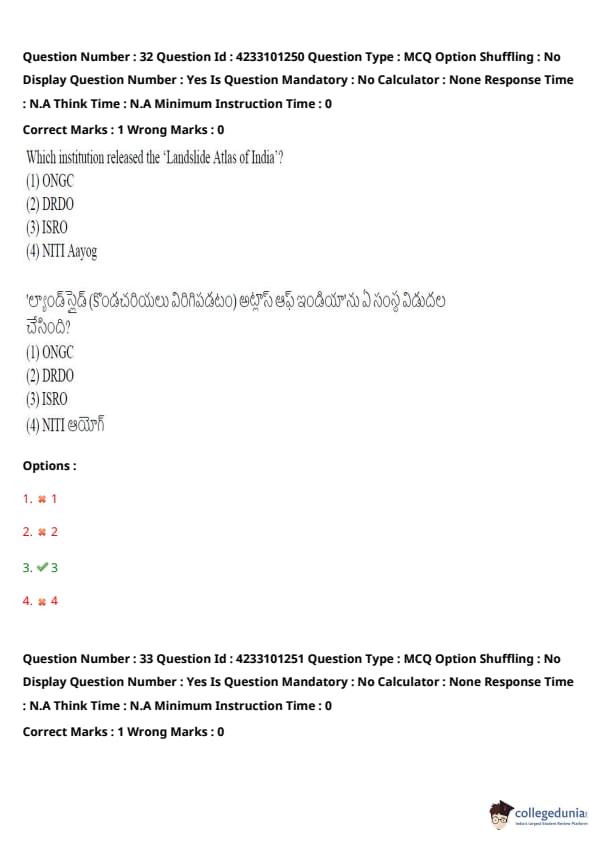
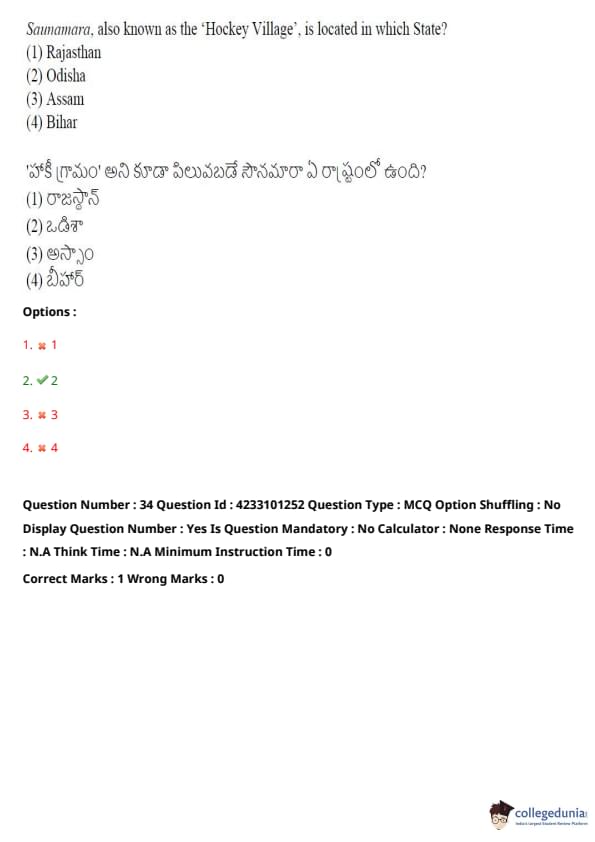
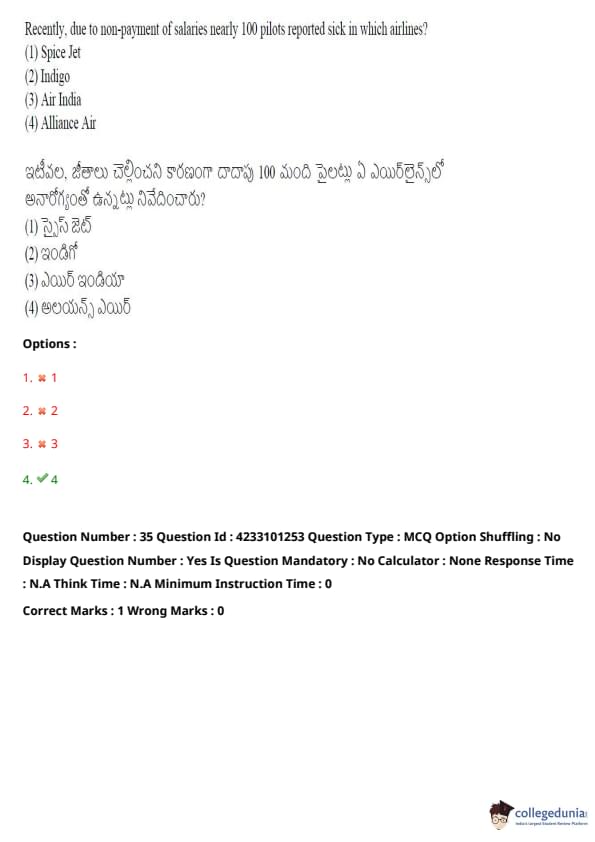
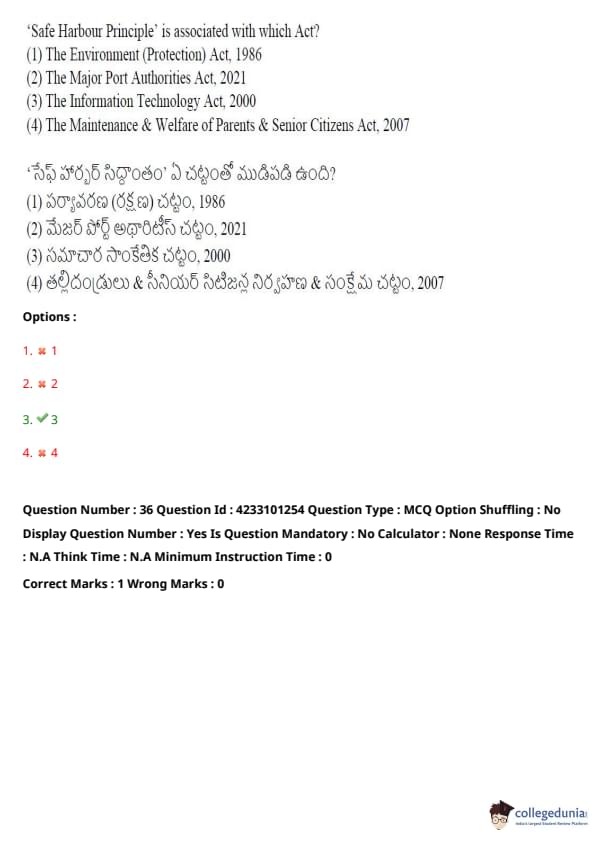
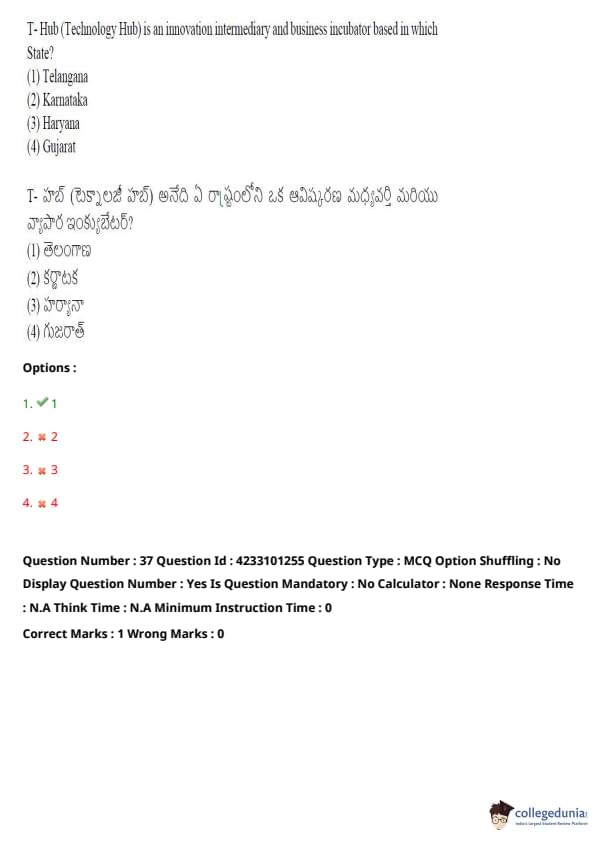
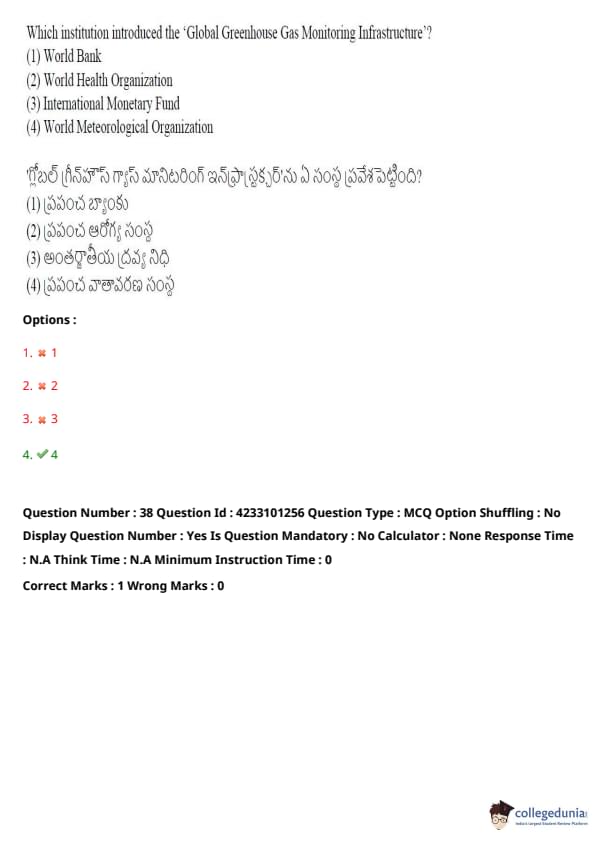
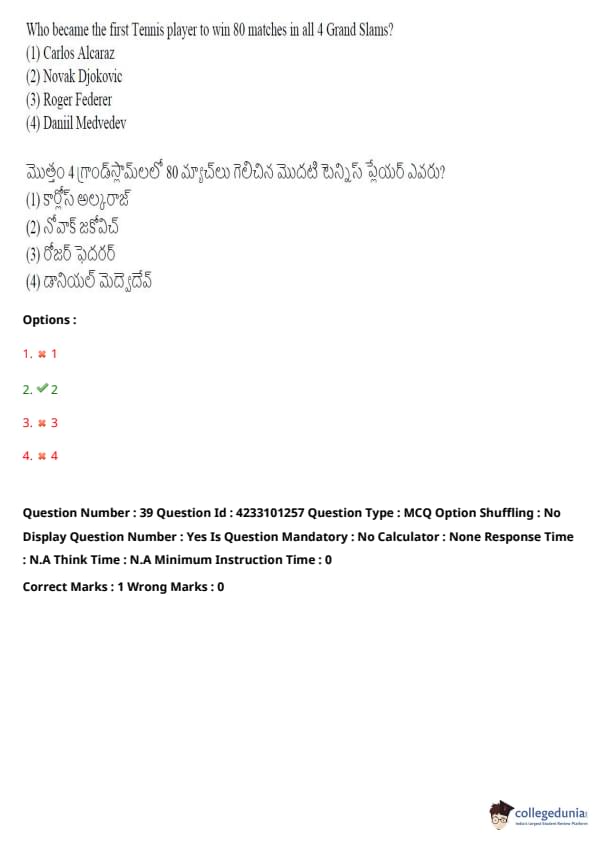
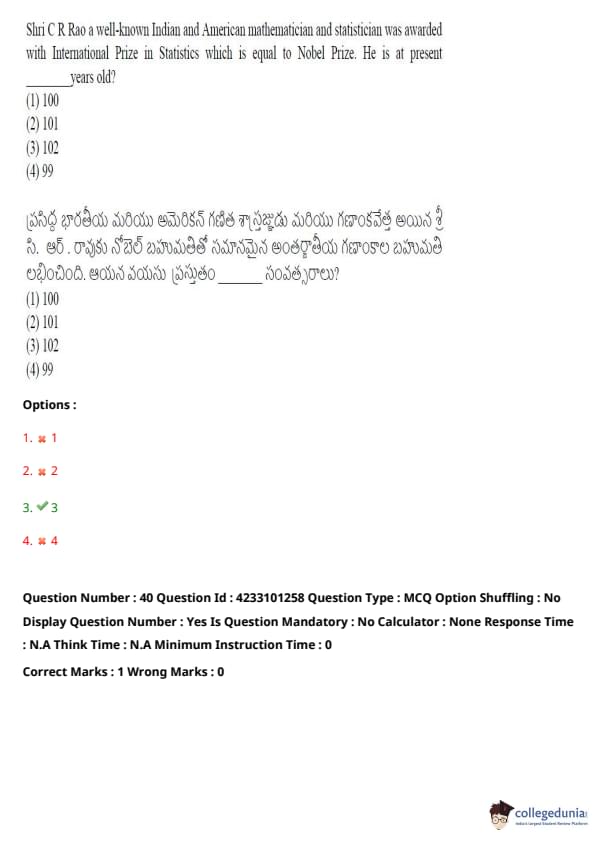
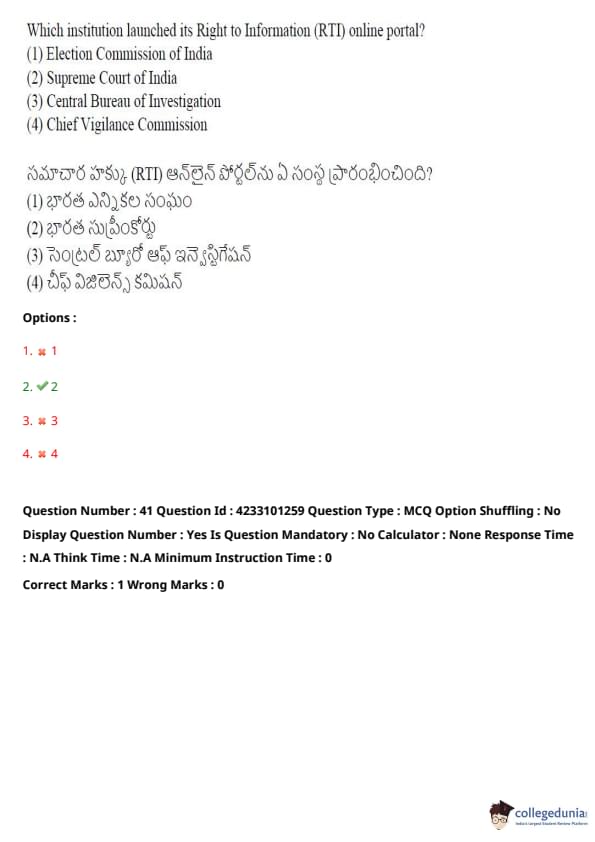
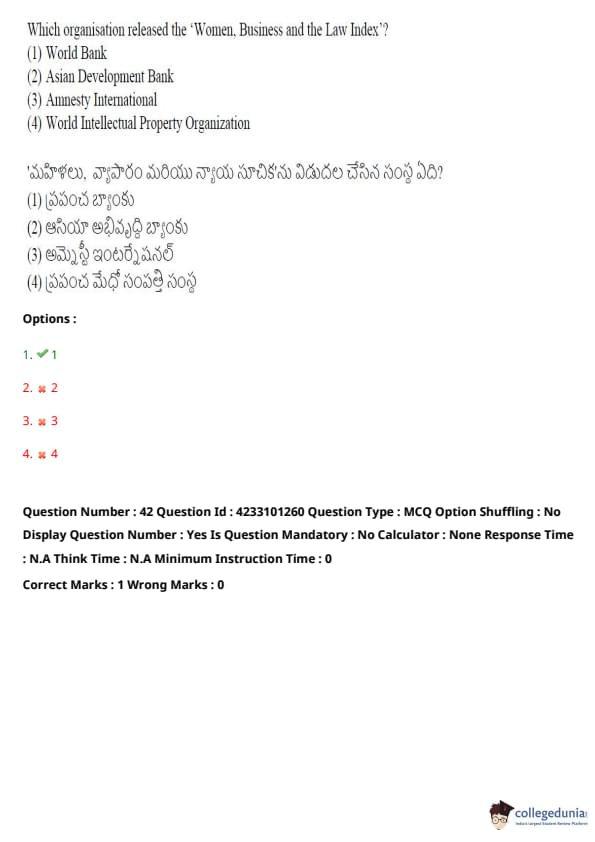
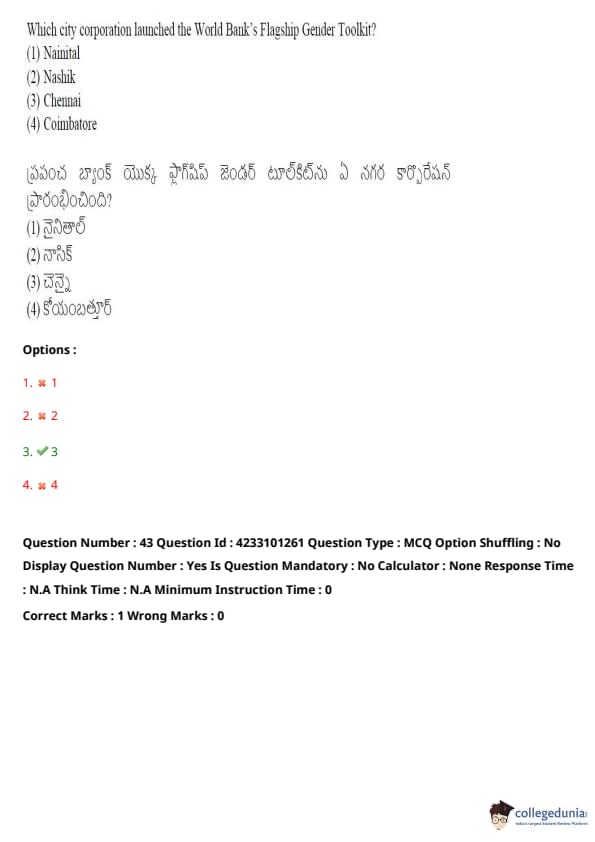
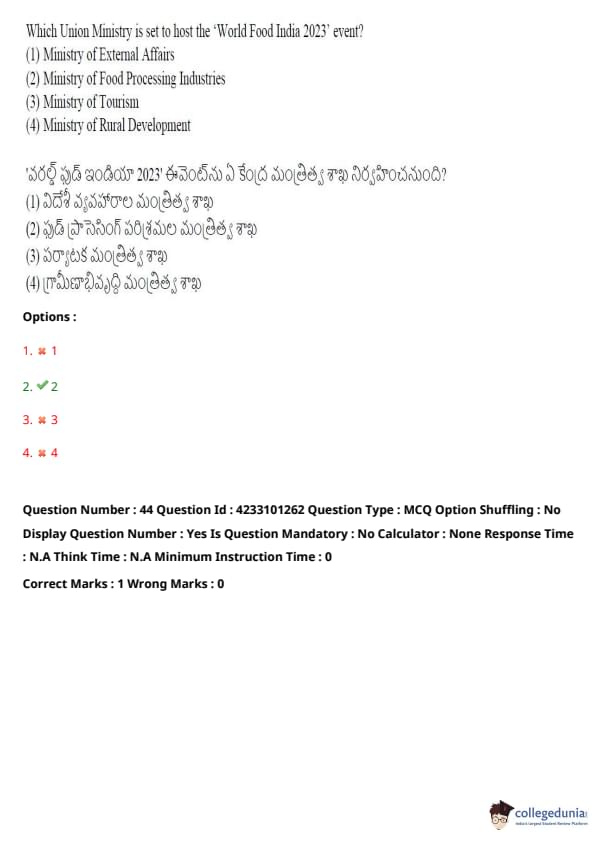
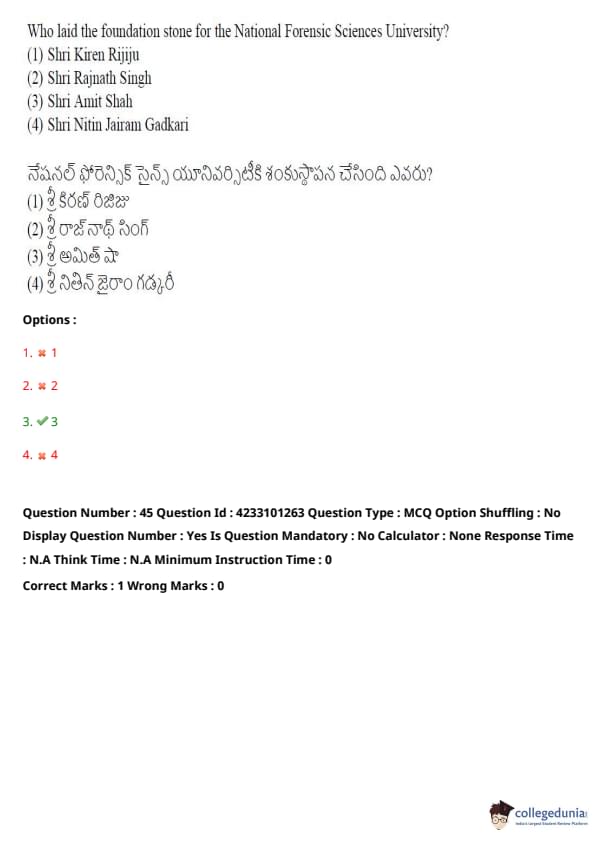
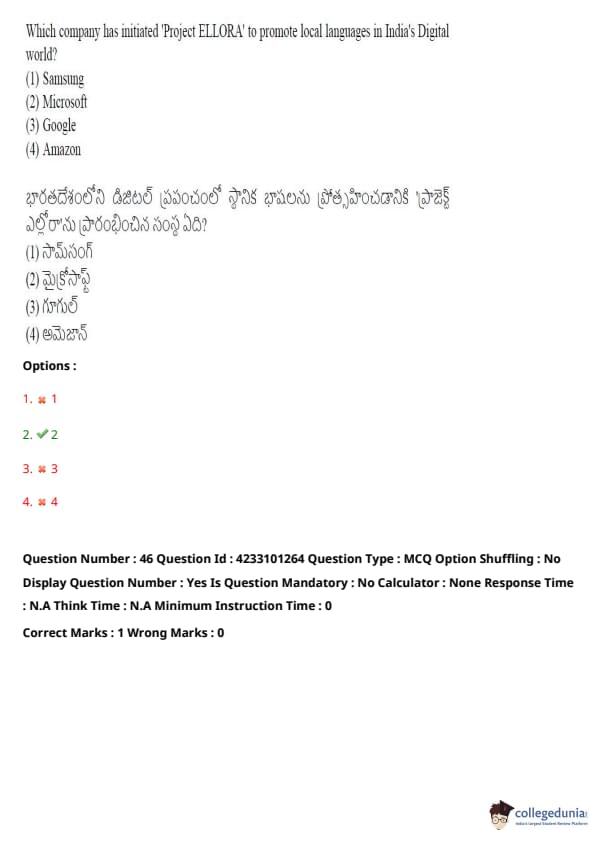
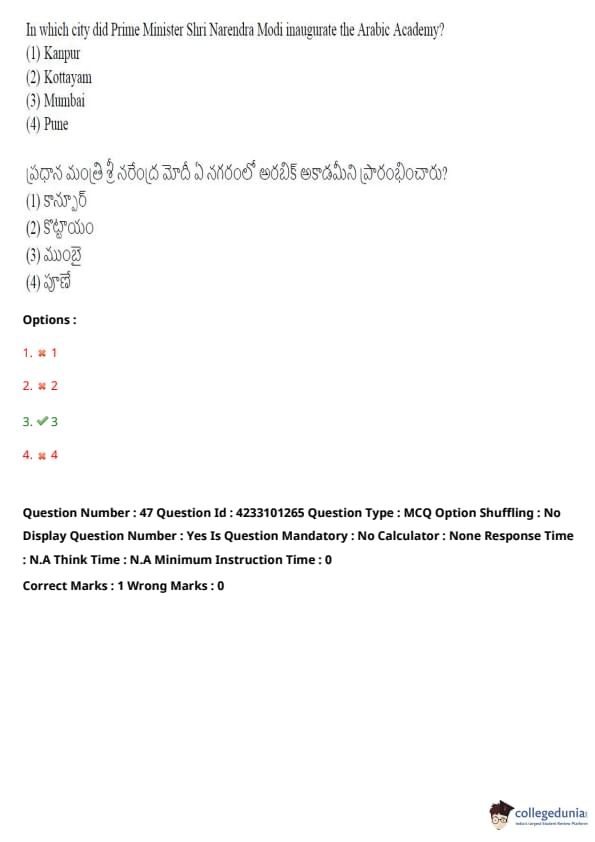
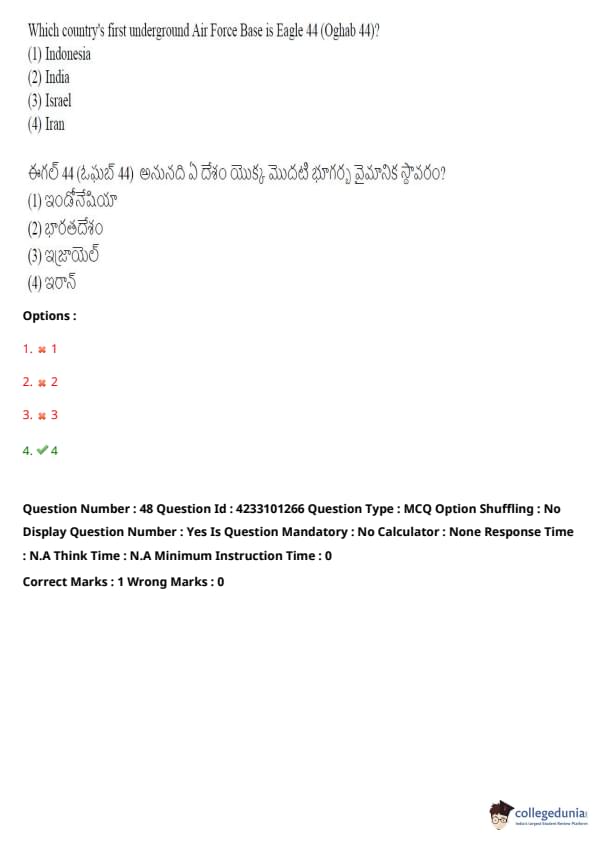
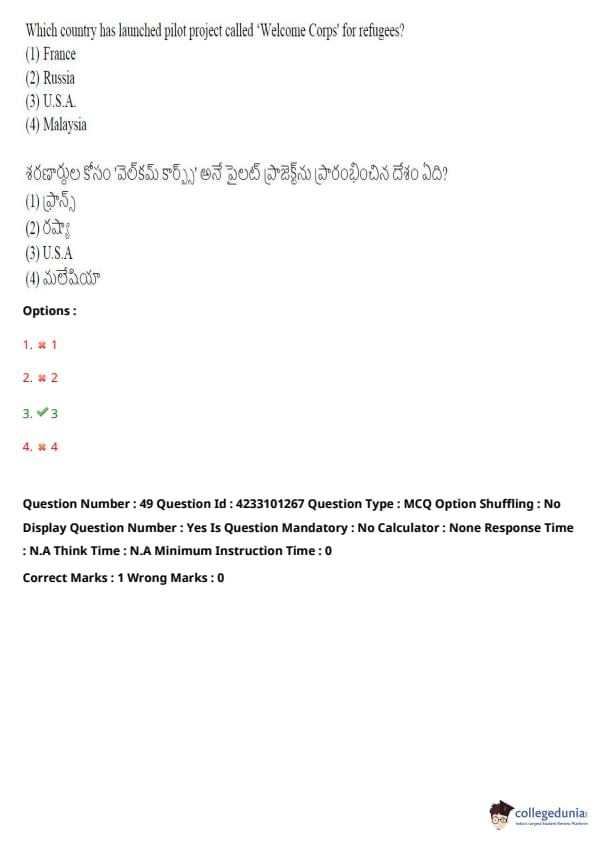
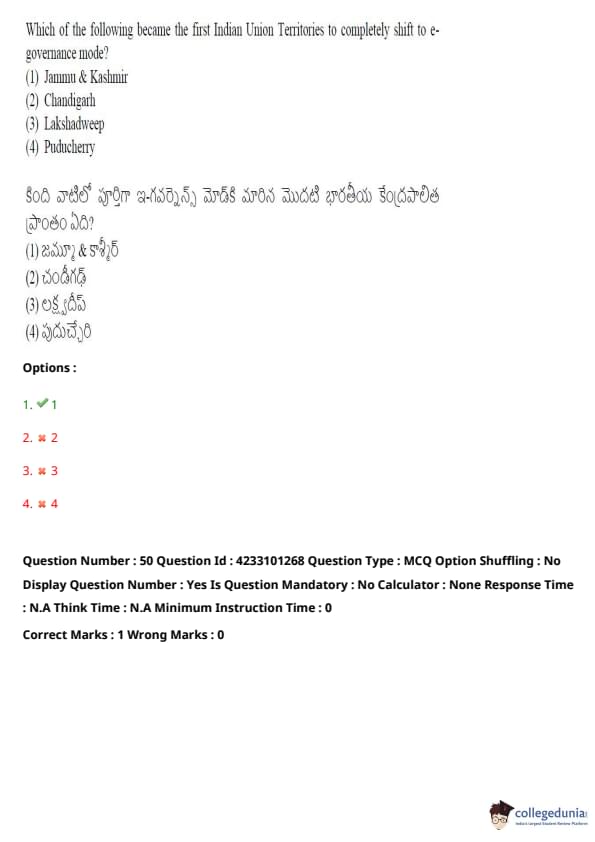
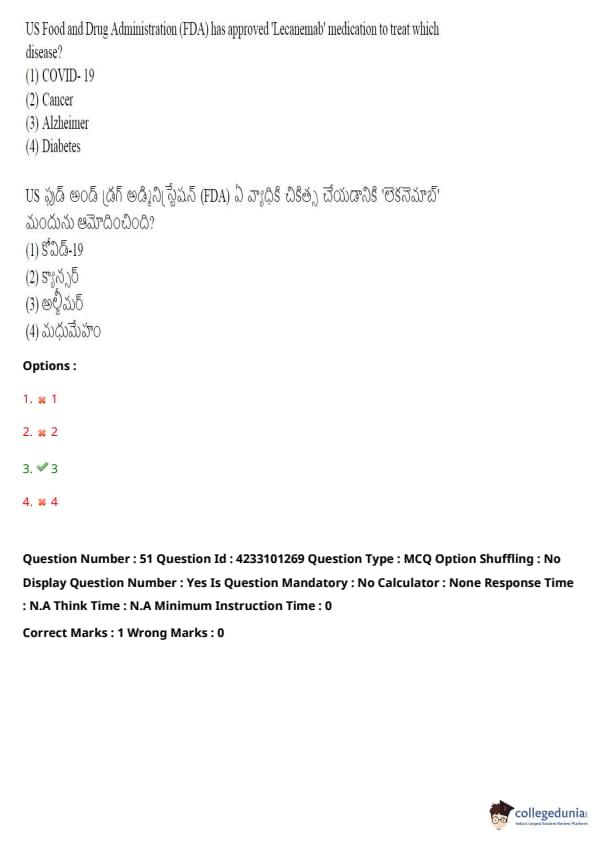
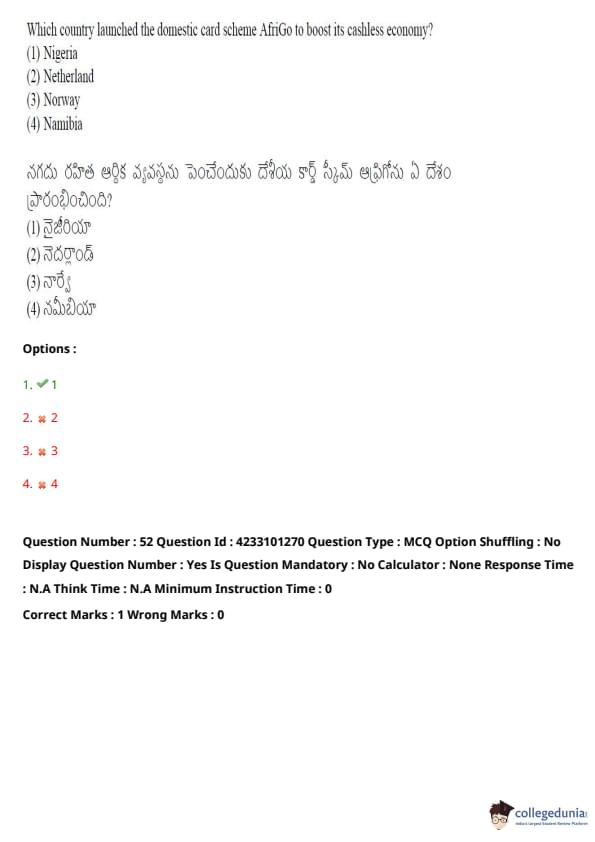
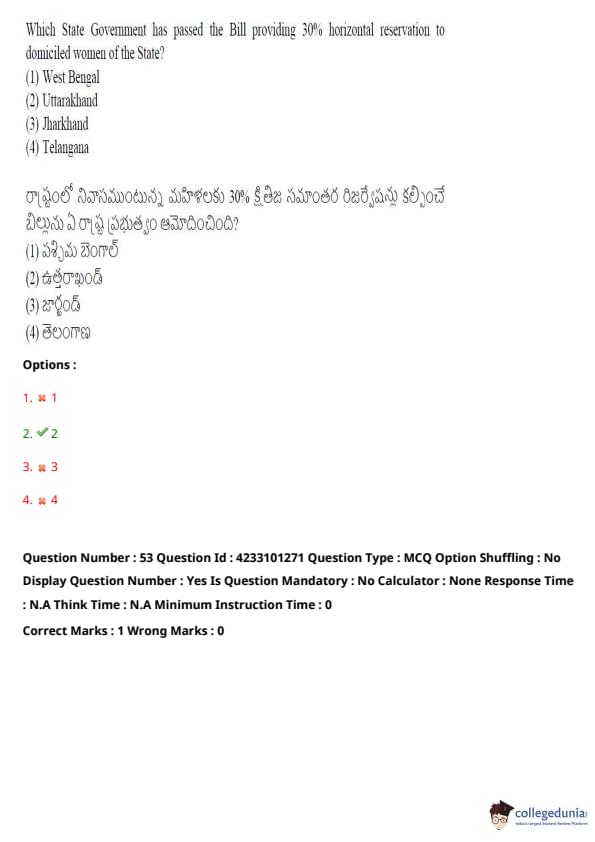
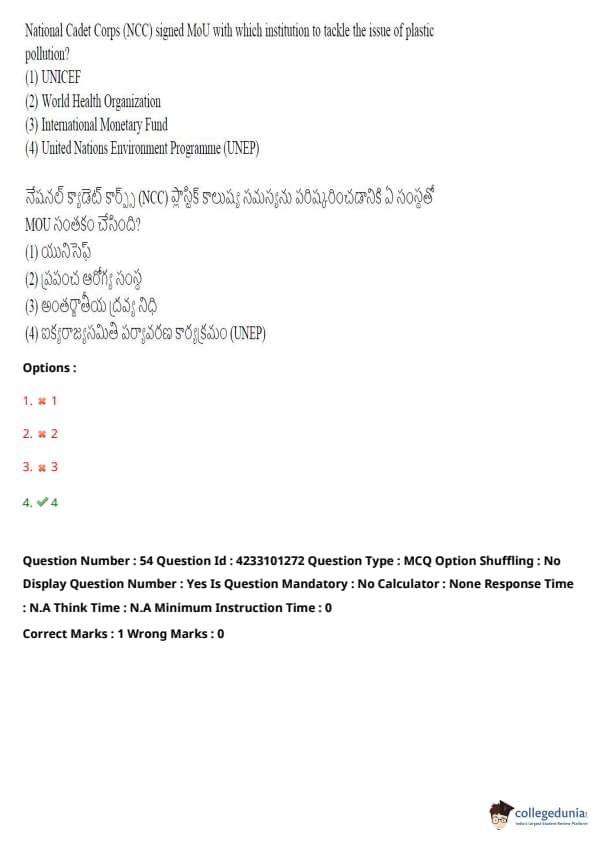
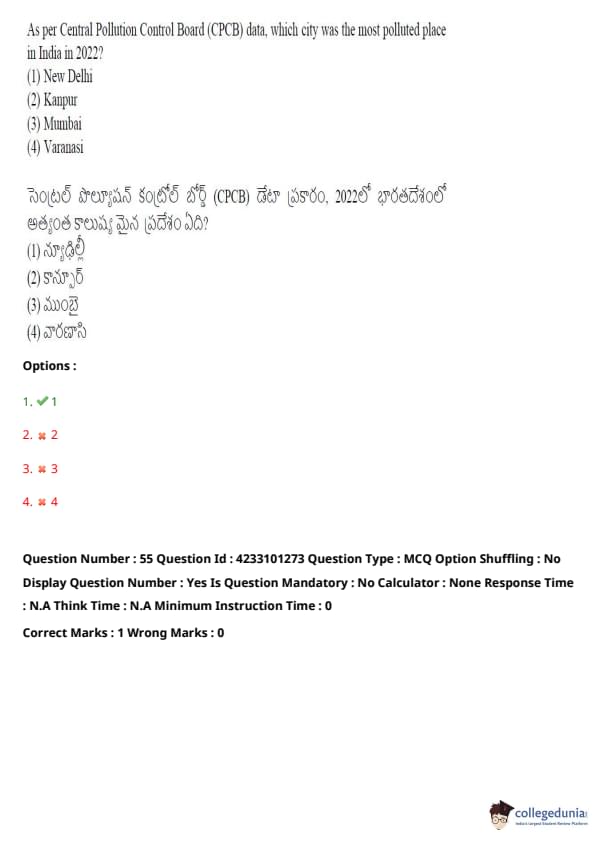
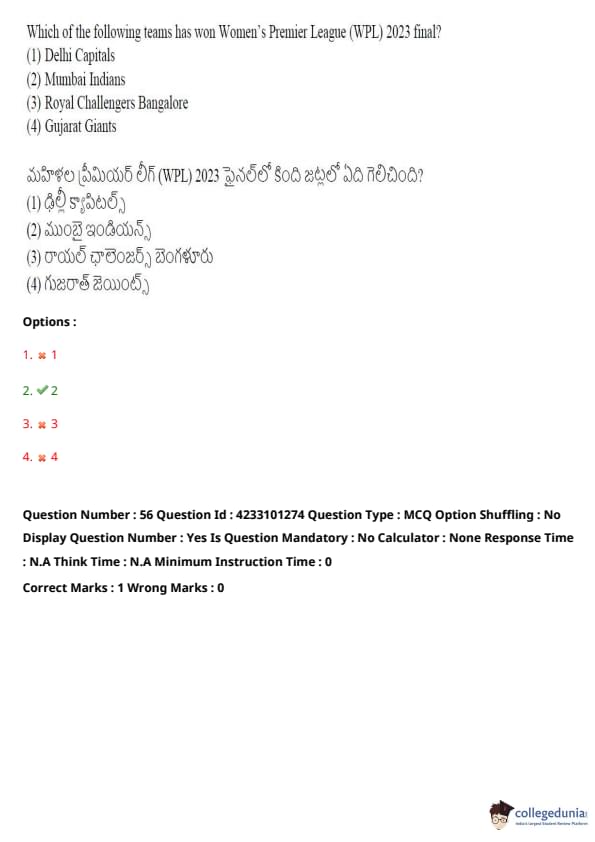
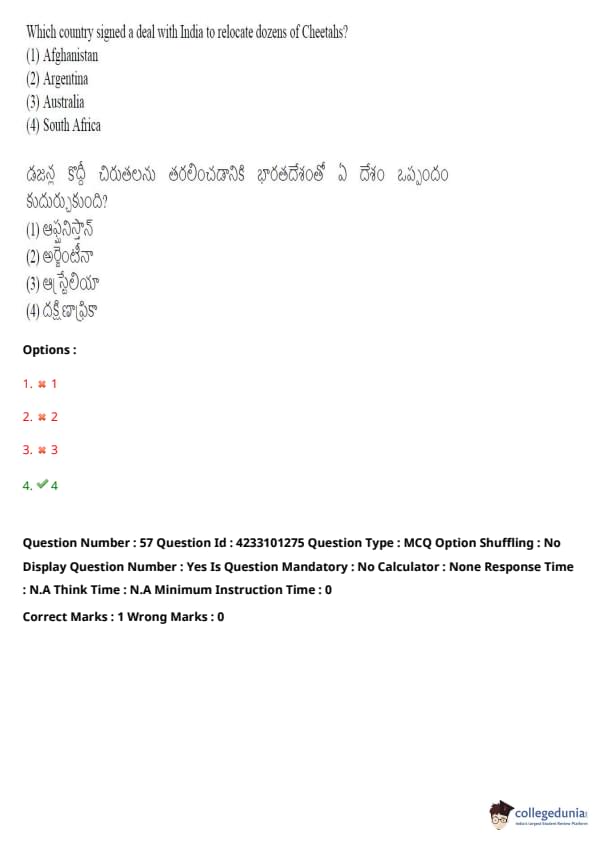
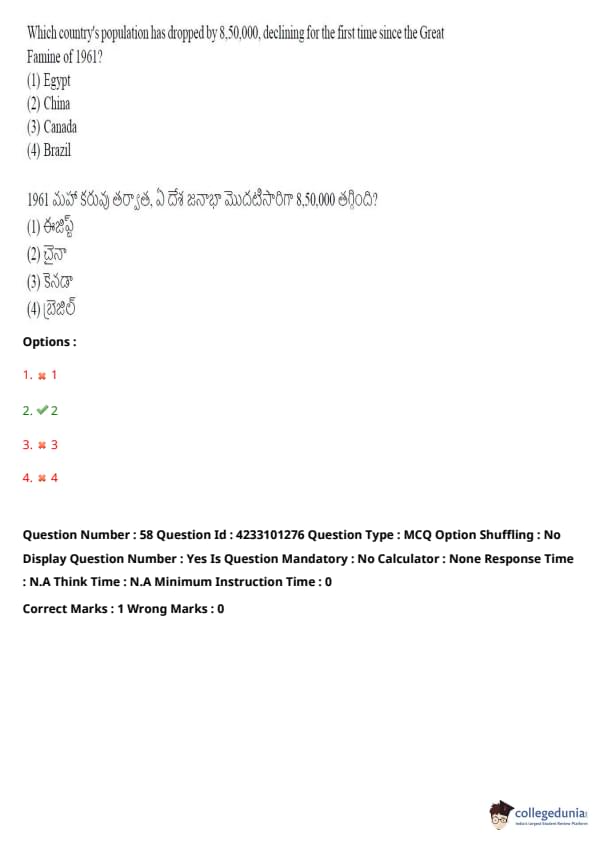
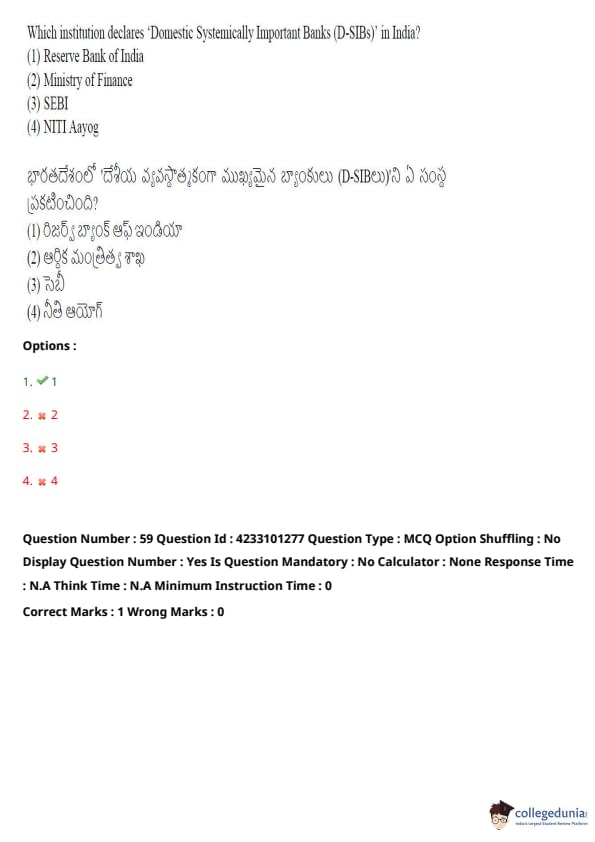
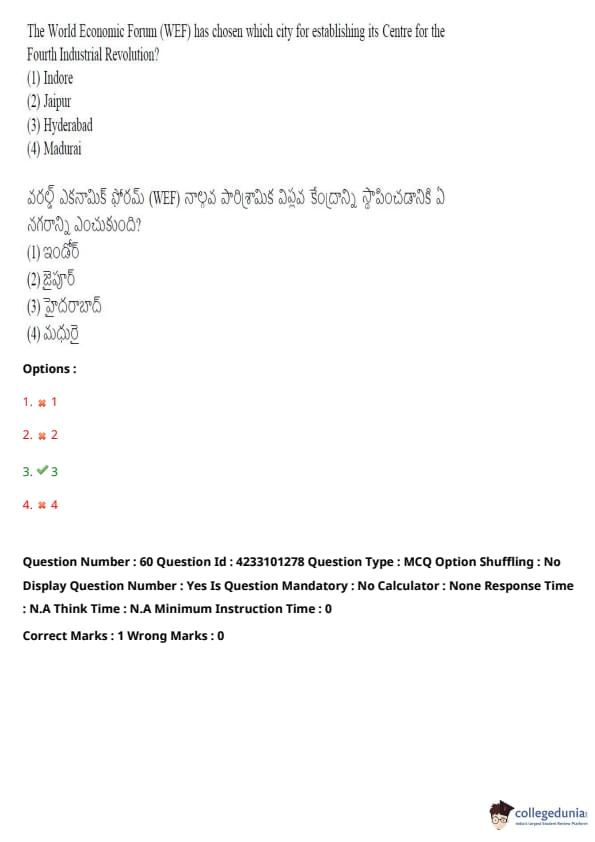
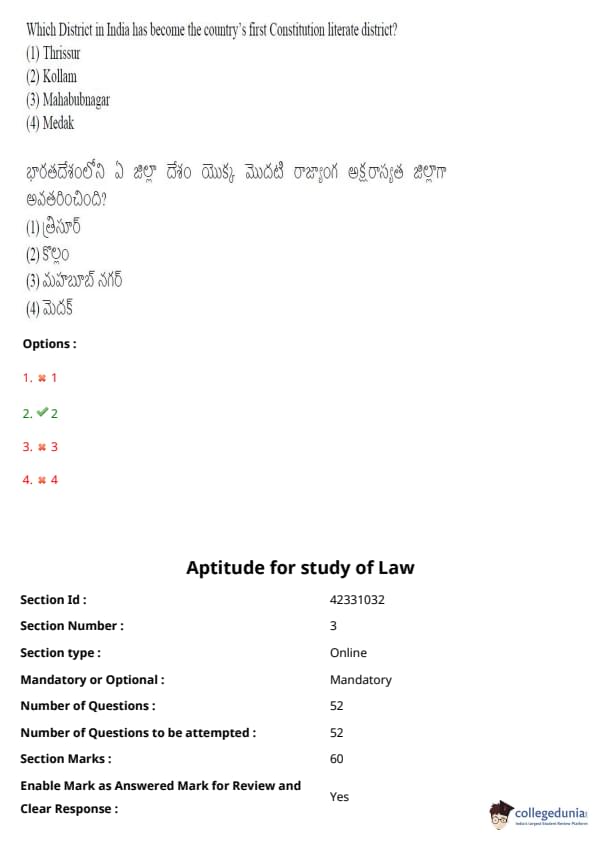
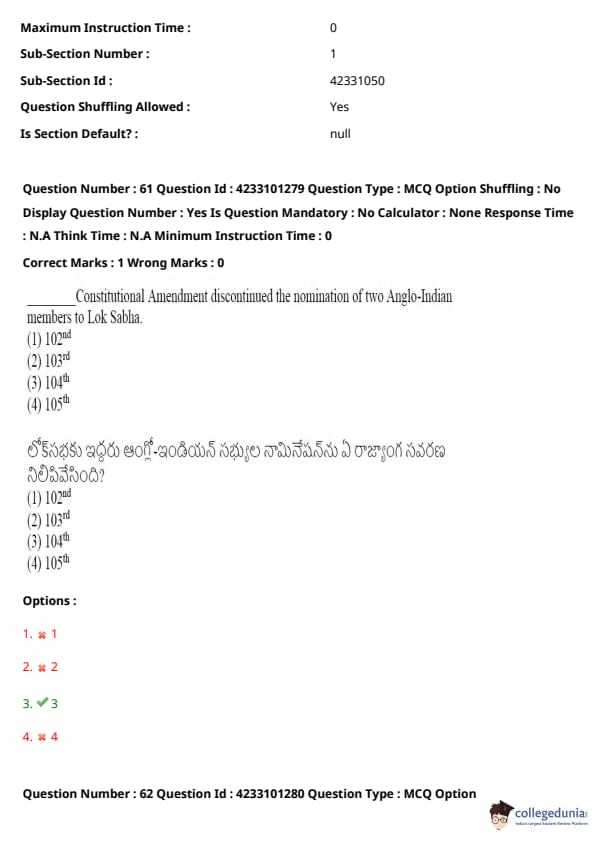
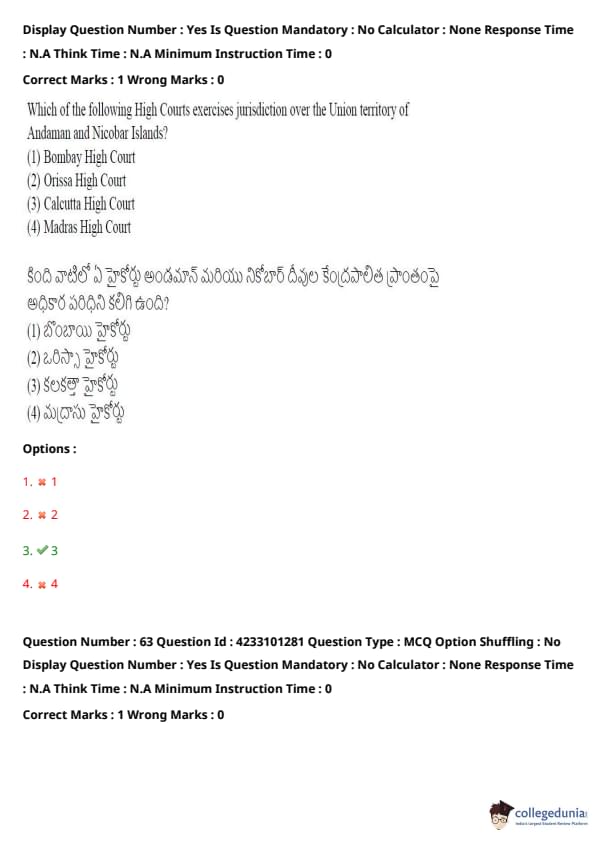
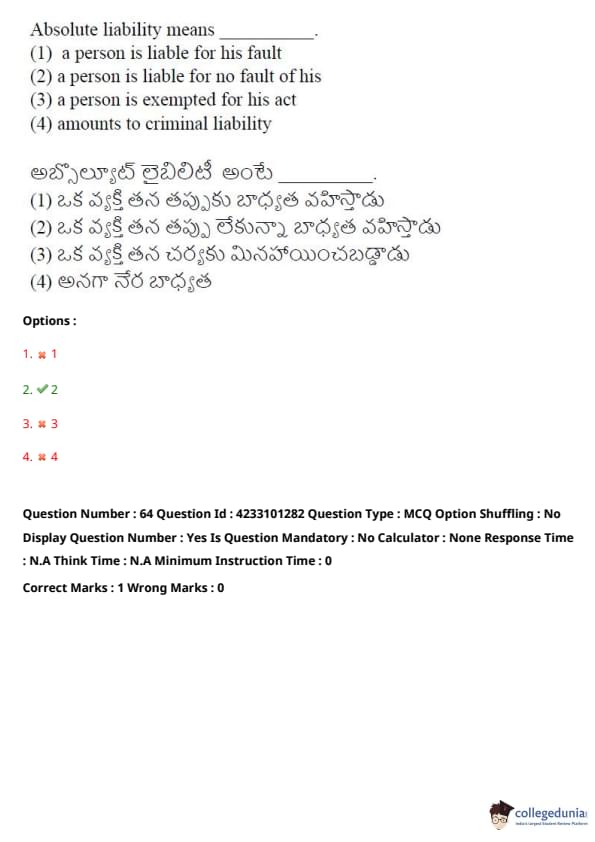
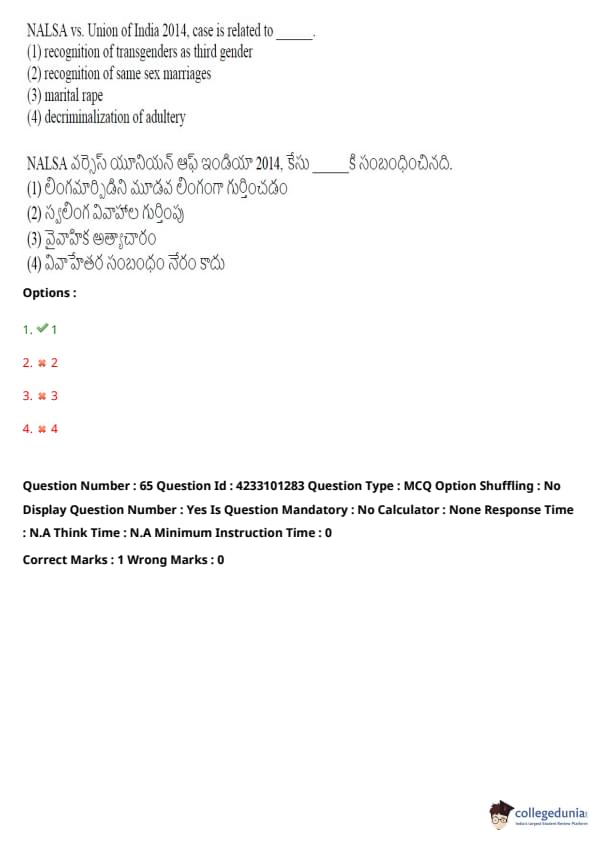
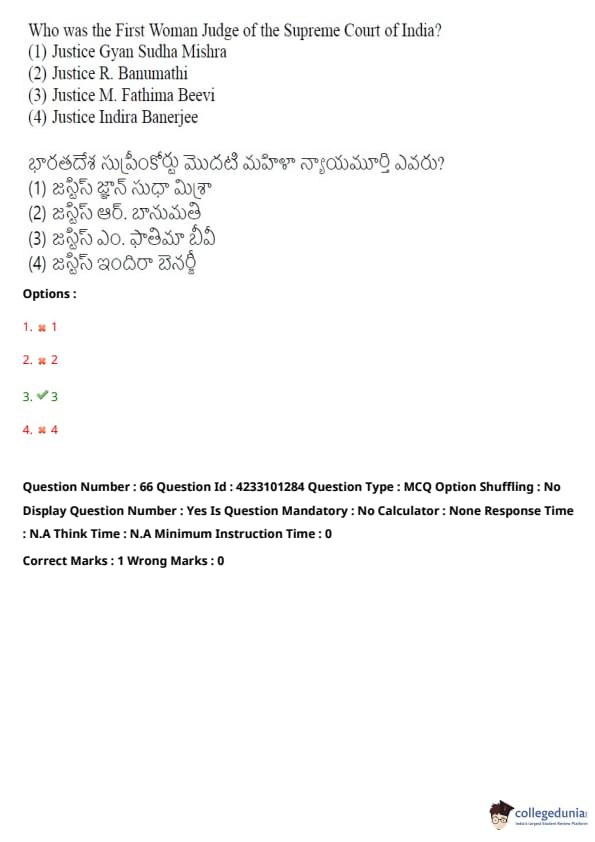
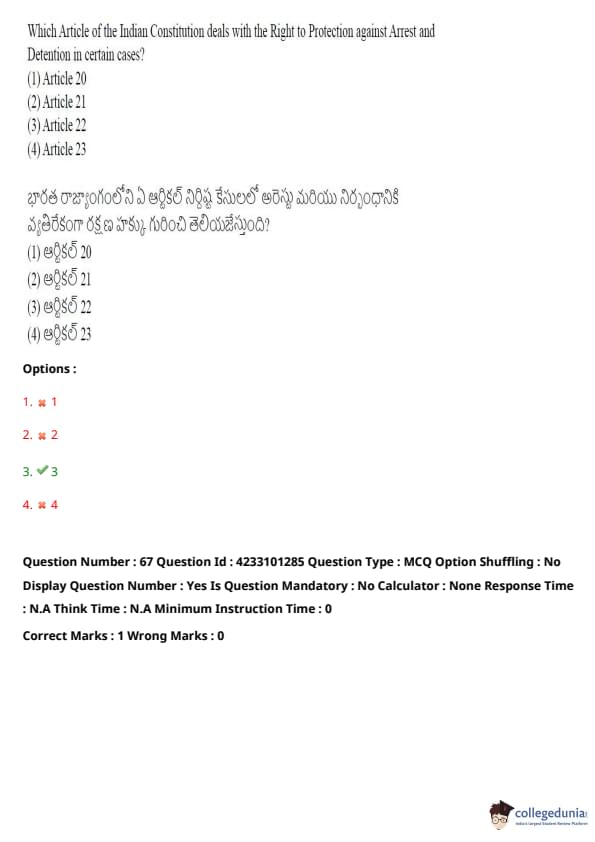
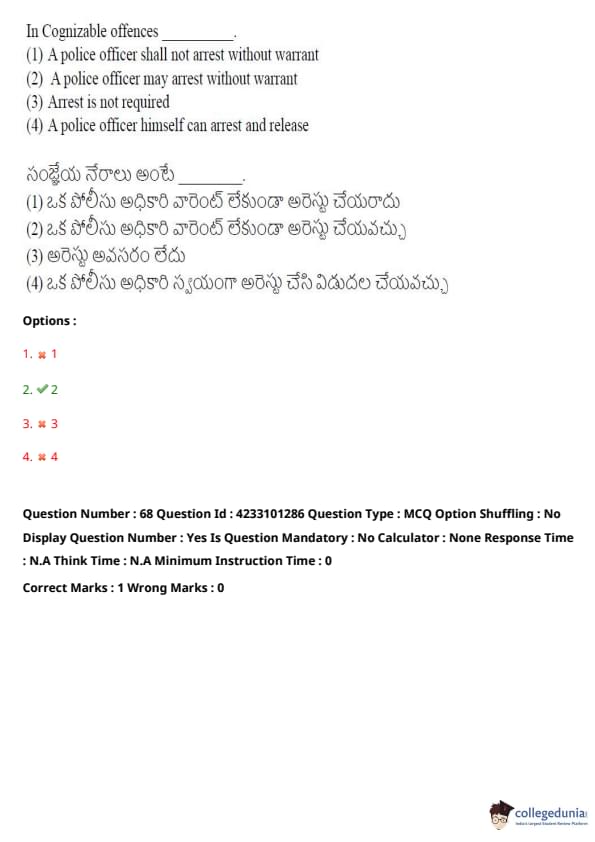
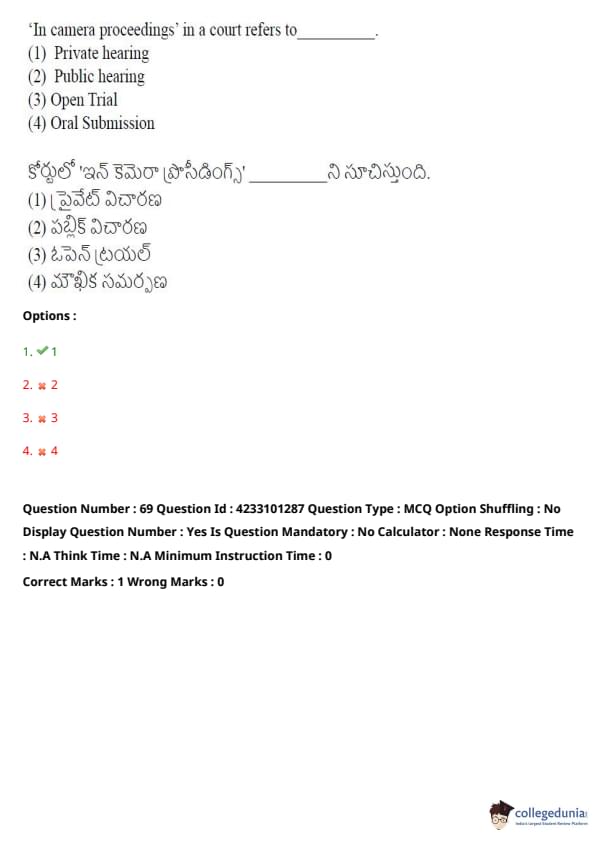
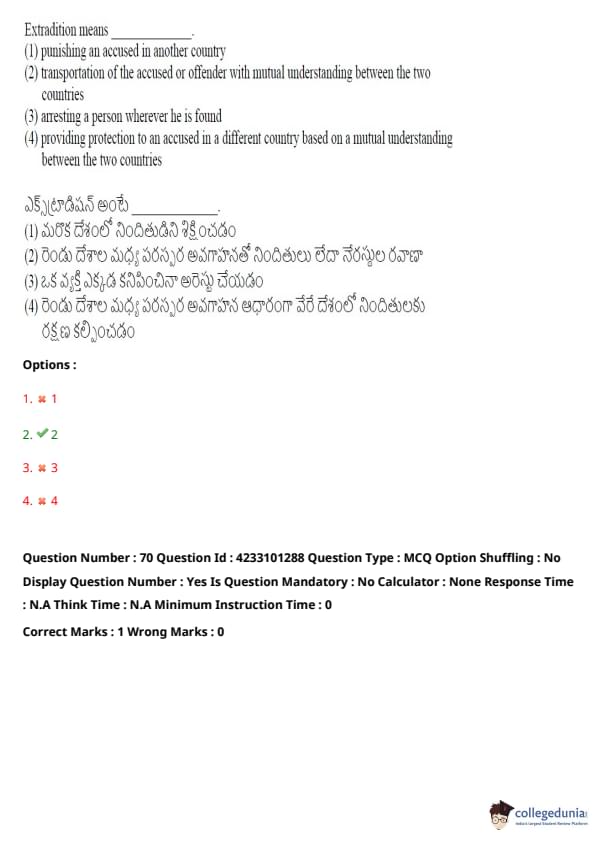
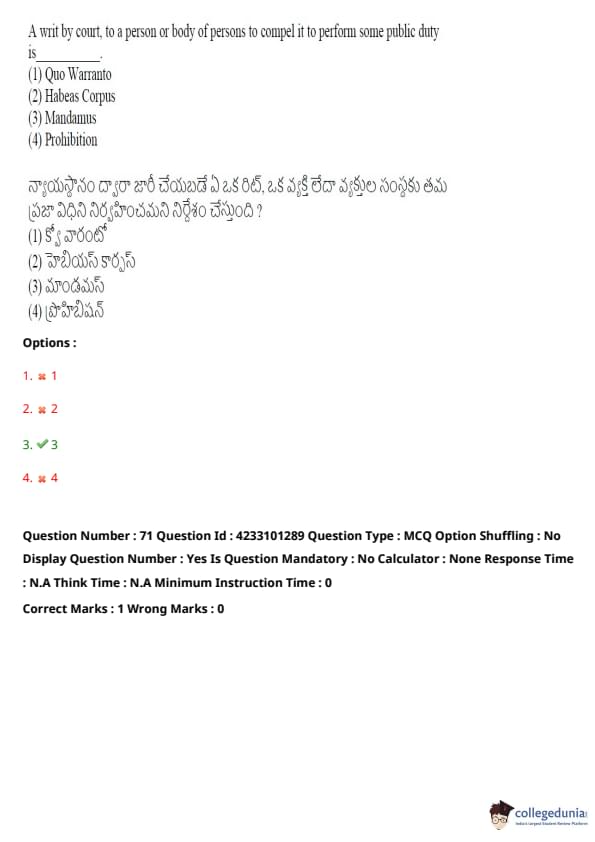
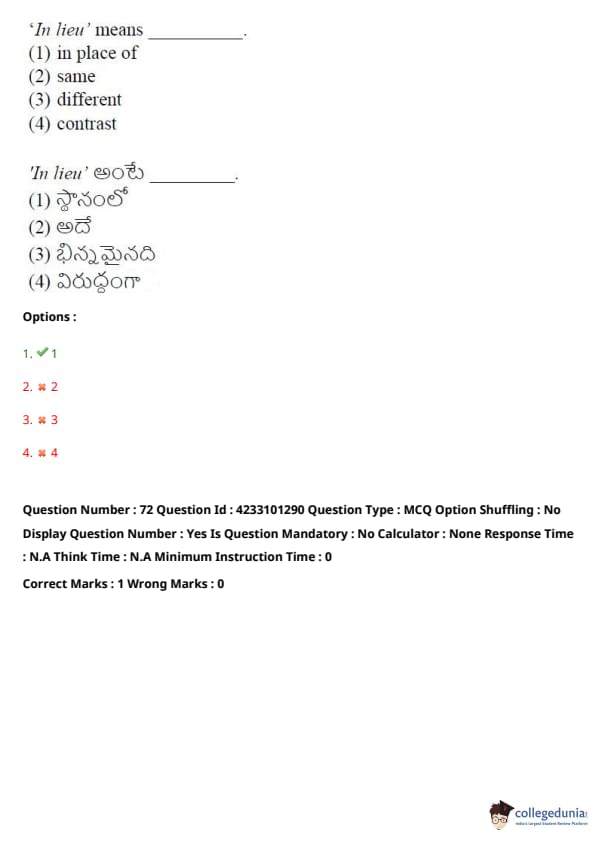
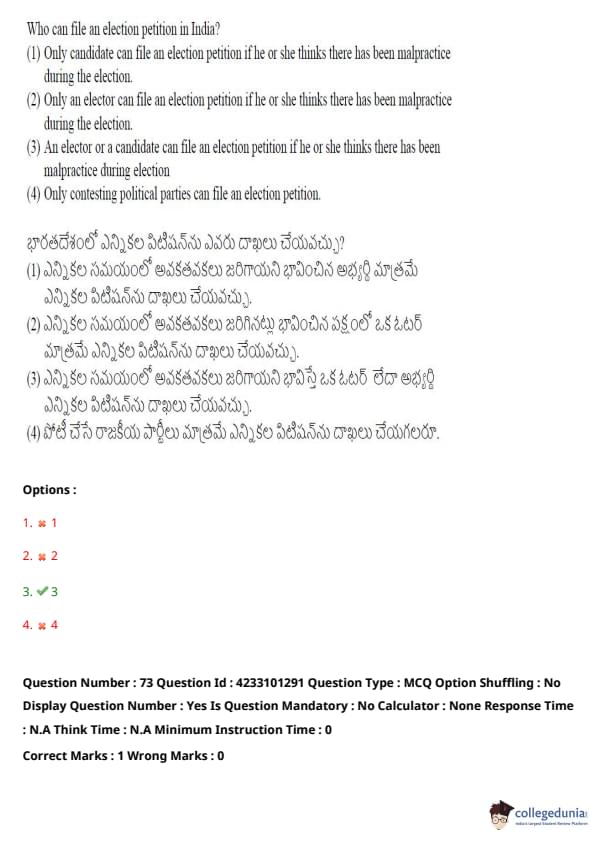
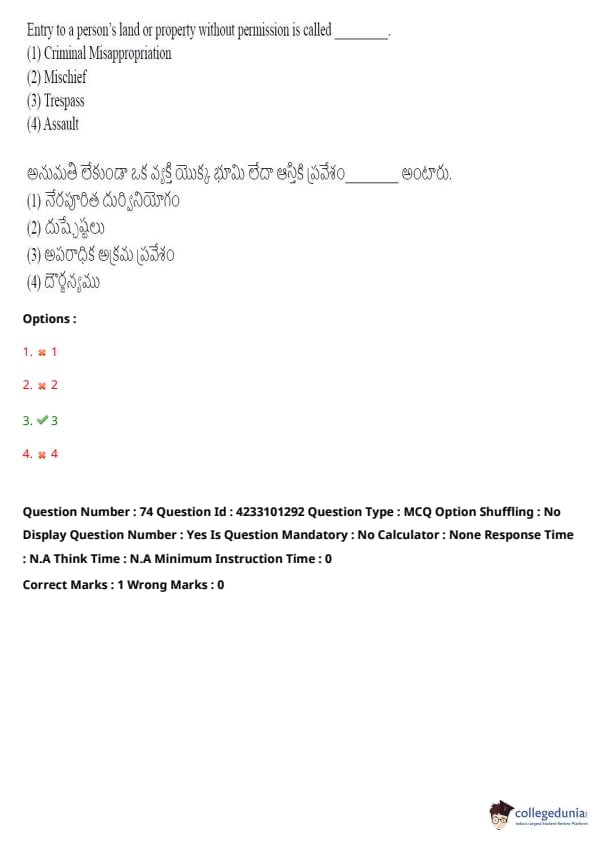
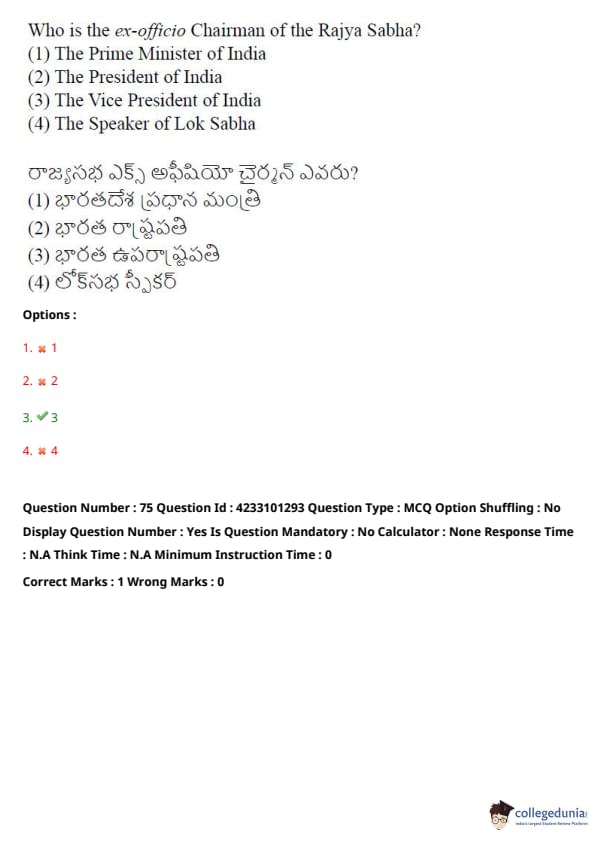
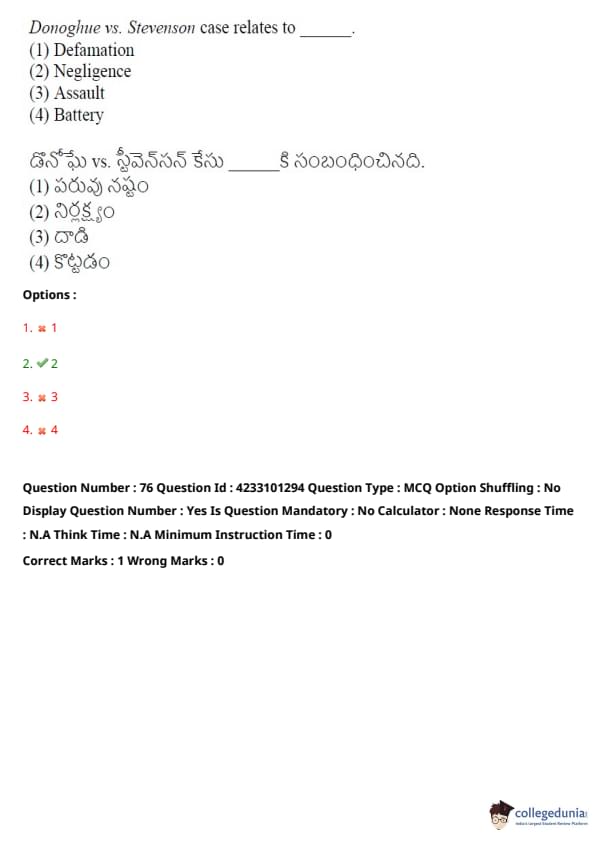
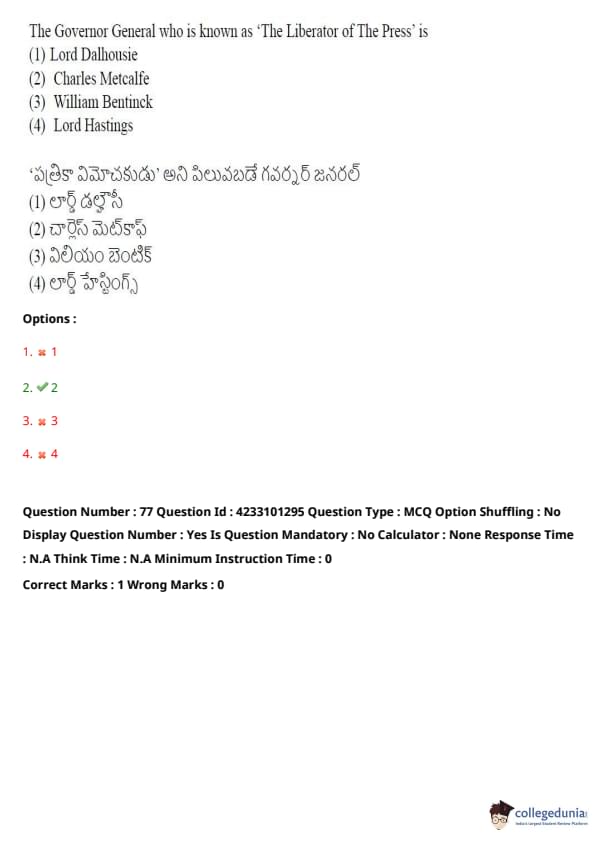
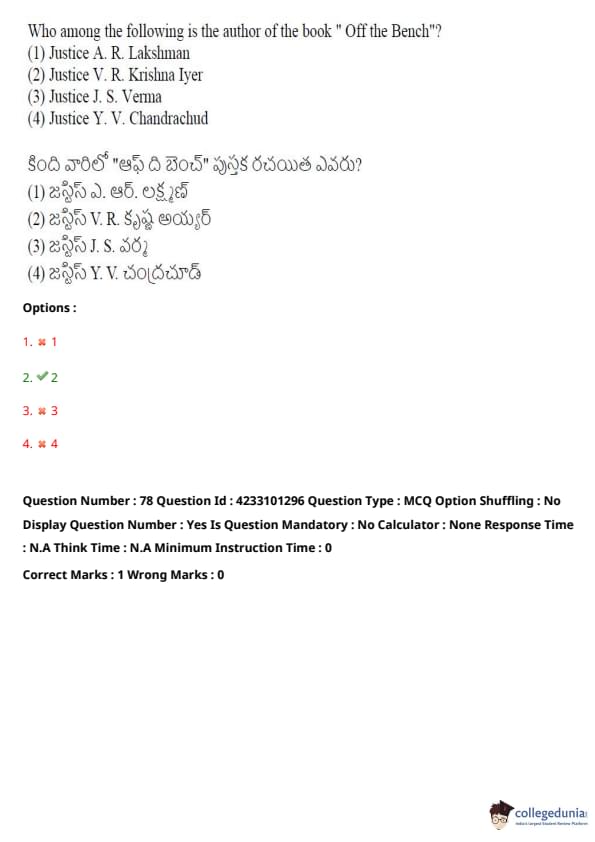
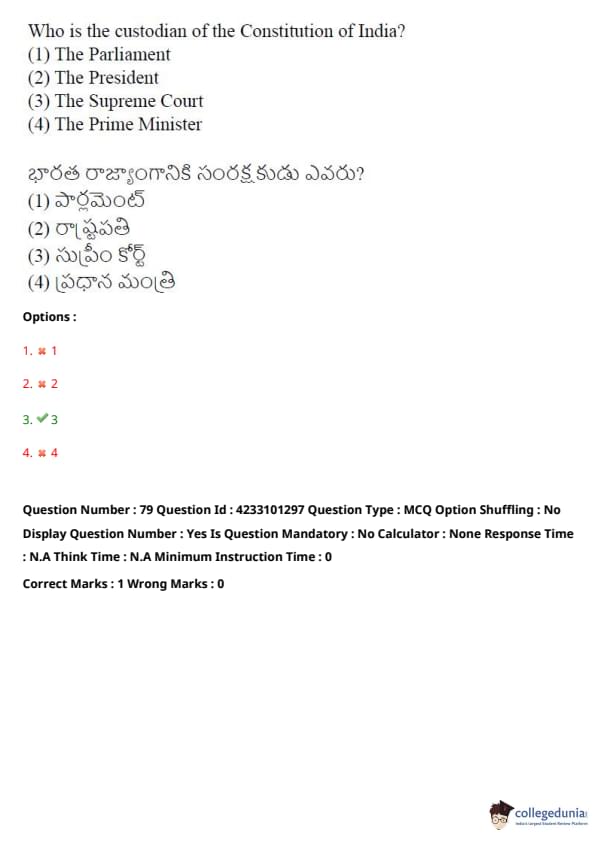
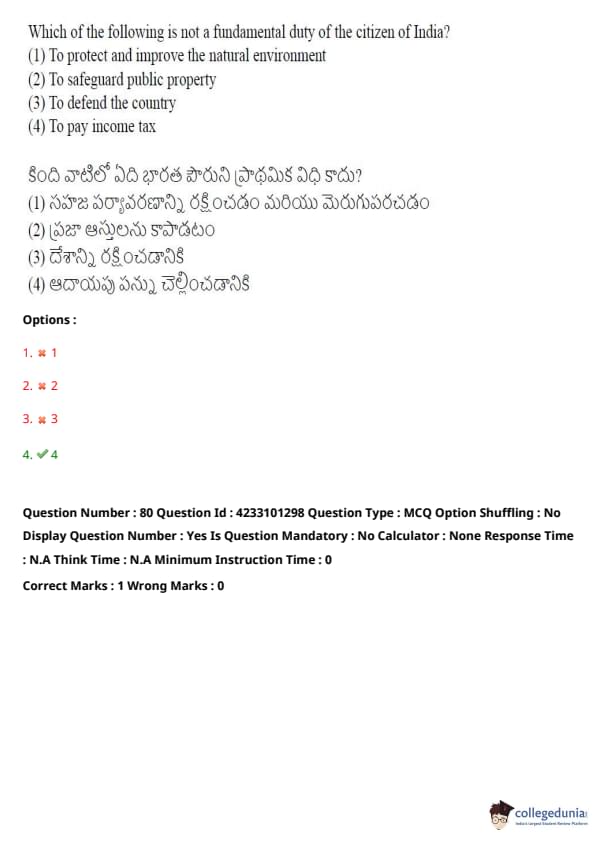
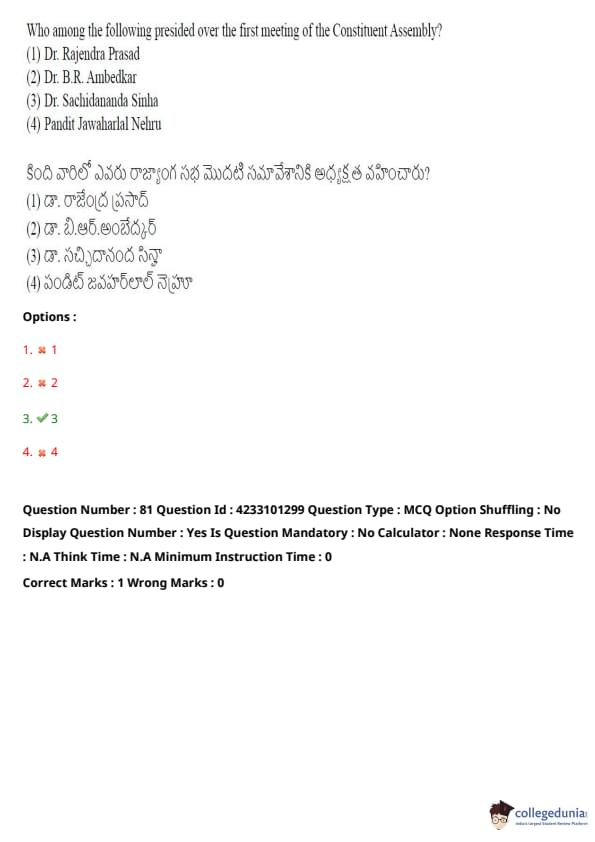
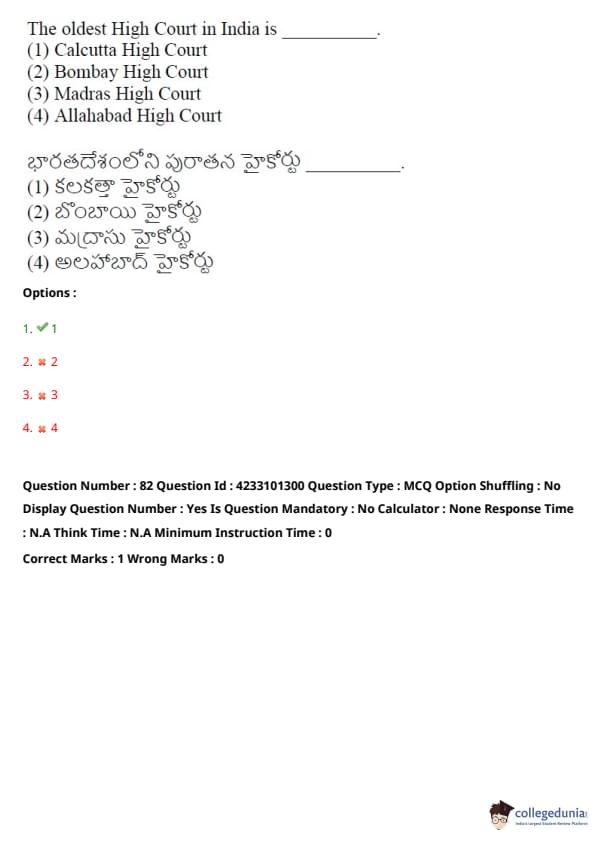
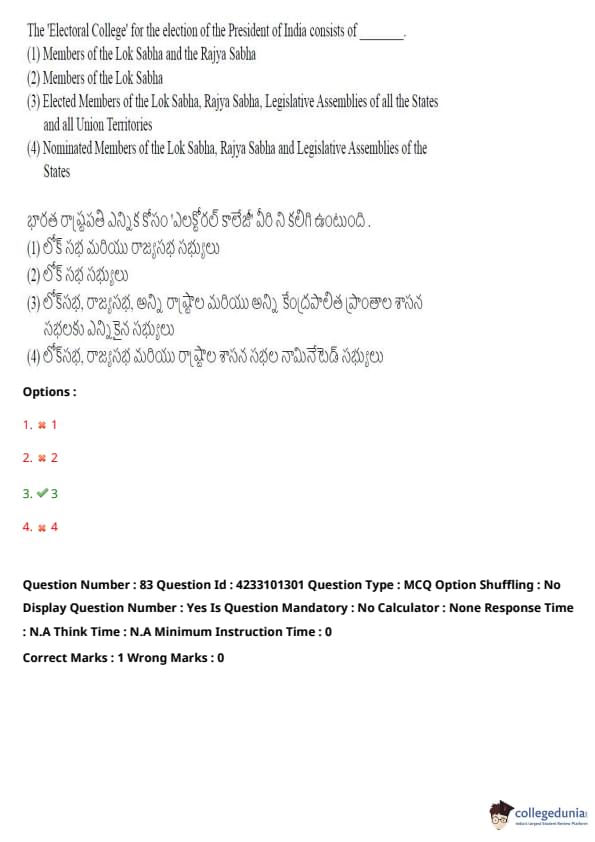
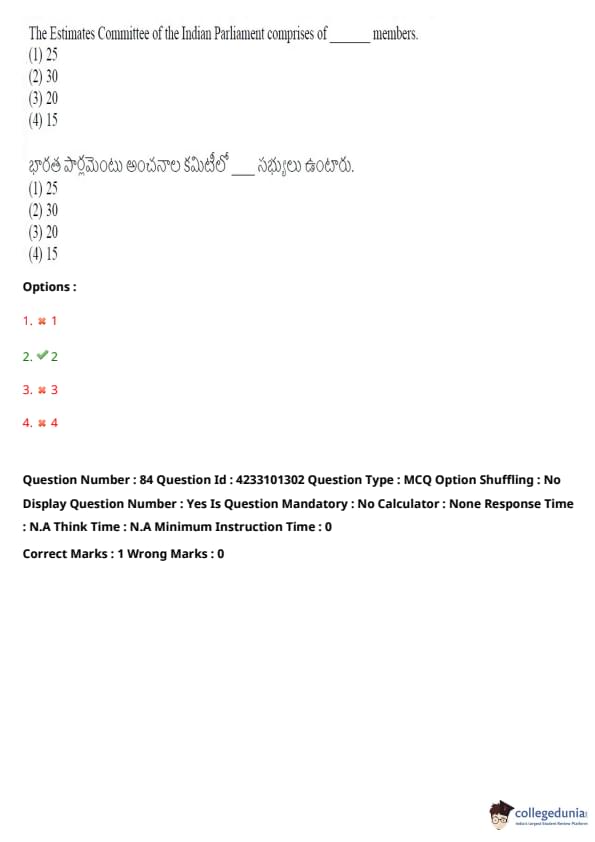
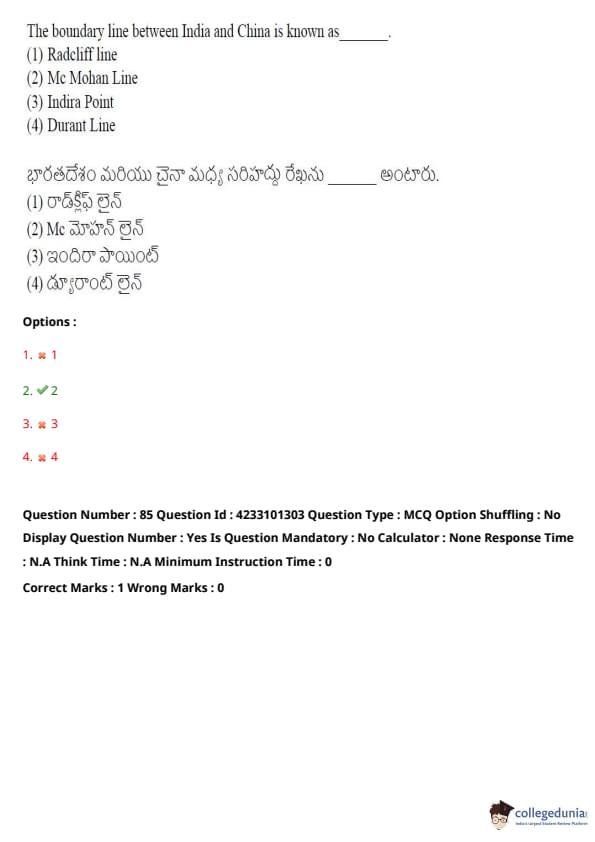
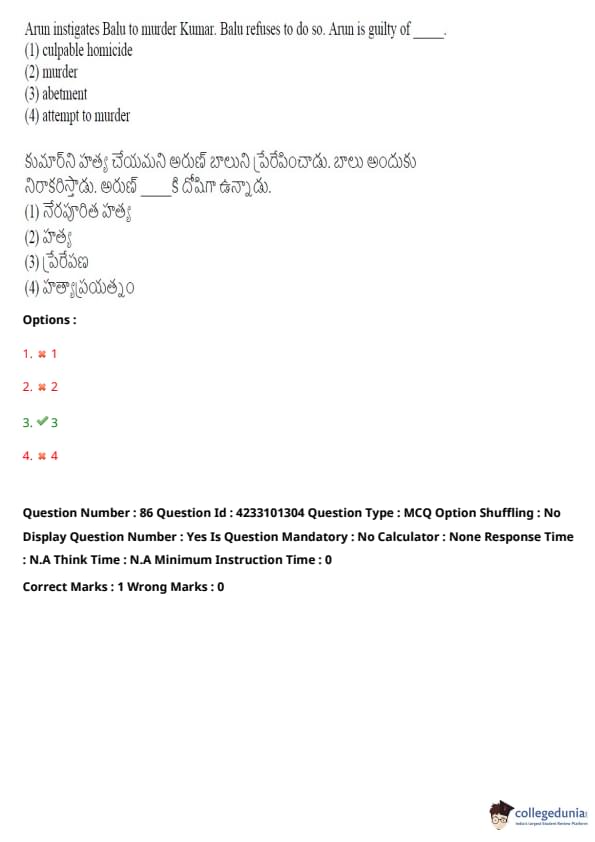
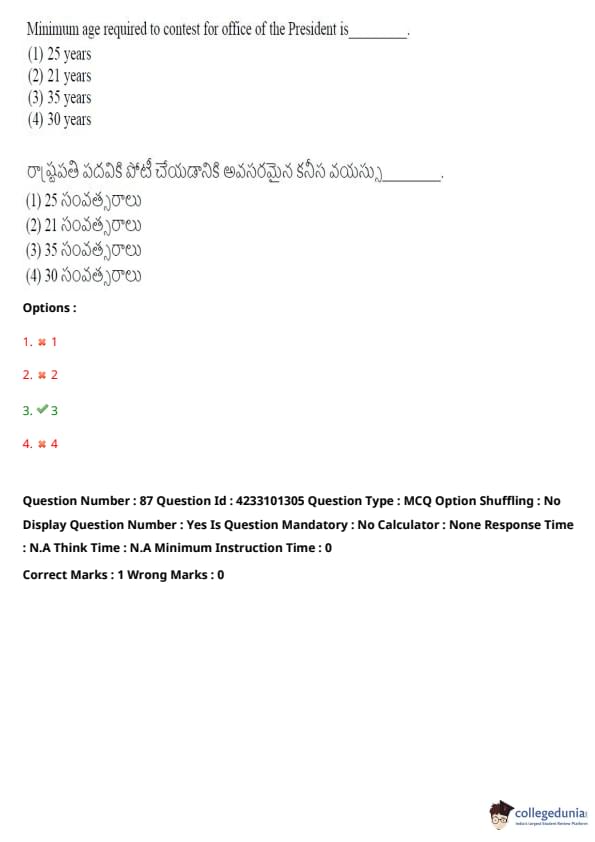
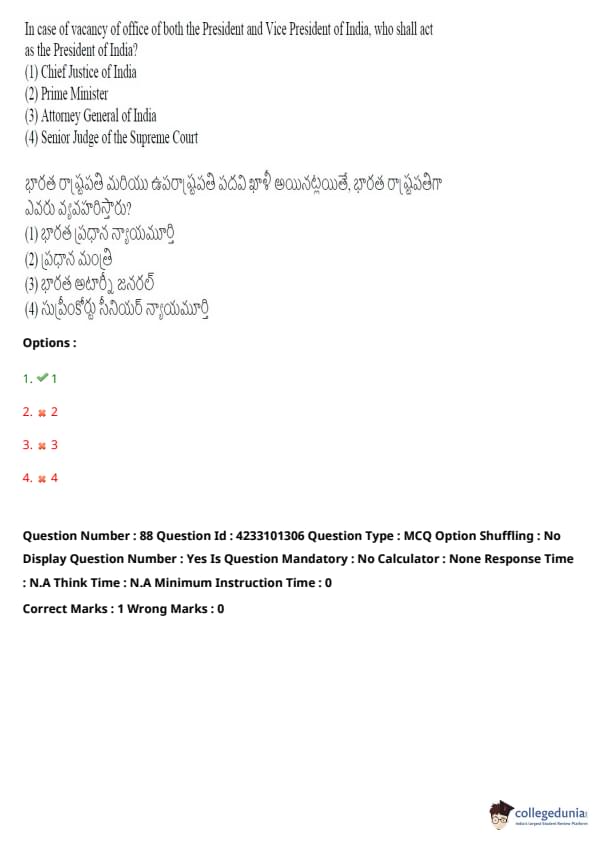
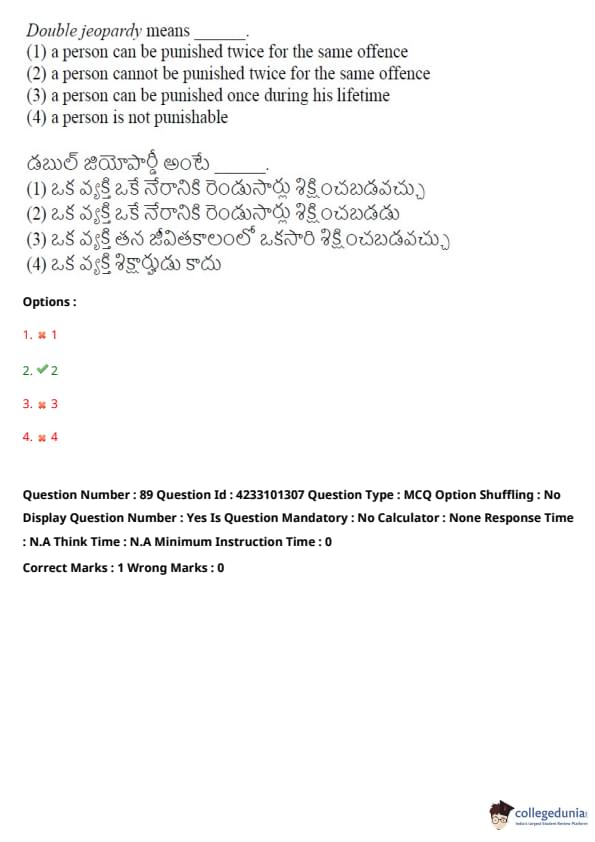

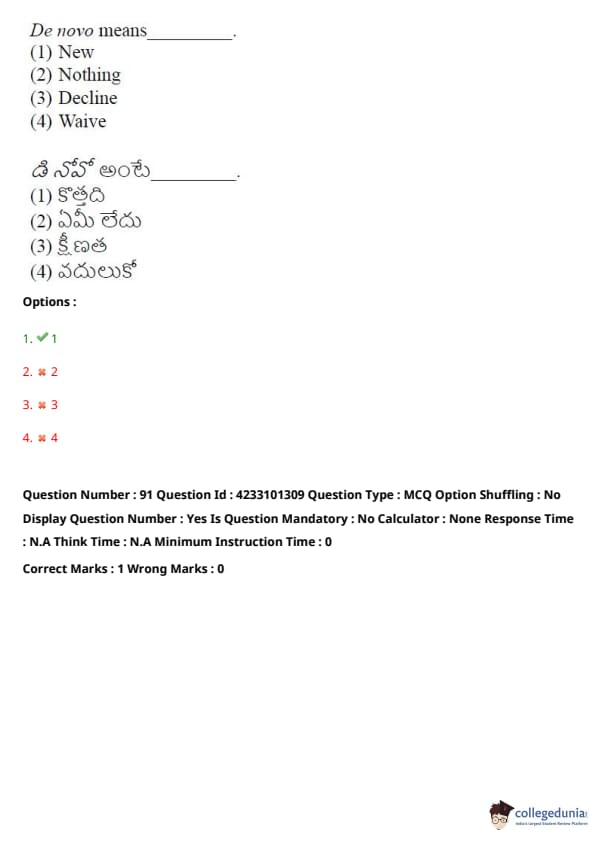
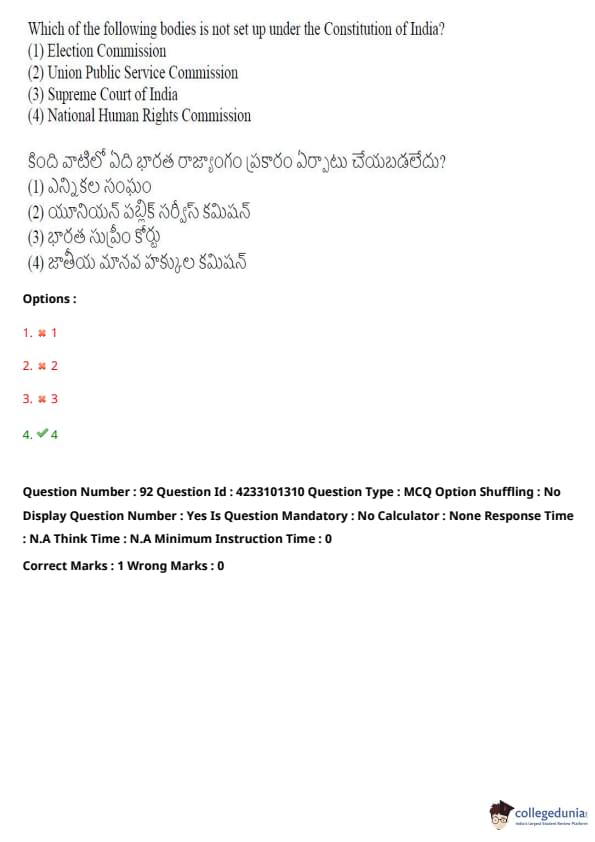
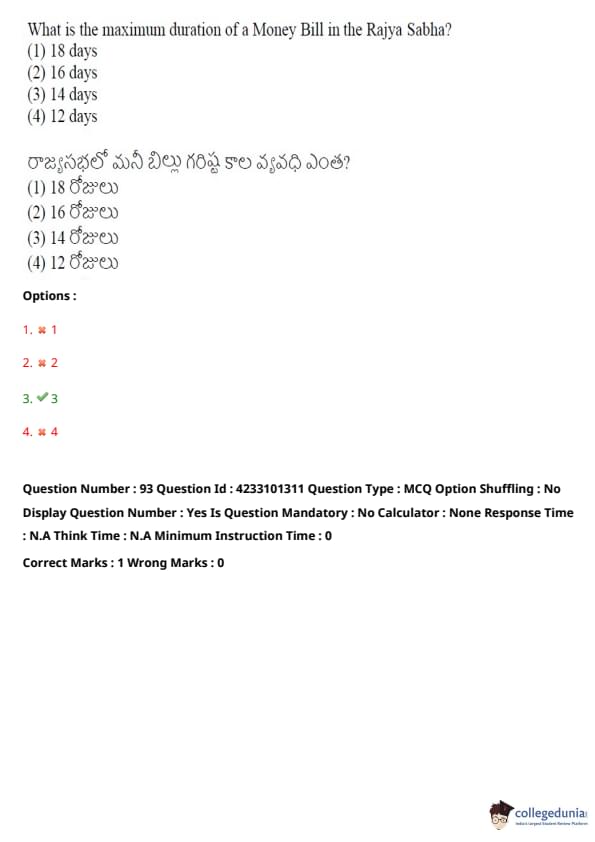
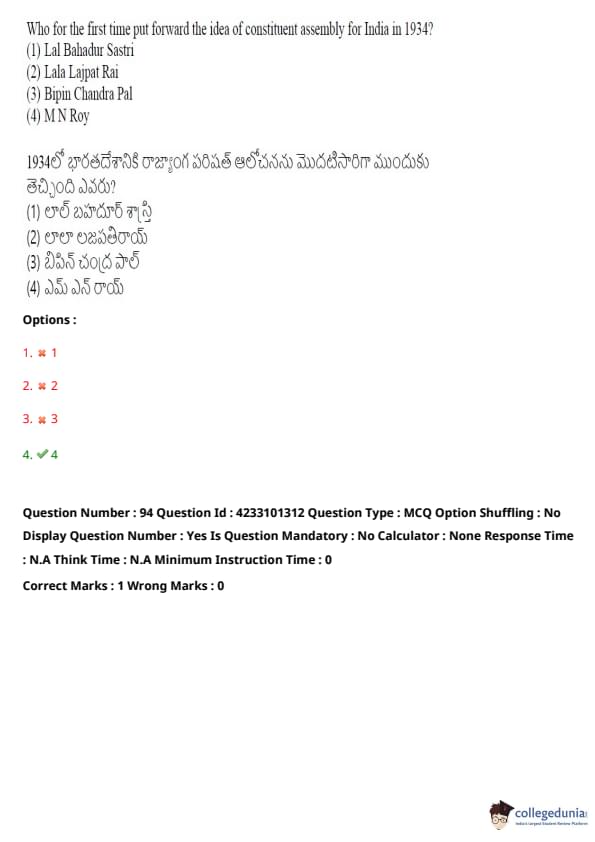
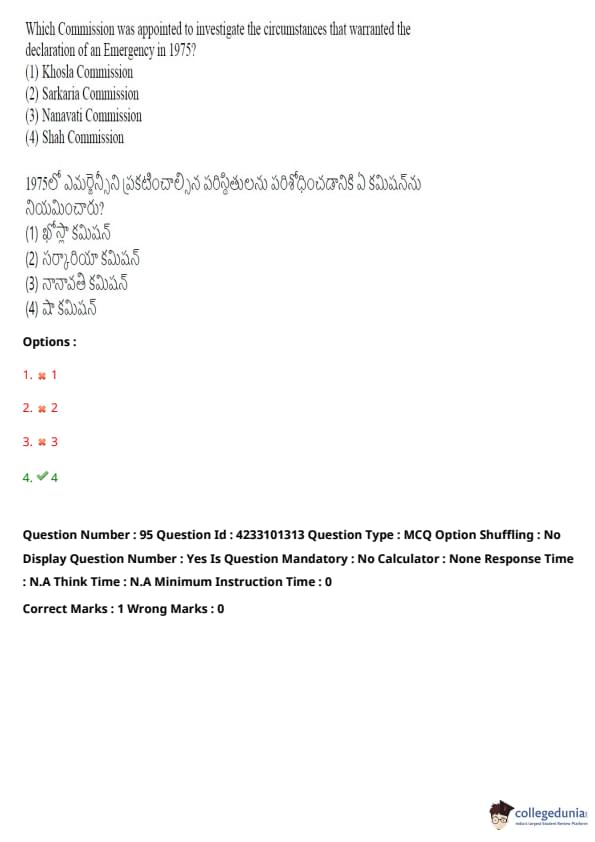
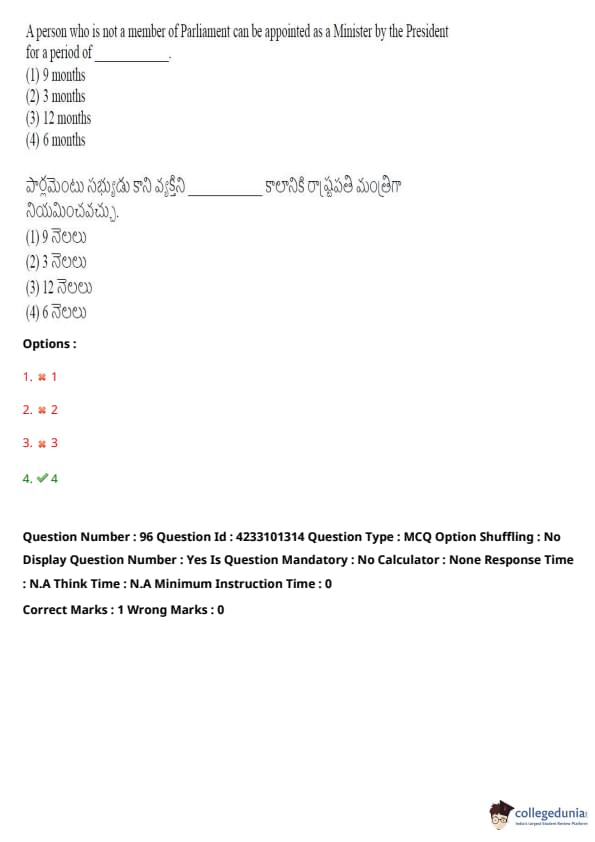
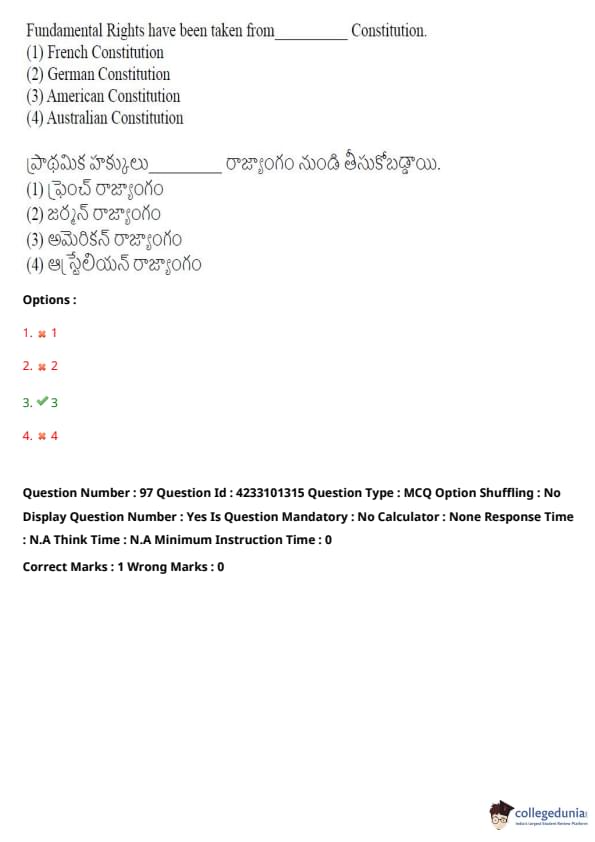
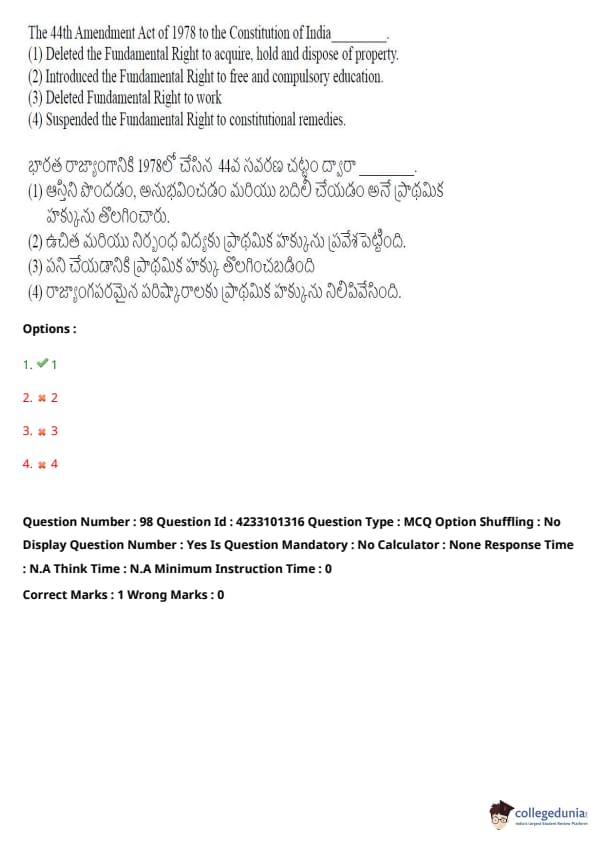
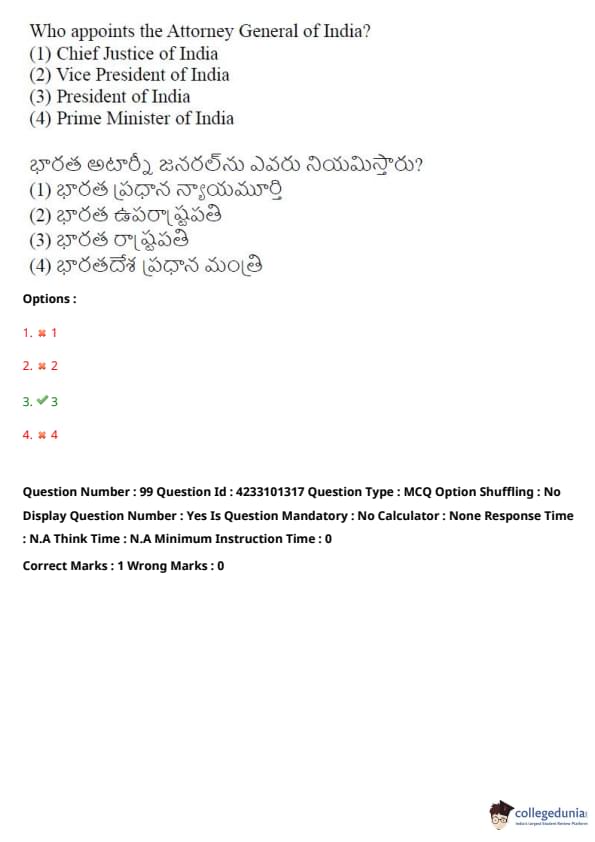
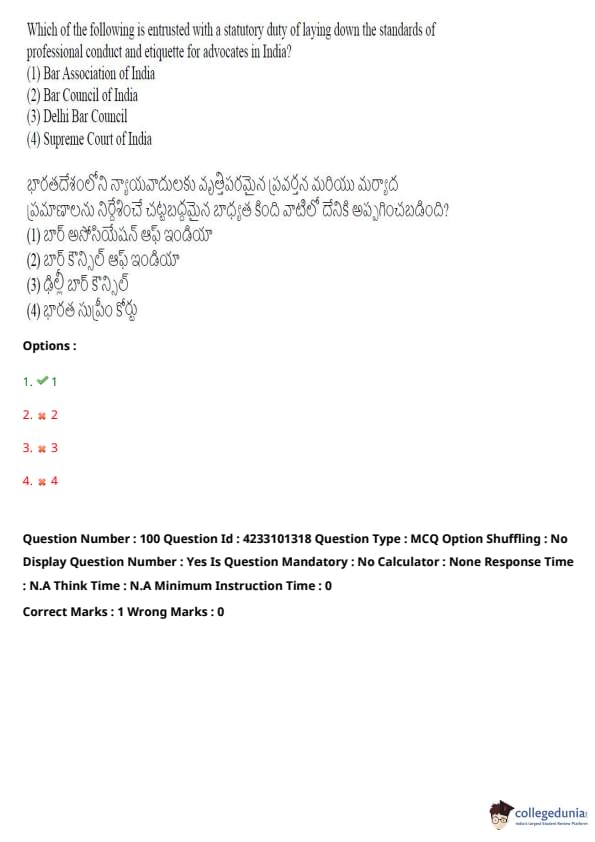
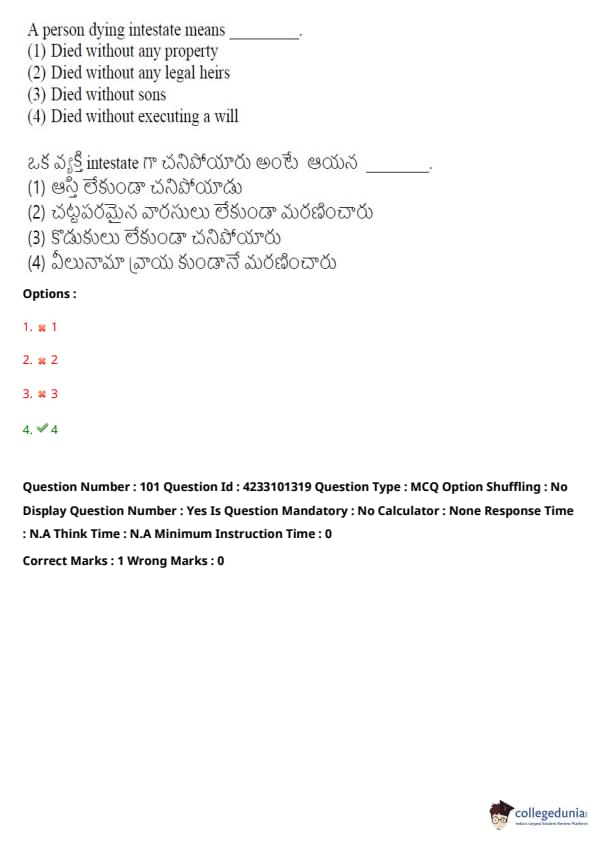
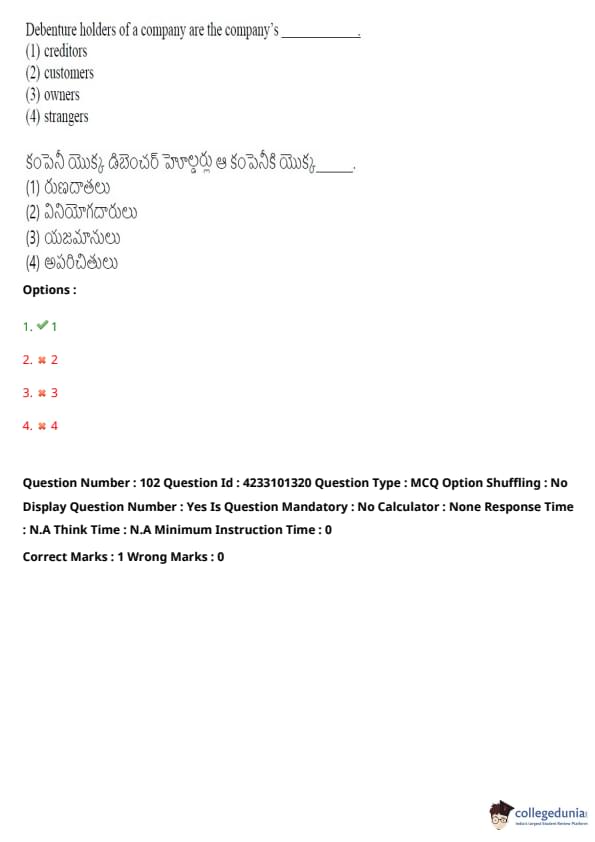
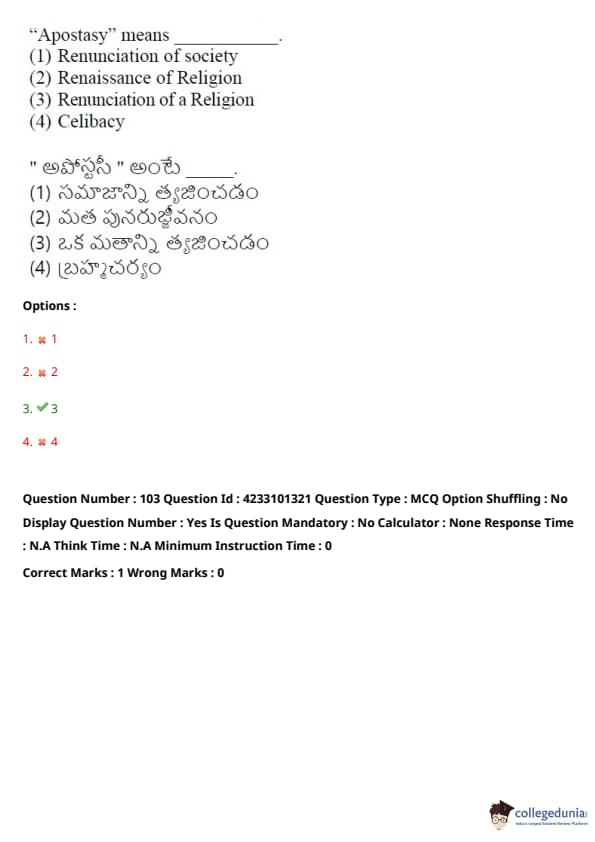
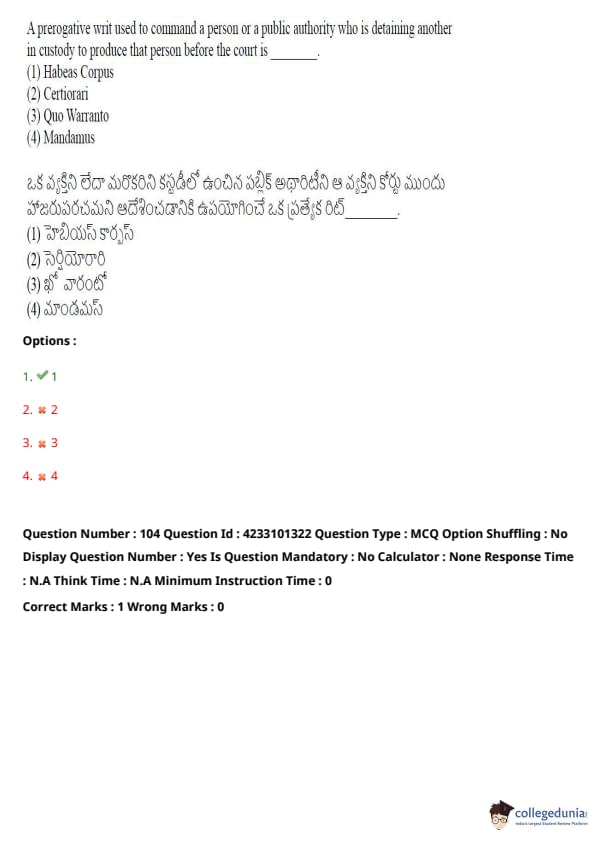
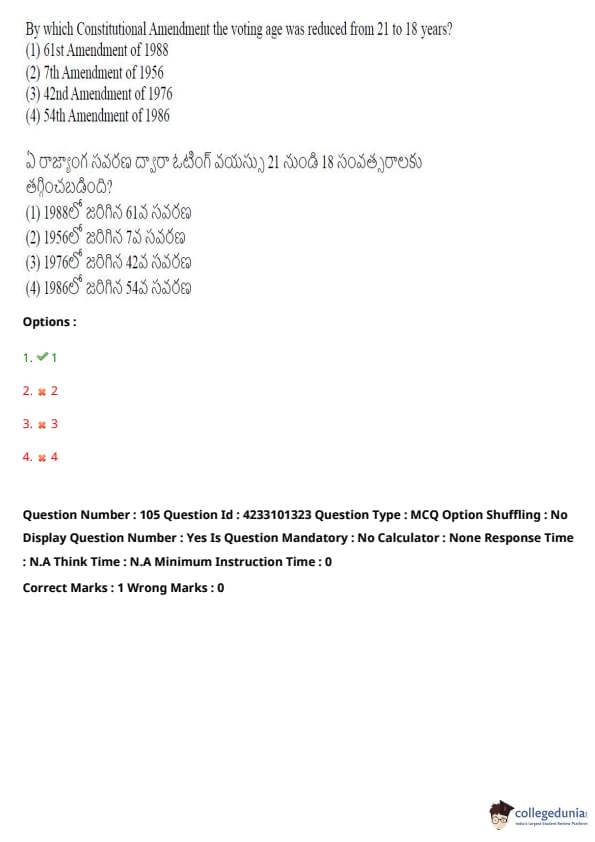
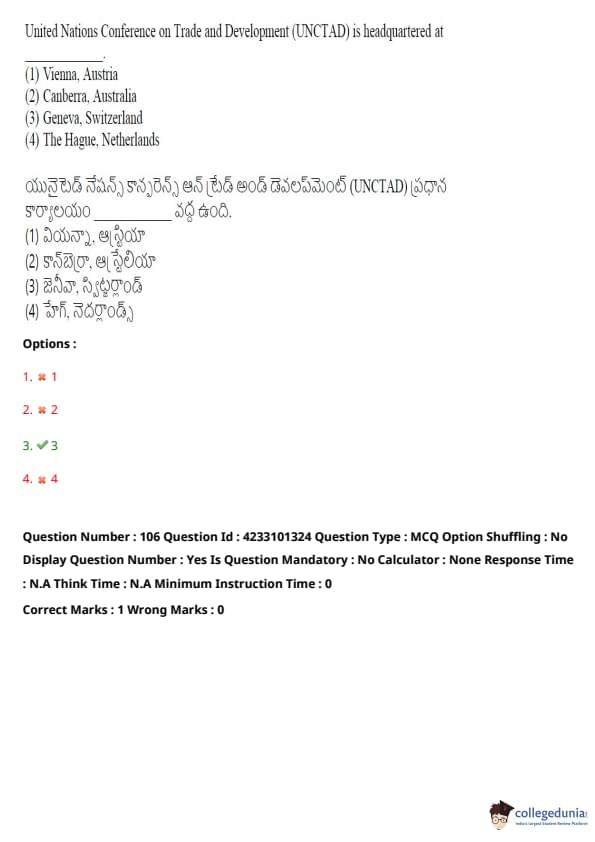
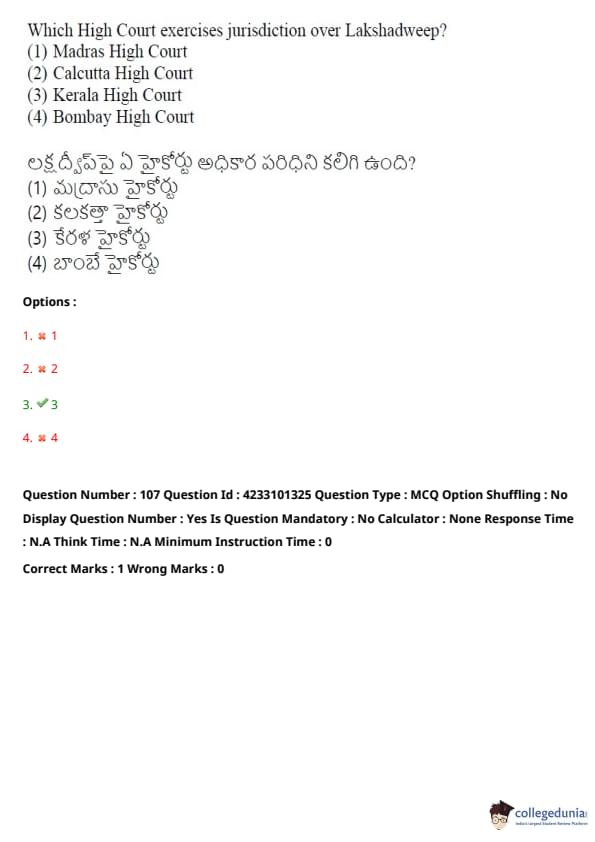
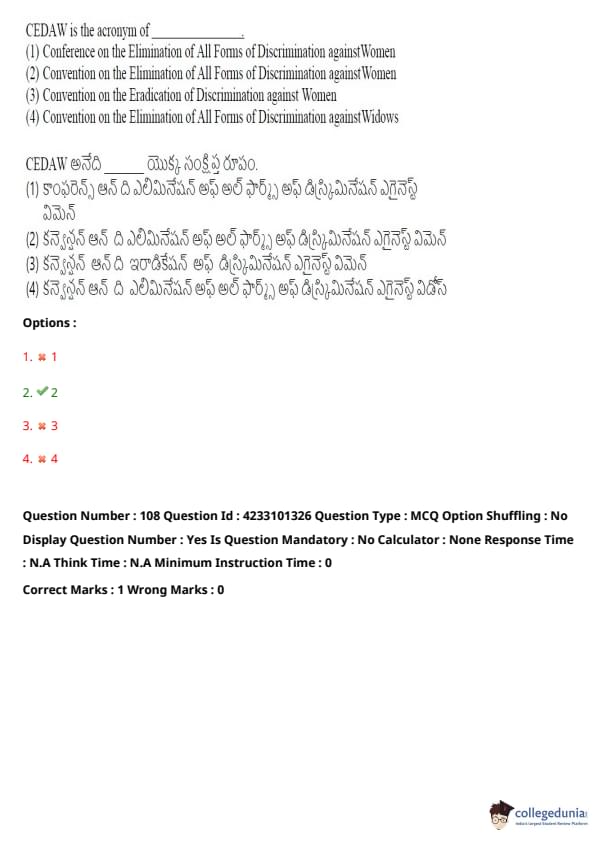
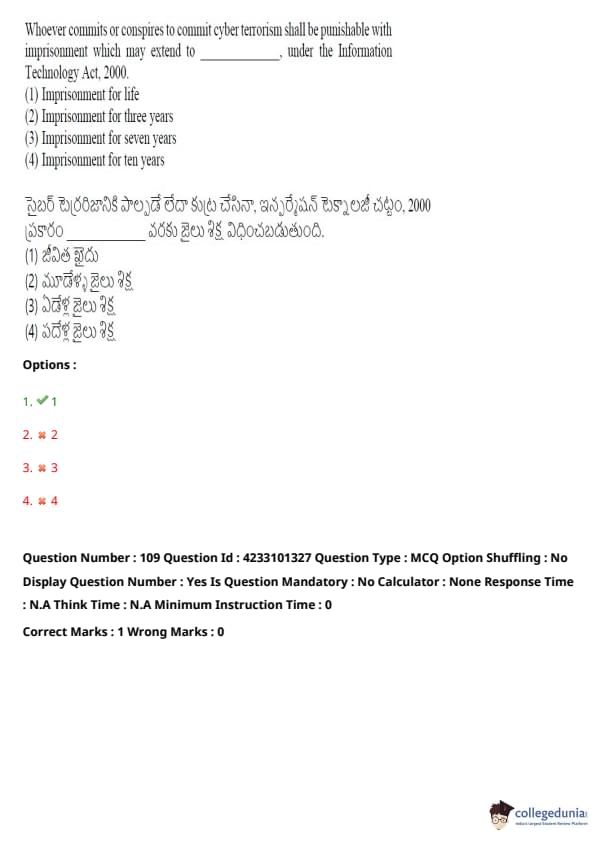
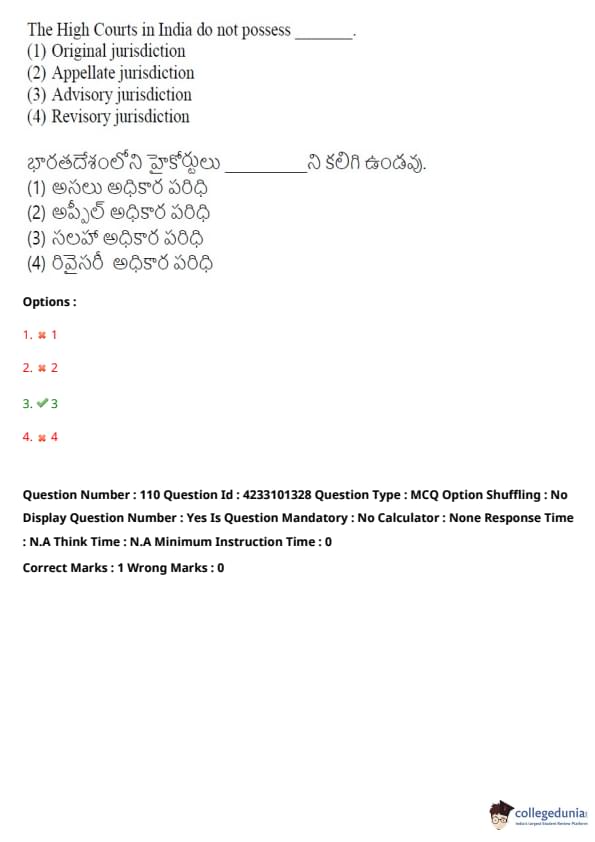
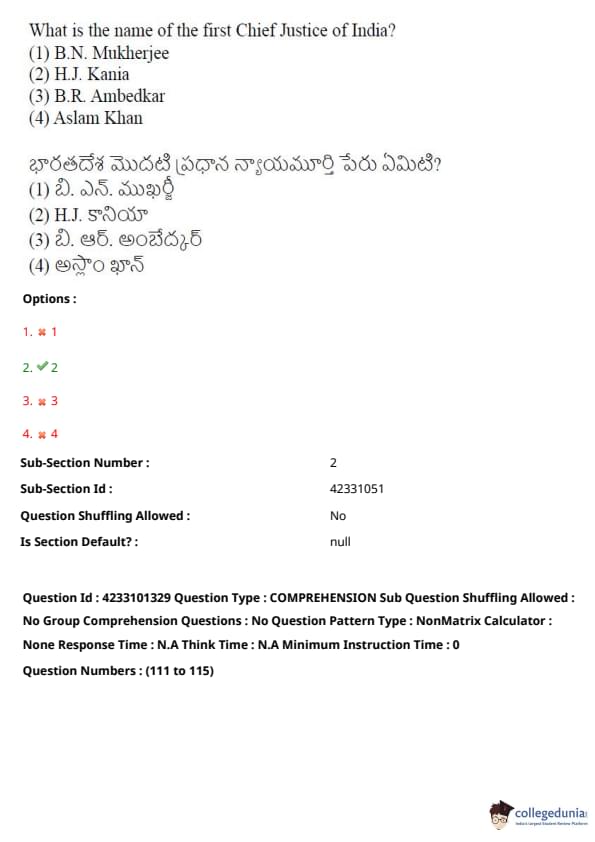
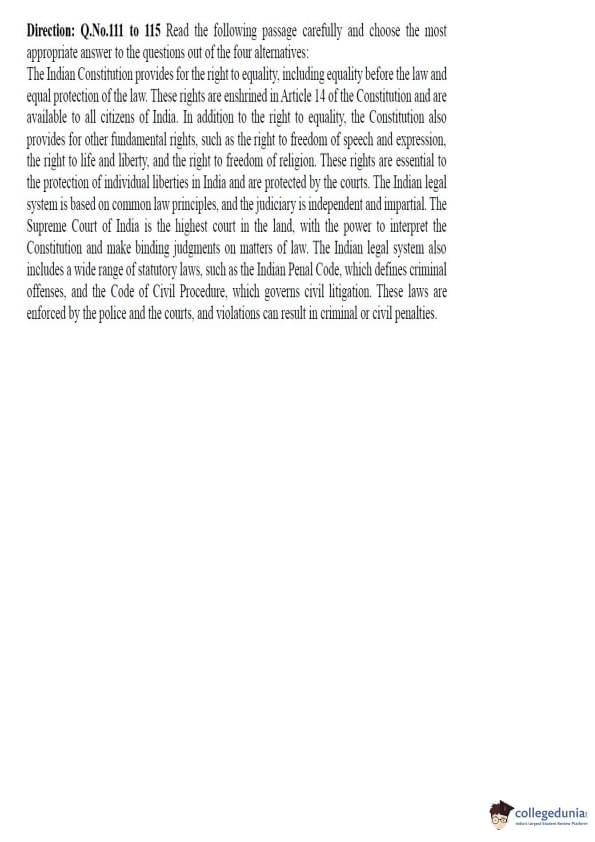
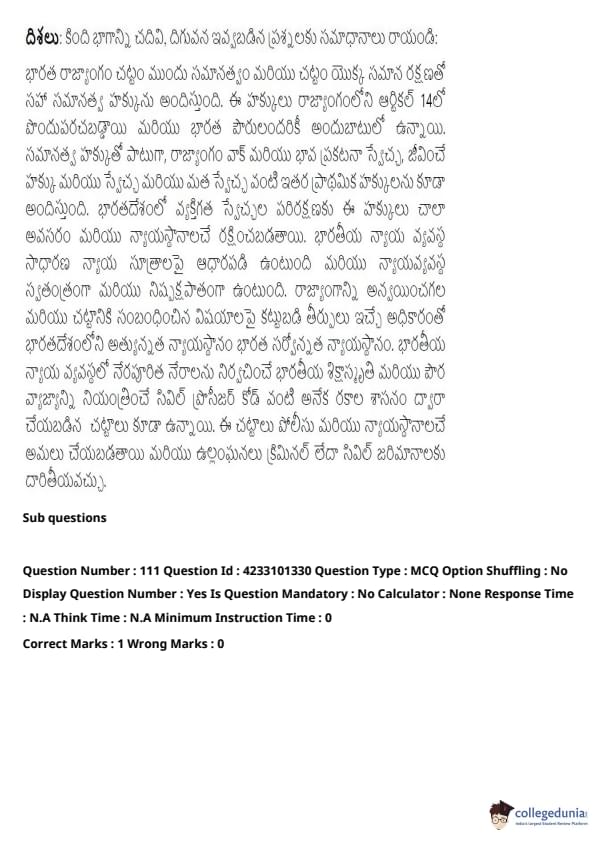
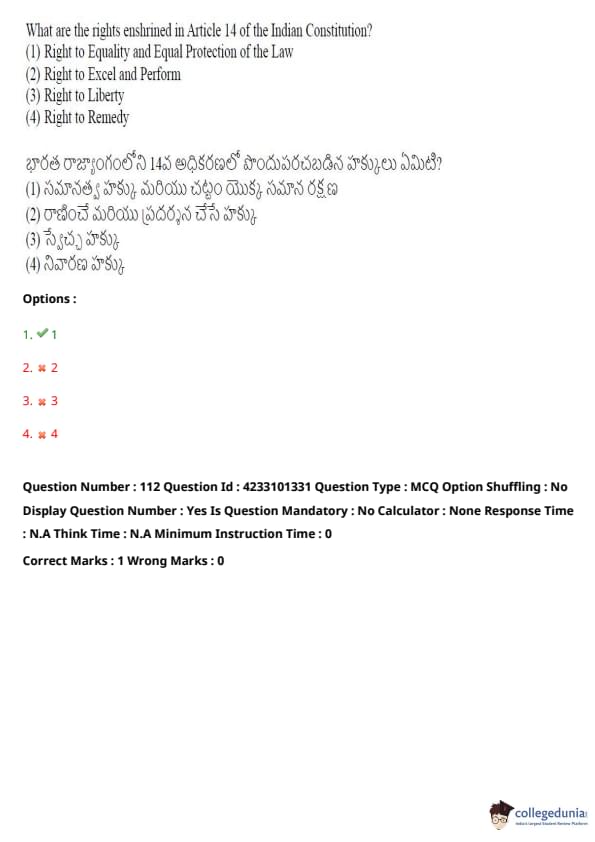
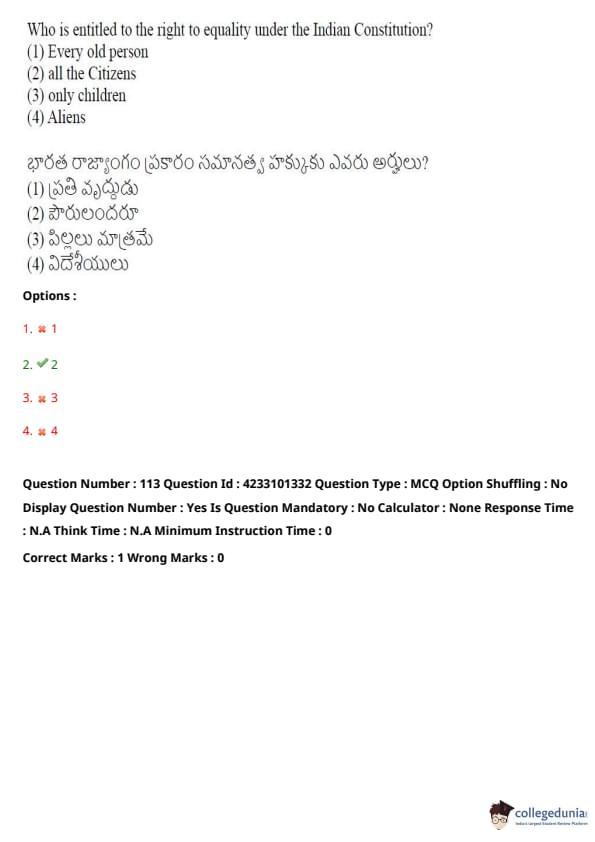
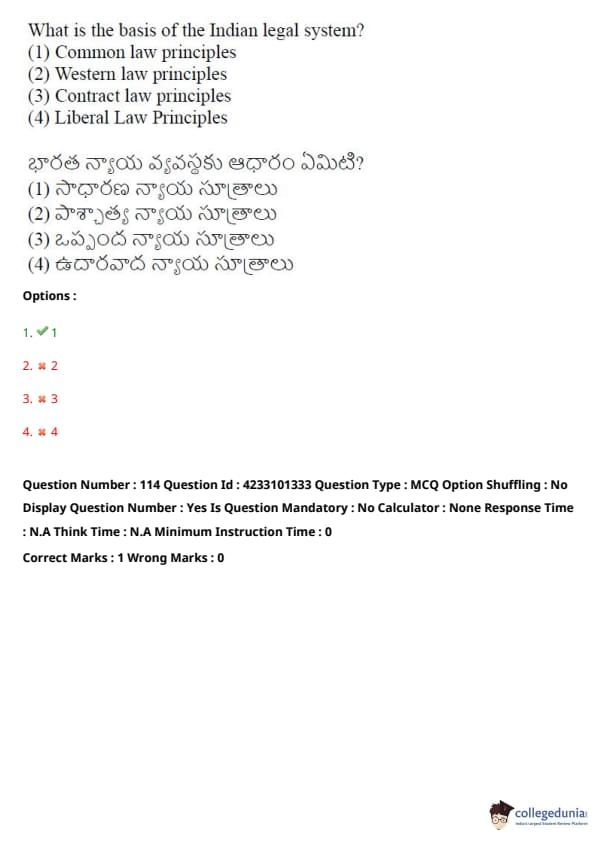
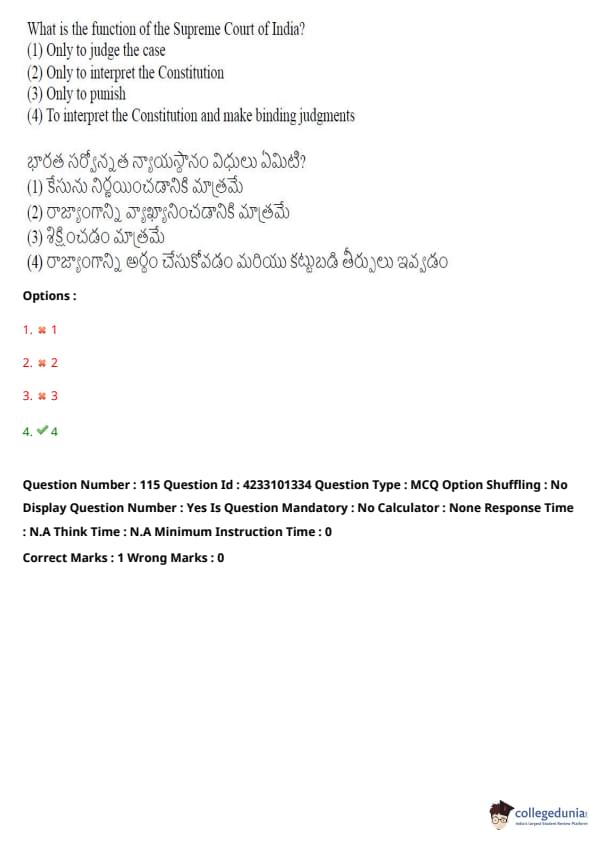
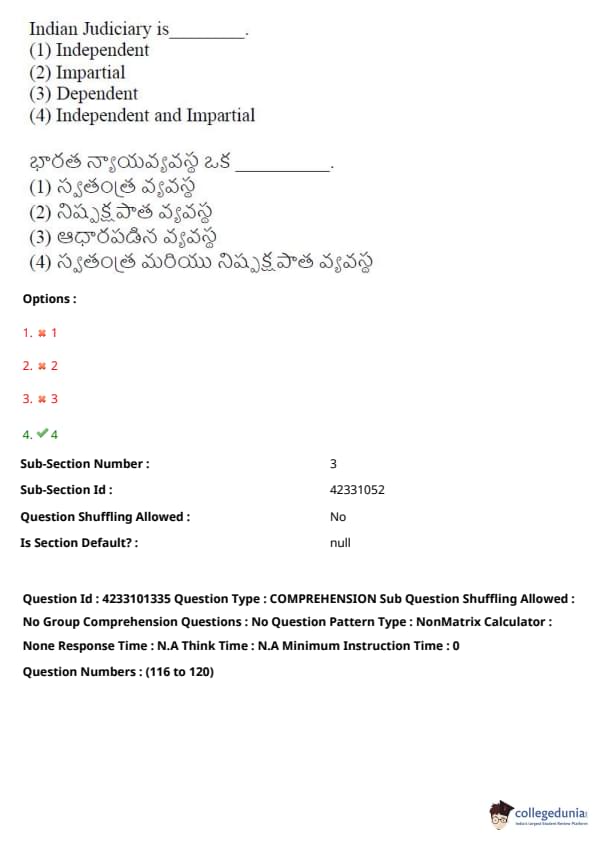
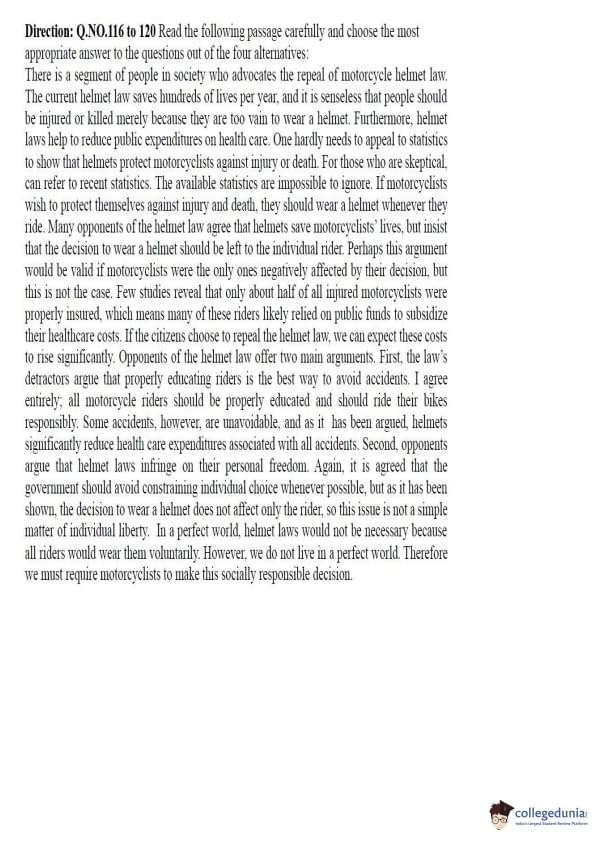
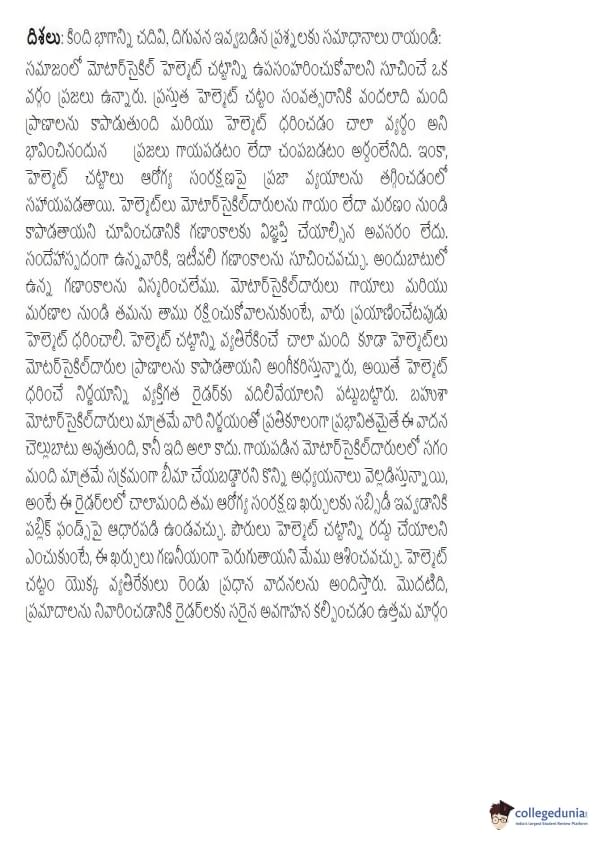
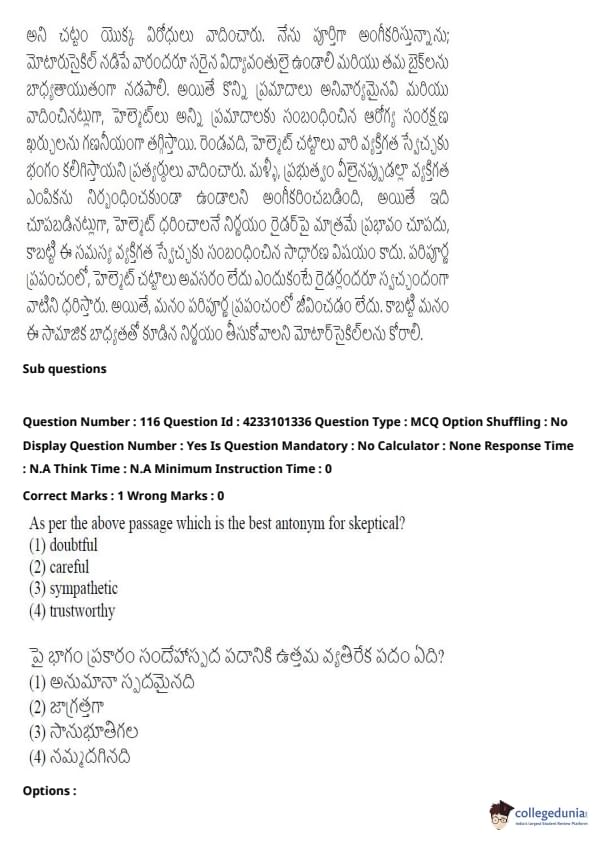
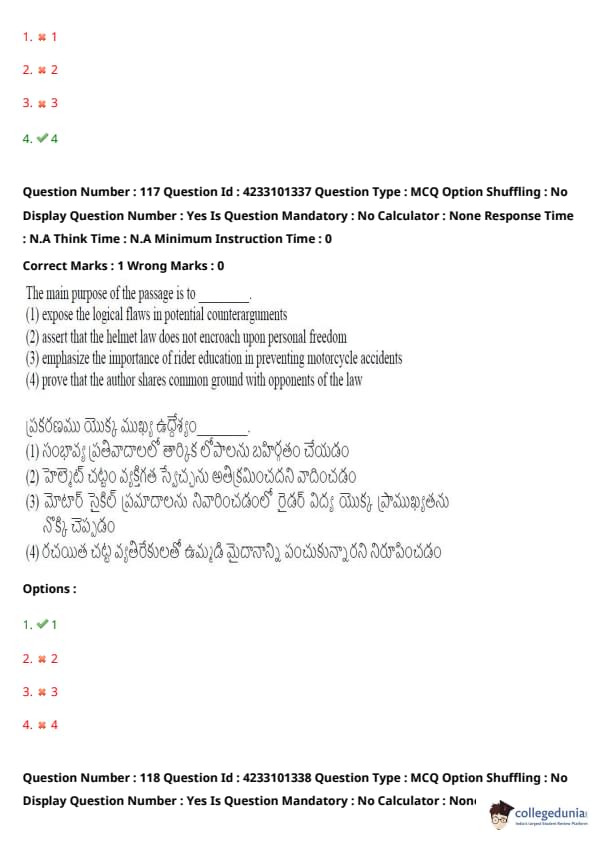
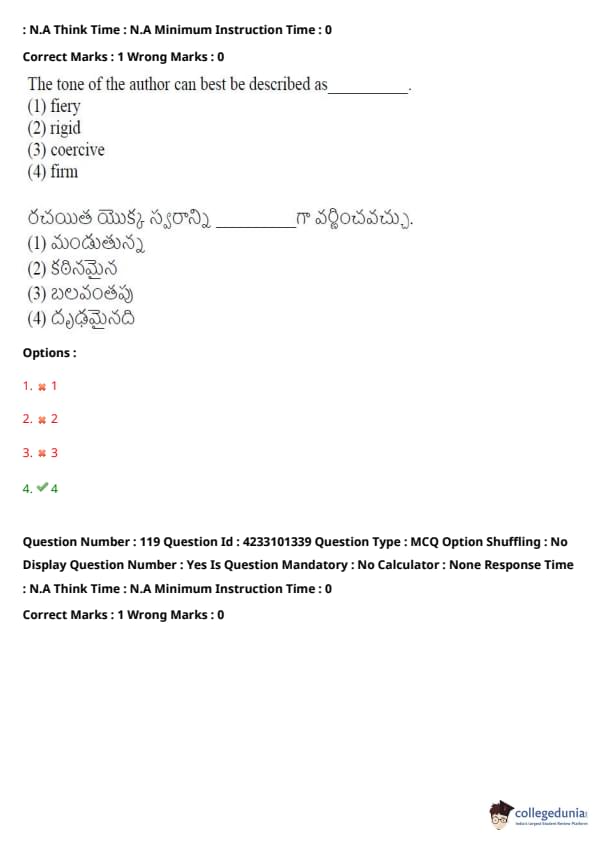
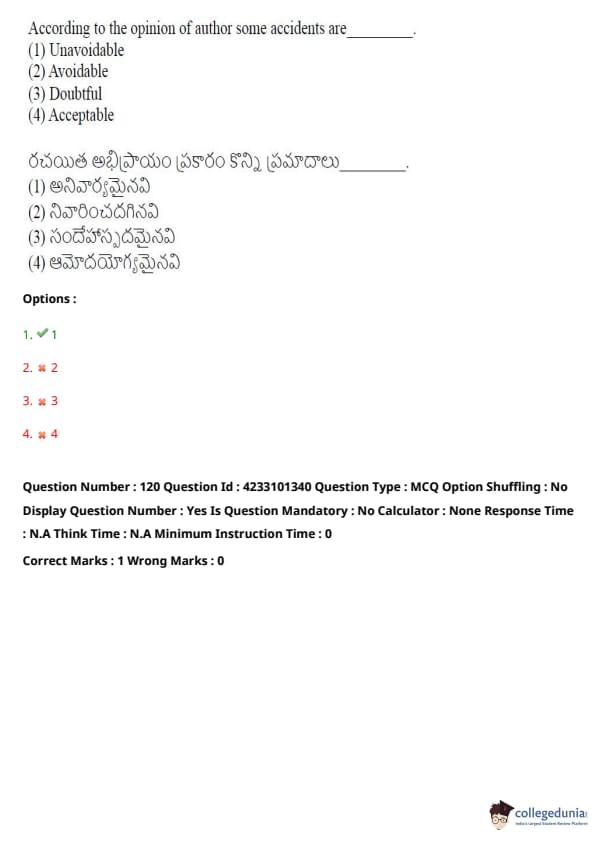
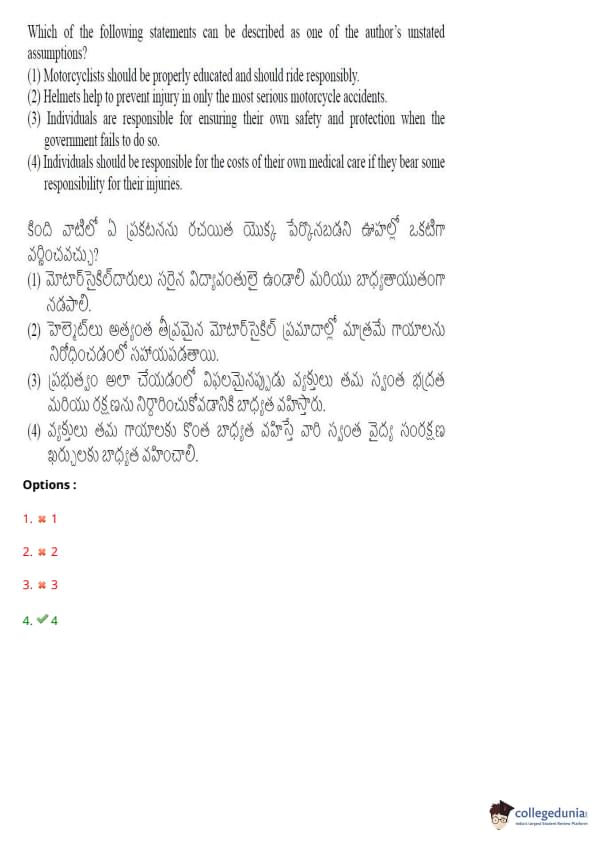



Comments